#and also by the fact that they would be American transfers into a British boarding school
Text

"On Sunday evening just after eight o’clock, a terrific windstorm blew in from the north, and without warning smashed into the city. Newspapers recorded that the gale reached speeds of 84 miles (135 kilometres) an hour. It was the worst hurricane Winnipeg had ever seen. The storm blew the roof off the children’s hospital. Telephone and trolley poles snapped like twigs, while trees toppled over and plate-glass windows caved in. Pedestrians who had been out seeking relief from the muggy heat scurried for cover. Electrical wires whipped and fizzled as lightning struck the main power station and cast the city into darkness. The wind tore the roof from a building downtown and dropped it on a passing automobile, injuring two people, then a deluge of rain followed the windstorm and continued all night. It was estimated that damage reached half a million dollars.
While Nature tried to get everyone’s attention, the work of the strikebreakers continued. Plans were in place to move against the leadership, but Robertson and Andrews worried about how the strikers would respond. On Saturday, the labour minister managed to convince the employers in the metal trades dispute to accept a modified form of collective bargaining, one that would make it look as if the employers were making concessions and, as importantly, one that would keep the railways running. On Monday evening, the General Strike Committee met to consider the employers’ offer. As Robertson and his co-conspirators expected, the offer was rejected, and a few hours later the authorities went into action.
Before dawn on the morning of June 17, police cars pulled up at targeted homes in Winnipeg’s North End. Officers rousted six strike leaders out of bed, arrested them, and drove them to a neighbourhood police station where they were processed before being transferred to Stony Mountain Penitentiary north of the city. Those arrested were A.A. Heaps and John Queen, both city aldermen; George Armstrong, a carpenter and indefatigable soap-box orator; Bob Russell, a member of the Central Strike Committee; William Ivens, the editor of the Western Labor News; and Roger Bray, a leader of the pro-strike veterans. As well as raiding their homes, police also visited the offices of several labour organizations looking for incriminating documents. Dick Johns was arrested the same day in Montreal, where he was visiting on union business. Two days later, William Pritchard, who had come from Vancouver to observe the strike, was tracked down on a train on his way to Calgary, taken into custody, and transported back to Stony Mountain. On June 23, police picked up J.S. Woodsworth as he stood talking on a street corner. Woodsworth, who had arrived from Vancouver midway through the strike, had taken over editorship of the Strike Bulletin following Ivens’ arrest. His co-editor, Fred Dixon, went into hiding but surrendered himself to police once the strike ended.
All the members of this group, who became known as the Winnipeg Ten, were of British origin. For the government, it didn’t look good that a conspiracy that was supposed to be led by foreign agitators was in fact nothing of the sort. In order to give the impression of alien involvement, police also arrested four “foreign” strike leaders. Sam Blumenberg, the outspoken socialist orator, had already been the target of anti-Red street disturbances back in January when he was assaulted. Michael Charitinoff, editor of Robotchny Narod, the Ukrainian newspaper, had been arrested the previous year for possession of seditious literature. Twenty-two-year-old Oscar Schoppelrie was an American citizen and an unemployed musician, and Moses Almazoff, another Russian socialist, was a bookkeeper and a student at the University of Manitoba who was arrested just four days after his final exams. The four “foreigners,” three of whom—Blumenberg, Almazoff, and Charitinoff—were Jews, were held at Stony Mountain without bail, then brought in front of an Immigration Board of Inquiry which considered their deportation. The case of Sam Blumenberg, the eldest of the four, aged thirty-three, was the first to be heard on July 14. An undercover military spy testified that at the Walker Theatre meeting the previous December, Blumenberg had spoken from the stage in defence of Bolshevism. Another witness who attended the later meeting at the Majestic Theatre told the inquiry that Blumenberg “was trying, with others, to organize a revolution to overthrow the government. It was clear from the testimony that the government’s intention was to broaden the inquiry beyond the events of the general strike in order to prove that Blumenberg and the others were involved in a wide conspiracy dating back many months. The board ruled that Blumenberg should be deported to Europe; instead he was allowed to leave for the US where he lived for the rest of his life. At Almazoff’s hearing in August, a RNWMP spy named Harry Daskalud broke cover to testify. He reported that at a May meeting of the Jewish Labor League, Almazoff had advocated violent revolution. Almazoff’s defense counsel, Marcus Hyman,was able to find two witnesses who contradicted Daskalud, testifying that at the meeting in question Almazoff had said just the opposite, that he opposed bloodshed. Hyman was also able to show that Daskalud, a native of Austria who had been in Canada for six years, did not understand English well enough to be a reliable witness to what Almazoff had or hadn’t said. In the end, the inquiry decided that the evidence produced by the government was not sufficient to warrant deportation. Almazoff was released, and he too left for the US. A similar board hearing for Michael Charitinoff ruled that he should be deported, but this decision was later overturned on appeal. Oscar Schoppelrie was deported back to the US because it was shown that he had crossed the border into Canada illegally.
Meanwhile, on the morning of June 21, four days after they were taken into custody, the six men who had been whisked away from their homes in the pre-dawn raids were released on bail. Initially, authorities had intended to spirit the strike leaders out of town and summarily deport them. The changes to the Immigration Act earlier in the month had prepared the way for such a strategy, but then Andrews changed his mind. He remained intent on breaking the strike without any backlash, and he was concerned that the leaders might be seen as martyrs to their cause. At a meeting of the pro-strike Soldiers’ Parliament in Victoria Park later on the day of the arrests, speakers cautioned the crowd not to overreact. Ernest Robinson of the WTLC warned that the arrests were an attempt by the government to incite protest so that martial law could be imposed. “Keep calm and let ideas triumph over force,” Robinson urged. But in spite of this mild reaction, Andrews preferred to avoid any unrest in the streets. To this end he decided to use the arrested leaders as a bargaining chip and obtained from the Strike Committee a promise that if they were released, the men would sit out the rest of the strike. “A.J. Andrews, K.C., representative of the federal department of justice, has changed the plan of action against the alleged revolutionary leaders,” reported the Telegram. “The men under the new course will be tried in the ordinary criminal courts … ”
Andrews took this decision on his own. The Citizens Committee of 1,000 was opposed, as was opinion in the press. But the government had put Andrews in charge of the operation. Accordingly, early on the morning ofJune 21, six strike leaders—Russell, Armstrong, Heaps, Bray, Ivens, and Queen—left Stony Mountain on bail."
- Daniel Francis, Seeing Reds: the Red Scare of 1918-1919, Canada’s First War on Terror. Arsenal Pulp Press, 2011. p. 154-156.
Image: Arrested strike leaders at the Vaughan Street Jail in Winnipeg, 1920. Back row from left to right: Roger E. Bray, George Armstrong, Alderman John Queen, R.B. Russell, R.J. Johns and Bill Pritchard. Front row from left to right: Reverend William Ivens and Alderman A.A. Heaps. Photo: Archives of Manitoba, Winnipeg Strike 35 (N12322)
#winnipeg#winnipeg general strike#strike#general strike#crackdown#manitoba penitentiary#strike leaders#working class struggle#working class history#seeing reds#reading 2023
0 notes
Note
burner house opinions please agree or disagree: mike is the hufflepuffest hufflepuff to ever huff a puff. texas is so gryffindor he poops baby lions. julie is a slytherin and hates it but she is better at it then anyone else. chuck and dutch are very different ravenclaws and have very different answers to the common room riddles. HOUSE SOLIDARITY TEAM.
HHHHHH OKAY might as well answer this one right after the other one. This one is rough because I can usually find a reason any given character would be in at least three of the four houses???? Uh....but let’s see, lemme think about it.
......Well I don’t want to repeat myself from my previous post, but Texas is pretty easy. He would INSIST on being Gryffindor. He would throw the biggest shitfit if he WASN’T a Gryffindor. He’d inevitably end up in Gryffindor. As for the others...
Mike could be Hufflepuff for sure, but he’d also make a pretty damn solid Gryffindor. Boldness, courage, charging in without thinking to help people, he does definitely tick the boxes. I’d actually lean slightly more toward Gryffindor? He’s got the loyal, kind, dedicated part down, but I mean...”daring, nerve and chivalry” is pretty solidly Mike too. His defining trait is thoughtless bravery and a reckless desire to do good, and that reads to me as a Gryffindor.
Julie would make a very solid Slytherin, I gotta agree with you on that one. Determined, ambitious, cautious but also daring when it counts...and a tendency to make friends and do whatever the hell she needs to to keep herself and her friends on top. *bangs gavel* SOLD.
Alternate left field theory though: Julie “this isn’t fair, i need to fix it” Kane, Julie “I’d do the right thing even if it means hurting myself and working against my father” Kane, goes to hogwarts and gets sorted into fukkin Hufflepuff????!?! Spends the entire story lying to her dad and saying she got into Slytherin. The strangest Hufflepuff/Slytherin personality combo.
Chuck.....hhhhh, okay, he’s the weird one for me. Ravenclaw is probably where he would be happiest, for sure. If I was writing this as a story though, I would sort Mike into Gryffindor and I would very much consider that tiny, 11-year-old Chuck, wanting desperately to be brave, would follow Mike into Gryffindor as well. That would fit nicely with his plotline about not feeling brave enough to be in the Burners, and how the real nature of his courage is being terrified but going FUCK IT I’M RIDE OR DIE! and plunging in headfirst anyway.
..............that previous sentence is also why a distant third possibility is Chuck the long-suffering Hufflepuff, loyal to his friends to the detriment of his own mental health, brave because he’s gotta help, not for bravery’s sake.
I’m getting distracted.
Dutch’s literal entire dish is being a free-thinker and doing shit his own way, so yeaaahhhhh, that’s Raveclaw pretty well pegged. I would love to see Dutch making spells up and doing wild shit and none of the teachers knowing what to do with him, it would be great.
It’s probably not a coincidence that my fav. character is the one I’m most like “ehhh, WELL.........” on, but hey, you gotta follow ur heart, right.
Alernate version: they all go to some kind of American magic school in the middle of Detroit. Hogwarts houses are some kind of weird elitist British thing and/or OUR CITY NOW, MAKE UP THE HOUSES, HELL YES.
.........anyway, there’s some thoughts, do what you will with them.
#Motorcity#Harry Potter#I'm really interested by that secondary Julie plotline#and also by the fact that they would be American transfers into a British boarding school#which is absolutely fascinating to me haha#I've always loved HP crossovers where people acknowledge language or culture barriers when they cross over#Further concern: when is this set because the HP series happened like in the nineties or whatever???#even if we time MC back to be modern it would still theoretically be after HP the main series#....................these are the kinds of things I think about when somebody suggests a low-key low-stress crossover concept to me haha#Anonymous
45 notes
·
View notes
Note
Can I request a ilvermorny transfer x one of the twins? I think it'll be cool if she wore roller skates to school (charmed by yours truly) since it's the 90s and she's cool but super sweet and caring - maybe when they invite her over to the burrow for the summer or their birthday she can give them a pair? Thanks ily!!!
roller skates // fred weasley
masterlist!
a/n: ok i always feel bad when my fics take so long to set up and theres barely any like actual romance and i am trying to work on it. i think its hard for me to go into a fic where a relationship is already established, so i like writing them coming together and the immersion of it. but i hate reading fics where it takes forever to get to the good parts so just know that i will be trying to work on that flaw in my writing! thanks so much for reading! (i made the reader from florida just because my mind blanked on any other places that don’t have snow lol, but it’s not really relevant in any other situations so ignore it if u please) also just realizing all of my summaries sound scary and ominous also just realizing how i say way too much in these author notes im so sorry bye
summary: The American transfer student draws attention to herself with her accent, but Fred is drawn to something else about her.
(10.4k hehe sorry :D)
-----
Looking around at the students bustling past you, the only word you could think of was “proper”.
Looking down at your muggle clothes, loose and mismatched, your hair resting naturally, the only word you could think to describe yourself with was “improper”.
A boy with a permanent scowl and striking blond hair glanced your way, and the taller adults behind him followed his eye line. The three of them looked you up and down and their mouths all distorted into nasty grimaces. You felt your father’s comforting hand clasp over your shoulder, trying to help you remember everything he had said to you before arriving at King Cross Station.
“They aren’t that different from us,” he repeated, and you could tell he was doubting himself as he glanced at the uptight children and their matching parents.
He guided you forwards, and you pushed your large cart in front of you, navigating through the crowd. It started to separate around you, and even more odd glances were thrown your way. You supposed you should have felt a little insecure- you looked quite out of place- but the feeling could not overwhelm the excitement you felt. You had read all about Hogwarts, its history, its architecture, and you even picked up a few books about muggle London.
You were stood in your father's embrace, about to board. Your things were stored away, and you heard the train roaring louder and louder. You glanced around, the fathers in their dress shirts and ties, mothers in long skirts and blouses. Their children wore sweaters and jeans, or suit jackets and dress pants.
Something caught your eyes, though; a few feet away there was a large family, mingling in embraces. They all had flaming red hair, and their clothes looked like yours. In fact, your clothes resembled the oldest woman’s clothes, mismatched and colorful. Her eyes watered, and she smoothed down the hair on a fidgeting boy.
“Ronald, hold still!” she shouted at him, and he reluctantly allowed his mother to soothe his red hair down into a part on the side.
Once the woman had moved onto another child, Ronald roughed his hair back to the mess it was before. The woman now clutched a smaller boy, who looked like he was Ronald’s age, by the shoulders. She moved a hand to soothe his unruly hair off his forehead. Your eyes widened when you saw the lightning bolt on his forehead.
The books you had bought about the English Wizarding World did not neglect to mention the boy who lived. Elbowing your father, you both cast glances at the family. Your father nodded his head, looking impressed at the sight of Harry Potter.
“Thanks again Mrs. Weasley,” Harry said, and it sounded like he had said it millions of times before.
Mrs. Weasley waved off the two boys, who went to gather a girl with large bushy hair.
“Come on ‘Mione! We’ve got to get a good compartment,” Ronald said impatiently, tugging the girl's arm onto the train.
Mrs. Weasley was left with four other children. One of them looked like all the other proper British people you had seen at the station, a permanent sneer on his face. He shook his head stiffly at his mother and shook his father’s hand. You thought it was quite odd, and two identical boys standing with the family couldn’t contain their laughter.
“Yes,” one of them started, doubling over in a bow, “good day, mother,” he said pompously, imitating his brother.
“May you have a wonderful few months,” the other started, moving to shake his father’s hand as his brother had moments ago, “I’ll be looking for your owl,” he said, sounding incredibly posh.
The younger girl, with the same fiery hair, began to giggle, earning a scowl from the eldest brother as he boarded the train.
The girl pulled her mother in for a hug, and then her father, and waved to them fervently as she followed after her brother.
“You boys, stay out of trouble!” Mrs. Weasley said to the remaining twins, waving a finger at them.
“We always do, mum,” one said, and it was obvious by his tone that they didn’t often stay out of trouble.
They waved to their parents at the same time, stepping onto the train with a certain enthusiasm.
You averted your gaze, looking anywhere but at the family you had been staring at. You looked up at your father, hugging him one last time. When you pulled back, you heard his name being called.
“Mr. Y/n?” the voice called out, approaching the two of you.
It was Mr. and Mrs. Weasley, and Mr. Weasley already had his hand stuck out to your father.
“I’m Arthur Weasley, I’ve been the one to hire you at the Misuse of Muggle Artefacts Office at the Ministry. This is my wife, Molly. Funny to meet you here,” he said politely, looking at you and your father in a nicer way than any other wizard had during your time at the station. His eyes didn’t wander down to your brightly colored shoes, or your patterned pants, and he didn’t even cast a second glance at your oversized, offensively colored sweater. You beamed at him.
“Oh! Yes, it’s great to meet you,” your father said, shaking his hand. He squeezed your shoulder, jostling you a bit, “This is my daughter, Y/n.”
“Oh, would you hear that accent, Arthur!” Molly gasped, smiling as if she was astonished. Your father chuckled at her reaction. You supposed it would happen to you a lot at Hogwarts.
They both smiled at you, and Arthur offered you his hand to shake. You held your hand out, but the sleeve of your sweater swallowed the limb. You shook the extra clothing away, and Molly chuckled. Finally shaking his hand, you held it out to Molly. She bypassed your hand and began to roll up the sleeves of your sweater.
“Thank you,” you said, and she nodded, accomplished, at you.
“Better get her going,” your father said, and the Weasleys nodded at you.
“Have a good term, dear,” Molly said to you, patting your shoulders the way she had done to Harry.
“Thank you,” you repeated, moving past them and heading onto the train.
You waved one last time at your father, and the door closed behind you.
You wandered down the isles, looking for an empty place to sit. You pretended to look like you knew where you were going, hoping fewer people would stare at you if you did. Your plan didn’t work, and you caught the eyes of almost everyone you passed.
You had made it to the end of the train, and your eyes peered into the last cabin. It was empty except for a girl and a boy. They seemed friendly enough, so you slid open the door.
“Mind if I sit with you guys?” you asked, and the boy looked at you quizzically when he heard your voice.
“Not at all,” the girl said.
She had strikingly blonde hair and gray eyes that poured deeply into you. She had a faint smile on her lips, and her head was cocked to the side.
“I’m Luna Lovegood,” she said, and her voice was light and airy, “This is Neville Longbottom.”
The boy shifted in his seat, casting a shy glance at you. He raised a shaky hand and gave you a curt wave.
You smiled widely at the two of them, glad you seemed to have picked the right place to sit.
The train ride went fast enough. Luna asked you all sorts of questions about America, and you asked her all sorts of questions about England. When Neville warmed up to you, he asked some questions about Ilvermorny. They asked what house you had been in there, and you told him you were a Thunderbird, the soul of the witch.
“Where do you reckon she’ll be sorted into here?” Neville asked Luna. You leaned forwards, curious for the answer.
“Oh, I don’t know,” she said, peering into a magazine she had balanced into her lap, “but if I’m lucky, it’ll be Ravenclaw.”
“Which one is Ravenclaw?” you asked, trying to remember what you had read.
“The wise and witty,” Luna said, moving her robes to show the crest on it. It was blue with a bird over it.
“A raven, clever,” you said, looking closer at Neville’s red-trimmed robes.
“You’d think,” he said, “but it’s an eagle. I’m a Gryffindor, we’re meant to be brave but,” he trailed off, and Luna placed a comforting hand on his arm.
“Oh, stop it, Neville,” she said gently, her gaze back onto you, “there's Gryffindor, Hufflepuff, Ravenclaw, and Slytherin.”
You nodded, recalling what little you read.
“My dad said he figured I would be a Hufflepuff. The Ministry told him he was a Ravenclaw, he had to do the silly sorting hat and everything,” you said, and Neville smiled at you.
“Hufflepuff? They’re quite nice, I suppose,” he said, sounding disappointed that you weren’t in Gryffindor or Ravenclaw.
“Well, we won’t know for sure,” Luna said, closing her magazine, “until-” but the train’s brakes began to screech.
Her smiled widened, and you looked down at your robes you had changed into. Maybe now people would be less inclined to stare, you thought.
You were right, but only briefly. Once you had gotten to the Great Hall, you were shuffled in with the first years. Your face burned a slight red the whole time, your larger and older stature standing out amongst the sea of younger students. Your name was called, and you heard a faint whooping coming from the table of red.
You glanced at it, seeing Neville lowering a cheering fist from the air. He looked around nervously, and you saw one of the Weasley twins glancing at his quizzically. You smiled at Neville’s support and sat in the stool.
An old and tattered hat was lowered onto your head, and suddenly it began speaking in your ear.
“Hm, very interesting. You’re not from here, that’s obvious,” it spoke quickly, echoing in your skull, “but I think the choice is simple. I’d say,”
Suddenly the voice left your skull and boomed into the room, for everyone to hear.
“Hufflepuff!”
Cheers from a table full of yellow sounded off, some raising from their seats and clapping for you. You beamed, moving off the stool and skipping cheerfully towards the table. You walked down the aisle between the red and yellow, and Neville’s hand stuck out at you.
“Congratulations!” he said excitedly, holding his hand up for a high five.
You hit his hand, and he waved you off.
A girl with a yellow tie and dark hair waved you over. She inched over, giving you room to sit with her.
“I’m Sarah, happy to have you in Hufflepuff!” she beamed, and you didn’t think you would ever get used to the British accents.
“It’s nice to meet you,” you watched her eyes widen at the sound of your voice, “I’m Y/n.”
“You’re American! You must have come from that American school, what’s it called, Ilmorny?” she asked, ducking her head and whispering as the sorting continued.
“Ilvemorny,” you corrected her, still smiling.
Sarah asked you a lot of the same questions Neville and Luna had asked, but you didn’t mind answering them. She had even offered to give you a tour of the school tomorrow, with the promise that you would choose the bed next to her’s in the dorm.
Sarah had lived up to her promise. You walked with your head permanently tilted upwards, admiring the greatness of the castle. Sarah ate with you at every meal and even insisted on walking you to your classes until you knew the way on your own. She had been so nice to you, and when Luna told you about the upcoming Hogsmeade trip, you knew you had to ask her to go with you.
The two of you walked through the snow, wrapped up in matching yellow and black scarves. She had linked her arm with yours and pulled along to all her favorite shops.
The two of you ducked into The Three Broomsticks, sick of the ice sticking to your face.
You saw a red scarf and a blue scarf sitting at a table, and when you saw the flow of blonde hair peeking from the blue one, you knew who it was. You pulled Sarah over to Luna and Neville, and Neville told you to pull up two chairs. You introduced Sarah to Luna and Neville.
“We’re just waiting for Harry, Ron, and Hermione to meet us,” Neville said, smiling cheerfully.
“Oh, should we go?” you asked, offering to free up your chair.
“No, no, stay,” Luna urged you, pulling your arm back down, “I’ll introduce you.”
This was how you were going to meet Harry Potter, you thought, huddled up at a small table, drinking a foamy beverage that left a little white mustache on your upper lip.
Harry was just like every other kid, and he was with the people you had seen at the station that day.
“What did you say your last name was?” Ron asked, leaning over the table so you could hear him.
“Y/l/n,” you said.
“Does your dad work for the Ministry?” he asked, and you nodded, “Our dads work together!” he said, elbowing Harry.
“Her dad is the bloke my dad was raving about all summer, the guy from America,” Ron said to Harry, and Harry nodded at you.
“What a coincidence,” you said, dipping your head to take another sip of the drink Sarah had ordered you.
You all fell into a natural conversation, and Hermione asked to switch seats with Sarah at one point. Sarah had no protests, filing easily into the seat next to Harry, glancing at him dreamily.
“Will you tell me about America? I’ve been to other parts of Europe for holidays, but never America. What’s it like? How different are the wizards?" Hermione sounded off questions like she had them rehearsed, but you were happy to answer them.
You and she were in a fit of laughter after she had told you about her parents’ reaction to her letter. Your eyes were shut, brimming with tears, as Hermione recounted her mother’s jumping up and down.
You were so involved with your conversation with Hermione, you hadn’t noticed Ron’s brothers come into the restaurant.
“Hello, Ickle Ronniekins,” one of them teased, messing a hand through Ron’s overgrown hair, “when are you gettin’ a hair cut?”
“Mum’s gonna cut it all off the second you get home,” the other said, pulling a chair in between Luna and Ron. The other pulled a chair in between Harry and Sarah, and you didn’t miss Sarah’s annoyed sigh at the interruption.
You and Hermione were recovering from your laughter, clutching your stomachs and breathing heavily.
“What’s so funny ladies?” one of them said, shoving Ron aside so he could rest his elbows on the table.
“Just telling Y/n about how my parents reacted to my letter from Hogwarts,” Hermione sighed, wiping a tear from the corner of her eye.
“You’re the famous Y/n?”
“The American?”
Ron elbowed each of his brothers in their sides, frowning at them.
“That’s me,” you answered cheerfully, smiling at them, “Are you Ron’s brothers?”
“More like,” one of them started.
“Best friends,” the other finished.
“He really would be nowhere if it weren’t for us,” they said at the same time.
A smile slid across your face; it was easy to smile around your new friends, you found.
Hogwarts was better than you could have ever hoped. You wrote to your father nearly every week, recounting the amazing things you had done with Sarah, Luna, Neville, Harry, Hermione, and Ron. The seven of you were becoming inseparable.
Luna’s blue tie dangled over your face as you lay on her lap, she was trying this odd head charm she had read about in the Quibbler. Your head rested in between her legs, back on the ground. Her skinny fingers were pressed to your temple, and they hesitantly pressed into your skin.
“Is that right?” she asked, consulting the cartoon pictures that moved on the Quibbler laying next to her.
“I don’t reckon, it doesn’t feel like anything’s happening,” you said, sitting up and rubbing where Luna’s fingers had been.
“Neville,” Luna said, motioning him over. His face grew white as she pulled him into him, moving to where you had been. Luna’s fingers pressed against Neville’s head, and his eyes fluttered closed. Luna began to hum to herself, and Neville smiled.
You crawled over to sit by Ron under the tree. Sarah was talking to Harry, her eyes dazed over as he gently brushed off a leaf that had fallen on her shoulder. Hermione was near, her head resting on her bag, laying on her back with his legs crossed. She was deep into a muggle book you recognized, and you couldn’t blame her for not wanting to put it down.
“Hi, Ron,” you snapped him out of his thoughts, ending his obvious staring at Hermione, “enjoying the weather?”
“Yeah, it’s just about my favorite time of year,” he said, twisting a blade of grass in his fingers.
The snow had melted, winter break had ended. Ron was able to shed his mother's heavy knitted sweaters and wear some of his more comfortable shirts.
“I quite liked the winter,” you said, your head leaning against the tree, “it was my first time seeing snow.”
“Are you serious? Why didn’t you tell us that?” Ron asked, seeming bewildered.
“Don’t know,” you shrugged, smiling at him.
“Hermione! Oi, Hermione! Y/n had never seen snow before she came here,” Ron said, calling out to Hermione.
“I know, she’s from Florida,” Hermione said, uninterested, head still buried in her book.
“Florida? Why didn’t I know that?” Ron asked, feeling out of the loop.
“Don’t know,” you repeated, shrugging again.
“Because you don’t ask, Ron,” Hermione said, sounding unpleased with Ron’s loud volume.
You stifled a laugh, but Ron looked at you, feeling guilty.
“Hermione’s right, I guess,” Ron said, casting a sad glance at you.
“It’s alight, Ron, I won’t hold it against you,” you reassured, and Ron perked up a little.
“Tell me one thing no one else here knows about you,” Ron said urgently. To this, Hermione closed her book and lay it on her chest, interested in what you were going to say.
You thought about it. You didn’t have anything to hide from your friends, but you felt yourself blanking on even the littlest fact about yourself. You tried to think of any special abilities you had, besides being a wizard, or any life events that were significant. The only thing you thought of was the hesitance you had when packing your trunk for school, debating on whether or not to bring your roller skates with you. Ilvermorny had allowed them, and you skated to nearly all your classes. The school's cold granite floors were just begging to be skated across, you had thought, and it was ten times faster than walking.
You thought about your skates, you missed them more than you thought you would. The white boots with slick, black wheels and rainbow laces were one of your most prized possessions. You wondered now, again, if you would have gotten in trouble for bringing your roller skates to school.
“Oh, alright, I’ve thought of something,” you began, and Hermione sat up a little, resting on her elbows.
“I really like to roller skate,” you said proudly.
“Roller skate?” Hermione and Ron repeated at the same time. Ron sounded confused, but Hermione sounded entertained.
“Yeah.”
“Like from the 80′s?” Hermione asked, still sounding entertained.
“They’re making a comeback,” you defended.
“What’s roller skate?” Ron asked, looking between you and Hermione.
“It’s like shoes with wheels on them,” Hermione said, used to having to explain muggle inventions her friend, “You tie them up and you skate around.”
“What do you do that for? Do they go really fast?” Ron asked.
“They can,” you said, “but it’s really just for fun. I used to take them with me to Ilvermorny and go to my classes on them, but I didn't know if Hogwarts allowed them.”
“Why wouldn’t they?” Ron asked, “Are they dangerous?”
“They're not dangerous, I suppose you could fall on them, but it’s not as bad as that Quidditch game you guys play,” you explained, “I just didn’t know if Hogwarts allowed those kinds of muggle things.”
Ron and Hermione nodded, and Hermione looked to be in deep thought.
“I’m sure they would,” she said, returning back to her book.
“What do you reckon they’re doing down there?” Fred asked, looming over George’s shoulder as he held the Marauder’s Map in his hands.
“Do you think Ron’s finally gonna get a girlfriend?” George teased, looking at you and Ron sitting together under the tree.
Fred sneered at his brother. Ever since he had told George he thought you were cute, it seemed George wanted to push his buttons any way he could. He would make jokes about you and Ron flirting, and for some reason it made his blood boil. He hadn’t even spoken to you on more instances than he could count on a hand, but he was enticed by you.
Your eyes were always moving, and they were always wide with excitement. He thought you were beautiful, you were always wearing your muggle clothes when you didn’t have to wear your uniform. You dressed kind of like his mum, he realized one day, but in a cooler way. That’s the word, cool, he thought you were cool. You fit in easily with Ron’s friends, you could talk about anything, and you were always so sweet.
“Where are they going now?” George wondered out loud, watching the names on the map begin to move.
You got up and dusted off your pants, feeling the baggy jean material under your fingers. You helped Ron up, offering him a hand and pulling him off the ground. You, Ron, and Hermione trailed after Harry and Sarah, who trailed after Neville and Luna. You had all been feeling a bit warm outside, so you decided to go to the Gryffindor common room for the rest of the afternoon. You and Sarah were always excited to go to the Gryffindor common room, feeling it was a nice change from yours in the basement.
Fred’s eyes watched as you, Ron, and Hermione walked together towards the Gryffindor common room. He suddenly felt nervous, even though he was up in his dorm with George. He stood, and looked at himself in the mirror. He pulled down at the bottom of his shirt, tugging uncomfortably at the way it clung to his arms. He hadn’t been dressed to impress, and he usually didn’t, but at the sight of your name getting closer to his on the map, he ignored George’s torments and changed into nicer pants and a more flattering shirt.
Harry stepped passed Neville, who had forgotten the password, and held open the portrait for everyone as they stepped through. You, Sarah, Luna, and Hermione occupied the biggest couch in front of the fire, and Neville and Ron took the armchairs on either side of you. Harry sat on the floor in between Ron’s chair and where Sarah had sunk into the corner of the couch.
Sarah beamed at you, taking notice of the small action, and you wiggled your eyebrows back at her. She blushed and leaned over the side of the couch, resting her chin in her hand and starting a conversation with Harry.
Hermione pulled her book from her bag again, reading the pages eagerly. You and Luna sat shoulder to shoulder as Luna began to tell you about her plans for the summer.
“I think I’ll try to learn French,” she said, toying with some sunglasses she pulled from her pocket.
“You’re going to learn French?” you repeated, a smile pulling up your lips.
“I think so, might also help my dad with his plums,” Luna said, turning to you as she slipped on the sunglasses. They overcame her face, entirely oversized and wonderful. They were bright green and had purple lenses that were reflective. You could see your wide and amused smile in them.
“Your father grows plums?” you inquired, always enjoying conversation with Luna.
“Yes, they’re Dirigible Plums.”
“What are those?”
Luna pulled her hair back and showed you a pair of earrings she wore. They looked like little orange balloons, but leaves hung from them.
“Oh, those are very pretty, Luna,” you said, admiring them.
“My dad says they make you wiser,” she explained, “so he grows them in his garden.”
“And you wear them as earrings,” you said, smiling at her.
“Yes,” she nodded and gave you a crooked grin.
“What are your plans for the summer?” Luna asked.
“Oh, I don’t know. My father will be working, so I’ll probably be home all day,” you said, feeling a little lonely already, “I’ll have my roller skates though.”
Luna looked at you, confused, but you were more talking to Ron anyways, who you noticed was listening to your conversation.
“You should come to the Burrow this summer! Everyone does, even for just for a week,” Ron said, standing and moving over to sit on the coffee table in front of you.
“That sounds cool, I’d love to,” you said, grinning at Ron.
You looked around you and felt so lucky, lucky to have found such kind and accepting people at your new school.
Pacing upstairs, Fred smoothed down his hair before ruffling it again and then smoothing it. He knew you were downstairs, and he knew he wanted to talk to you, but you just made him so nervous. He never gets nervous.
George sat with his elbows on his knees, eyebrows raised, watching his brother obviously losing his mind.
“Just go down and talk to her,” he said, a little afraid his brother might explode, “you’re gonna wear a hole in the ground.”
Fred stopped where he stood, near the door. He sighed heavily and nodded.
“Yeah,” he said, swallowing hard, “I’ll just go talk to her.”
Fred recalled the day he had formally met you at the Three Broomsticks. He was smooth, able to mask the way your curious gaze had made his stomach flutter. He couldn’t very well go down there and make a fool of himself, could he?
“Oi Fred!” he heard Lee call from where he stood near Harry, which was also near you, “Come over here a minute.”
Fred sauntered over, forcing himself not to stare at you.
Hermione had put down her book, and Luna had left to go to her own common room to do some homework. You and Hermione sat cross-legged facing each other, playing a muggle card game.
“Yeah?” he asked, stuffing his hands in his pockets and leaning against the banister of the fireplace.
Harry and Lee sat at two wooden chairs near the fireplace, only a few feet away from the couch you were on. This angle allowed him to watch you as your head threw back in laughter as Hermione scowled at her losing the game. His eyes easily flickered back to Lee, who pulled him into the conversation he and Harry were having about Quidditch.
Ginny walked through the portrait hole, returning from some Quidditch training she had been doing. Ginny was taking Quidditch very seriously this year and had taken to exercising on the pitch with Angelina every weekend.
“Ginny!” Ron called out to her, putting down the newspaper he was reading. He waved her over with a hurried hand.
“What?” she said, plopping down on the empty space next to Hermione, “What game are you guys playing?”
You looked up from the deck of cards you had begun to shuffle as Hermione told her.
“Ginny,” Ron said again, pulling his sister’s attention back to him.
“Hm?” she said, and it was very obvious she was tired from her day's activities.
“Have you asked anyone over for the summer yet?” Ron asked, and his eyes flicked to you, “I just invited Y/n, so I don’t want it getting too crowded.”
Ginny looked over to you, her gaze becoming analytical. You raised a hand to wave and cast her a kind smile, and she returned it.
“I don’t have anything planned, it should be fine,” Ginny turned away from Ron and back towards you and Hermione, “When are you lot coming? At the same time?”
You looked towards Hermione, not knowing the answer.
“Oh, I didn’t have any specific ideas yet, Ron’s just asked me. Still have to write to my dad,” you said, and Hermione nodded.
“Yeah, I’m sure it’ll be the usual time for me, though,” Hermione said, and Ginny smiled.
“What’s the usual time?” you asked, beginning to deal the cards to you and Hermione.
“A few weeks before school starts, Mrs. Weasley takes us all to Diagon Alley for our school things,” Hermione said, speaking fondly of the memory.
“Should I ask my dad to come then, when Hermione does?” you looked towards Ron, “Unless I should come at a different time,” you said, not trying to intrude.
“That would be perfect! Harry comes ‘round that time too, so we’ll all see each other,” Ron said.
He looked over at Harry, and upon seeing his brother, he called Fred over the way he had done to Ginny.
“Fred, have you invited anyone home for summer yet?”
Fred’s gaze immediately went to you, and he found you looking at him too.
“Yeah,” he said, pushing himself off the wall and over to Ron.
“Who?” Ron said, curious because his brothers usually didn’t have people over to the Burrow during holidays.
“George,” he said, smirking.
“Git,” Ron mumbled under his breath.
“Why do you ask, Ickle Ronniekins?”
“I just wanted to make sure it wouldn’t get too crowded when Hermione, Harry, and Y/n come ‘round,” Ron said, squirming as Fred forced himself into Ron’s seat that was only big enough for one of them.
Fred’s cool demeanor dropped for a moment, his eyes widening. He quickly recovered, wrapping an arm around Ron.
“How considerate of you,” he said, giving his brother an unwanted side hug.
Ron got up from his seat, leaving Fred to sit by himself. He watched you with unblinking eyes as you listened to Ginny talk about her time with Angelina on the pitch.
Looking down at your packed to the brim suitcase, you glance to the corner of your room. Your pristine roller skates sat there, one on their side. They looked sad and forgotten, but you knew that wasn’t true. Ever since you had gotten home from Hogwarts, you had taken to skating around ‘muggle’ London. You had also just gotten used to saying ‘muggle’.
Your father left early and got home late, and part of you was jealous that he got to see a Weasley every day and you didn’t. To ease your envy, you took to your skates.
You weren’t sure if you should pack them with you for Ron’s house. You were leaving when your father got home for work, the two of you setting off just before dark. You shoved a sweater deeper into your bag, making room for the skates.
Your father was to eat dinner with the Weasleys, sleep on the couch, and set off with Mr. Weasley for work in the morning. No point in two trips, they figured.
You were traveling by Flu powder, and your father went first. He heaved your bag into the fireplace with him and erupted in green flames. You carried a backpack on your shoulder, filled with little things that couldn’t fit in your suitcase.
Fred was more nervous and excited than he had ever felt in his whole life. He was determined to chat you up this summer, at least do something to make sure you knew he existed. He had been pacing in he and George’s shared room, but George pulled him down to the kitchen and made him drink some tea, hoping to calm him down.
You twisted your fingers, looking nervously into the fireplace. You were extremely excited to spend the remaining weeks of your summer with the Weasleys, but a small part of you was scared. You were nervous that Ron’s parents wouldn’t like you as much as they did at the train station. You were nervous that Ron, and his siblings, would get sick of having you around. You were nervous that you would become a burden.
You had been writing with Hermione, and she ensured you of how kind the Weasleys were. She told you that you had nothing to worry about, and you felt a little relieved.
You had visited Sarah a couple of times during the summer. She lived fairly close, close enough for you to take muggle transportation. Her family was welcoming and all had wide eyes at your accent. Thinking of their kindness, you felt confident enough to finally step into the fireplace.
Green flames surrounded you, and within seconds, you were stood in a different fireplace. It was a little shorter, and you were glad you had hunched over a little. Mr. Weasley and your father were shaking hands off to the side, over by a large couch. Mrs. Weasley was looking into the fireplace and waving you out. Ron was trudging your suitcase upstairs already, and Hermione and Ginny stood by Mrs. Weasley smiling widely. You noticed Fred and George sat at a large wooden table near the kitchen both drinking some tea and eating.
You took a step from the fireplace, making sure to wipe off any ash that may have stained your clothes, and allowed Mrs. Weasley to pull you into a hug.
“Oh, so good to see you again, dear!” she said, rocking you back and forth in the suffocating hug.
You didn’t care if you couldn’t breathe, you decided at that moment that Molly Weasley gave the absolute best hugs. She released you, patting your shoulders and running a loving hand through your hair, tucking it behind your ear. You beamed at her, and she smiled back at you.
When she moved away, Hermione quickly replaced her. Hermione’s arms pulled you close, wrapping around your backpack.
“I missed you!” she said, smiling at you.
“I missed you too!” you said, nearly ‘awing’ at everyone’s kindness.
Ginny hugged you too, and when you stepped away, Ron had come back downstairs. You hugged him, and then Harry, and finally you were left to be able to breathe your own air.
The house around you was adorable. It was better than you could have ever imagined. Magic was everywhere, and everything just felt like home.
“You’ll be staying with me and Ginny,” Hermione said to you from her spot next to you at the table.
“Perfect,” you replied, the same awestruck smile plastered on your face since you had arrived.
Fred looked at you from across the table. He felt like his dinner was moving in his stomach, and his hands were sweating. He’d nearly dropped his fork three times. He breathed deep, and when the conversation lulled, he took his chance.
“How has your summer been, Y/n?” he asked, and you looked up from your plate to him.
He nearly died, your happy eyes looking at him.
“Great!” you said, wiping your hands on your napkin in your lap, “I’m glad to finally be here.”
He smiled back at you, and it took him a moment to realize he’d been staring for a little too long, and that you had asked him a question.
“My summer? Oh, my summer’s been good too,” he replied, nodding.
You looked to George, who was next to him and raised your eyebrows, inviting his answer.
“It’s been good,” he said casually, and then an evil grin spread across his face, “but I think Fred’s just about worn my ear off talking about you.”
Fred coughed, choking on his mashed potatoes. His face went red, and he looked at his twin with an anger George had never seen before. Fred quickly looked back at you, as if to gauge your reaction. Your head was tilted down, but a shy smile was on your face and a blush crept on your cheeks.
Fred’s anger subsided at the sight of it, but when George kicked him from under the table, he was reminded.
“What is wrong with you?” Fred asked, nearly yelling at his brother in the privacy of their own room.
“I gave you a push,” George answered, not looking up from the Zonko’s catalog in his hands.
Fred simmered, coming to the realization that George was right. He fell onto his bed, thinking back to the pink on your cheeks and the bashful curl of your lips.
He didn’t know how he was meant to sleep, painfully aware of the fact that you were asleep just a room away.
“Did you hear what George said to Y/n at dinner?” Hermione asked, pulling Ginny into the argument you were having once she got out of the shower.
Ginny shook her head, removing the towel from her hair, “No, what’d he say?”
You rolled your eyes at Hermione as she divulged into every little detail of what George had said.
“And Fred could not stop staring!” she finished, and you let out an exaggerated breath.
“He was not staring!”
“Yes, he was,” Ginny said cheekily, sitting down on her bed.
“Ginny!” you said, giving up hope of having her on your side.
“He totally fancies you,” Hermione said.
Your face twisted for two reasons: the word ‘fancies’, and the fact that she thought Fred Weasley might fancy you.
“He does not!”
Ginny sat on her bed, listening to you and Hermione go back and forth. She knew Fred fancied you, he had since they had been at school. She saw his longing looks, the way he looked at you first after he told a joke, and the pure admiration he had in his eyes any time he looked at you. It especially convinced her when Fred had been talking about you all summer. She came to a decision.
“He does,” she said, watching Hermione’s face change into the proud one she wore when she answered a question right in class. Your mouth hung open.
“What?” Hermione’s gaze turned towards you, and she smiled widely. You liked to think it was her infectious smile that made your mouth turn up, and not the idea of Fred liking you.
“He has been talking about you all summer, I’m surprised Ron didn’t tell you earlier,” Ginny said, bringing the towel to her hair again to catch some dripping water.
“He probably hasn’t even noticed,” Hermione said, the tone of annoyance dripping off her tongue.
Ginny flashed her a sympathetic look, but Hermione ignored it, continuing.
“Do you like him?” she pried, and the whole room felt like it was frozen.
They both looked at you expectantly, waiting for your answer.
You didn’t know. Fred was handsome, and funny, and clever, but you hardly knew him. You knew he was mischievous, and that he tormented Ron, but other than that you might as well have been strangers. You could not deny, however, that he was attractive.
“I don’t know,” you said, honestly.
“You don’t know?” Ginny repeated, confused.
“Yeah, I mean, I barely know him,” you answered, the obvious energy in the room shifting to something of deep thought.
“Do you fancy him, though?” Hermione asked, her eyebrows raised.
“I think he’s cute, yeah, but how can he fancy me? We’ve barely spoken to each other. Are you sure Ginny?” you asked again, still doubtful.
“I’m sure he’s noticed the little things more than you think he would, Fred can be pretty considerate when he wants to be,” Ginny said, and you breathed out loudly. You flopped on your back, the mound of blankets around you and Hermione soothing your landing.
“See? I wouldn’t know that!” you said.
You knew it was a little silly, to focus on something like this. You had an older, attractive, popular boy head over heels for you, but you were harping on the fact that you didn’t know whether or not he was considerate.
“You’re being ridiculous,” Hermione said harshly, “I mean it’s not like you’re forced to marry him. You go on dates with people to get to know them, after all.”
You were nearly offended by Hermione’s tone, but you figured she was just getting irritated on the subject of crushes.
“I know, ‘Mione, I’m just confused by it,” you reassured her.
“Well, test the waters tomorrow,” Ginny said suggestively, wiggling her eyebrows.
You cringed away from her, and swells of giggles were coming from Ginny’s room nearly all night.
The three of you slept late into the morning. The Burrow’s eventful noises were nothing compared to the sounds of muggle London, so you slept peacefully. It wasn’t until something began tapping on Ginny’s window, did the three of you wake up.
“What the-?” Ginny started but soon fell silent at the sound of a loud crashing noise. Shards of glass scattered around the room and Hermione was lucky that she had rolled away from the window in her sleep. You put your hand up, flinching at the noise, and when you dropped it, the warm summer air flooded into the room.
A small golden snitch was soaring around the room, averting every swipe of Ginny’s hands, and ducking behind her dresser.
Ginny slipped on some shoes, and carefully navigated through the glass. She leaned cautiously out of the window, and that's when the screaming started.
“Harry! Are you mental?! What on Earth-” her screams divulged into threats and insults, and you looked over her shoulder, watching Harry hover many feet away on his broom, his face looking quite guilty.
You found your shoes and moved over to the window. You then realized that Fred and George were hovering closer to Ginny’s window, silencing the snickers and amazed faces they wore. At the sight of Fred, your eyes widened, and his eyes met yours. He smiled kindly at you, and before you knew what you were doing, you ducked behind the window, crouching by Ginny’s feet.
You heard George’s laughter, and Ginny’s ramblings stilled.
“What are you doing on the floor?” she asked you, lowering herself to crouch with you.
“I don’t know,” you answered, whispering. Your cheeks were red and your eyes were wide. Ginny’s threatening look turned into a smile.
She began to giggle, and soon enough, Fred and George hovered just above the window, peering into Ginny’s room.
“What are you girls doing down there?” George asked, resting a hand on the part of the windowsill with no glass on it, peering into the room.
Ginny looked at you, her smile wide. You looked around and began to pick up large shards of glass.
“Cleaning up the glass,” you said casually, although you could still feel the distinct burn of blush on your cheeks.
You could only safely pick up two large shards of glass without cutting your hands, so you raised yourself from the ground, meeting Fred and George’s eyes. Ginny followed you, crossing her arms and smirking.
The boys wore their practice robes, their names and numbers on the backs. They both had discarded goggles hanging from their necks, and their hair was wild. You looked between the both of them, swallowing thickly.
“Could you keep it down?” Ginny finally said, trying to ease the situation, “We’re trying to sleep.”
George removed a hand from his broom and glanced at his watch, “It’s nearly 12 in the afternoon,” he said sarcastically.
“Really? Well, we need our beauty sleep,” Ginny said, and you noticed she nearly reached out to close the window.
George rolled his eyes and zipped away on his broom, leaving Fred.
“I’m gonna go get a broom, clean this up,” Ginny said, huffing as she navigated her way back through the glass on the floor.
You and Fred were left there, staring at anything but each other. Fred moved slightly up and down on his broom as he hovered. He finally cleared his throat and looked at you.
“Sleep well?” he asked, eyebrows raised.
You nodded and smiled, rocking back and forth on your feet, “You?”
He nodded too and looked away quickly.
“Oh, I think George, is calling me,” he said, and it was obvious George was not calling him. He flew away on his broom, and you closed your eyes, letting out a restrained breath.
You groaned and threw yourself on Ginny’s bed. Hermione rolled over, a large and entertained grin on her face. You covered your face with a pillow and ignored Ginny and Hermione’s imitations of the incident while they swept up the glass.
Mrs. Weasley was furious to see Ginny’s window. She had come in later in the day, a basket full of laundry on her hip.
“Hello girls,” she said pleasantly, “Do you have- what the bloody hell is that?”
Ginny’s eyes widened at the sound of her mother’s deep and serious tone.
“Mum! It wasn’t us,” Ginny leaped from her bed and ran to her dresser, she quickly caught the snitch from where it had been hiding behind her dresser, “It came through the window this morning when the boys were playing.”
Mrs. Weasley looked at you and Hermione, and you both nodded your heads furiously. She huffed out a breath and pinched the bridge of her nose with her fingers.
Finally looking up, she set the laundry down and stood in Ginny’s doorway.
“BOYS!” she shouted, and you heard the sudden halting of George and Fred’s laughter, and Harry and Ron’s footsteps upstairs silenced.
The sound of four hesitant feet walking to Ginny’s room was the last thing you heard before Mrs. Weasley’s screams burst your eardrums.
The Burrow was crowded now that the boys had been banned from leaving the house. They had only briefly been allowed out of the house to de-gnome the garden, but Mrs. Weasley stood at the door, making sure they had absolutely no fun.
Your suitcase lay open in Ginny’s room, the three of you dressed and having absolutely no ideas as to what to do. You had all already ran through your spending money going to Diagon Alley on your first days there, and without the boys offering some entertainment, the three of you were idle.
Ginny paced, looking through her own things with interest. She twisted her broom in her hands, offering the idea of Quidditch, but Hermione wasn’t interested. Ginny was scanning her room, and her eyes fell on your bag. A pair of white shoes with wheels on them lay tucked away in the bag. She walked over to them and pulled them out hesitantly.
“What the bloody hell are those?” George said from the doorway.
The three of you girls turned, looking to the door. The four boys crowded in the hall, all peering into the room with interest. It seemed they were bored too.
“Are those the roll skates?” Ron asked, mispronouncing the word and shoving past George and taking the roller skate from Ginny.
“Yeah,” you said, your eyes flicking up over the top of your magazine.
The rest of the boys filed into the tiny room, nearly all of them shoulder to shoulder. Hermione rose from her spot next to you, picking up the other one from your bag.
“I remember seeing commercials for these things when I was a kid,” Hermione said, spinning the wheel in her hand.
“Commercials? What are you on about?” Ron said, and Harry caught your baffled look and smiled.
“What are they?” Fred asked, taking Hermione’s seat next to you on Ginny’s bed.
You lowered your magazine and looked at him, only to find him already looking at you. He gave you a crooked smile and nodded in greeting. You successfully fought a blush and smiled back at him.
“They’re roller skates. They’re like shoes with wheels,” you explained, taking the skate from Ron.
You rolled up your jeans a little and slipped on the skate. Fred watched your delicate fingers lacing up the shoe, noticing the way your hair fell into your face as you looked down at them.
Hermione handed you the other one, and you did the same to the other foot. You stood easily from the bed and nearly lost your balance. It was lucky that Fred’s strong shoulder was there for your hand to clasp onto, or else your feet would have slipped from under you.
You looked down at your hand still on Fred’s shoulder, even though you were standing fine. He slipped your hand off but kept it in his hand. You then became aware that you were just holding hands at this point. He stood with you and turned to face you. He pulled your other hand into his, and pushed you away from him, smiling widely as you rolled easily on the hardwood floors.
Everyone knew then that they had found their entertainment for the day.
The sound of joyful laughter flooded your ears as Fred pulled you around the limited space in Ginny’s room. Your hands fit together perfectly, and he walked backward as he pulled you, keeping his smiling eyes on you the whole time. Soon he was pulling you into the hallway, and everyone trailed after. You felt Ginny’s small hands pushing your back, and you began to gain speed. Fred hadn’t caught up, and you were coming closer and closer to him. You looked down but didn’t want to put your toes down to brake, in fear of scuffing up the floor. So, you let yourself fall into Fred’s arms.
The two of you stayed upright, but his long arms were wrapped around your waist. Your hands fell to his chest, and his chin pressed against his neck as he looked down at you. His hair fell into his eyes, and yours fell gracefully in its natural place. You smiled, and he smiled, and soon you erupted into giggles at the silence behind you. George catcalled, and you stuffed your giggles into Fred’s chest, tucking your head under his chin. You felt him take a sharp inhale, and his arms became a little tighter around you.
When Mr. Weasley got home, he was accosted by his children.
“Dad!” They said in unison, all waiting for him by the door.
He jumped at the sight of them all, then began taking off his coat.
“Look at these!” Ginny said, pointing to your feet.
You did a little spin, careful not to make any marks on the floor. Fred watched you spin elegantly, your arms coming out a little like a ballerina.
“Remarkable!” Mr. Wealsey cried, moving to look at them.
Questions came from his mouth faster then you could answer them, and you slid the wheels against the floor under the table while you ate dinner.
“We had an idea, Dad,” Fred said, looking at you proudly.
“Yeah, think you’ll like it,” George added, glancing at you with a smirk and then looking back at his dad.
“We need you to conjure some sort of track outside,” Ron finished, talking with his mouth full.
“A track! That’s brilliant!” Mr. Weasley exclaimed, missing the worried look from his wife.
“It was Y/n’s idea, she’s brilliant,” Fred said, looking across the table at you.
You giggled as George made a gagging noise.
“With what? Stone?” Mrs. Weasley inquired, placing a hand on her hip.
“Oh no, they’re usually made of wood or asphalt,” you explained, “they have a whole building of them in the muggle world. People rent the skates and pay to skate on a big rink.”
Mr. Weasley's eyes widened with excitement, and Mrs. Weasley’s worry tamed.
“Let’s do it tonight.”
The eight of you walked to a clearing on the side of the house. It was where the boys usually played Quidditch, but it hadn’t been in use for days. Mrs. Weasley hadn’t stopped the boys from helping with the track, and you were grateful.
“Hold it higher, Ron!” Mr. Weasley called out, and Ron raised his father's wand with a bright orb of light coming from it.
The track was nearly done. It was huge, a large hoop secured to the ground. There was an enchanted orb of light in the center of the circle, and it illuminated the entire rink.
Your friends watched you blaze around the track, your hair whipping around behind your face, the sides of your cardigan flapping in the wind. You heard loud cheers when you successfully began skating backward.
The rest of your trip to The Burrow was spent out there. The boys were lifted from their punishments, and the rink became the one place you all went to when you woke up, and the last place you were before bed. Soon enough, though, your father appeared in the fireplace with your school trunk by his side. He quickly took back the bag you had been keeping at the Weasley's, and you went through your trunk one last time, making sure you had everything.
This year, walking through the train station, you were still stared at. But you didn’t care because an entire family surrounding you, and they all looked like you.
Your father gave you a lasting embrace before Fred followed you onto the train. He had waited for you, watching as you hugged your dad. He waved to your father, and his hand grazed your lower back as he walked behind you. The two of you found the compartment that had to be the most crowded of the lot.
Lee, Luna, Neville, Harry, Hermione, Ron, Sarah, George, and now you and Fred, packed into a compartment, the entire room filled with busy conversation the entire ride.
It was weird to be in the Hufflepuff common room, your bedroom devoid of Ginny’s huffs as she rolled over to get comfortable, or Hermione’s anxious mumbles she said in her sleep. You pulled your blankets off of you, your legs feeling sore from the constant skating you had been doing for weeks.
Speaking of, you had made the decision to bring your skates to Hogwarts. You slipped them on, tightening the rainbow laces. You pointed your wand at the wheels and cast a silencing charm, so the turn of the wheels would be silent.
You carefully climbed the stairs from the Hufflepuff basement and looked both ways before you skated towards your destination.
Fred had been sitting under his covers, looking over the map as he usually did before he snuck to the kitchens. Out of habit, he looked at the Hufflepuff common room for your familiar name. He was shocked to see you across the castle, in a long-abandoned classroom. He suddenly lost his appetite and slid into some slippers.
He rested his forearm in the crook of the door, leaning against it. He watched you illuminated by the candles lit on the wall. You easily glided between the desks, twisting and turning, spinning, and navigating between them. His eyes followed you, your body moving naturally. He watched the sway of your hips as your wait transferred from foot to foot, the skates rolling against the smooth stone. You moved to the open space in the room, skating backward, your back to him. You turned just a few feet in front of him, and when you saw Fred, your surprise ran through your body. Your feet faltered and you bumped into a desk, making a loud crash.
He jumped from his spot in the doorway, closing the door behind him. He moved to you in two long strides, crouching to reach you on the floor.
“Are you alright?”
“You scared the shit out of me, Fred!” you said, smiling up at him.
“Couldn’t help it, I had to come see you,” he said smoothly, bringing the map from his back pocket.
“What? How did you know I was here?”
He unfolded a piece of paper and held it out to you. You took it in your hands and realized what it was. Before you could look at it for long, Fred took it back, a worried expression on his face.
“Filch is coming, he must have heard the noise,” Fred folded the map and put it back in his pocket.
Suddenly, his hands were on your waist, and he was guiding you to your feet. He looked around the room and saw the door to the supply closet.
With a wave of his wand, the flames of the candles were extinguished and he was pulling your gliding figure to the closet. The door closed just in time, and Filch burst in. You and Fred were pressed together, his hands still on your waist. You opened your mouth to ask him about the map, and one of his hands covered your mouth. He felt your soft lips, and his eyes locked onto yours. You heard Filch’s heavy feet stomping around the room and the screech of the desk against the floor.
Your mind was occupied by the lack of space between you, your back pressed to the door, and Fred’s warm hand on your face. He looked deeply at you, and his face was inches from yours.
You thought back to the day Ginny told you about how Fred felt, and you realized that you no longer had any hesitations about Fred. Standing this close to him, his leg slid between yours, his chest against yours, you felt what he felt. You fancied Fred.
Fred felt your lips curl into a smile beneath his hand. It was dark, so he couldn’t see your face, but he wished more than anything that he could. He heard the door close, and Filch was gone, but neither of you moved. Fred’s hand retracted from your mouth, moving to your neck. His fingers slipped under your hair, and his thumb rested in your jaw.
“Why did you come here?” you whispered.
“I like to watch you skate,” he answered, his voice devoid of any laughter.
“You’ve watched me skate for weeks,” you said quickly, inching your face closer to his, craning your neck to look up at him.
“I like to watch you,” he said without thinking, “I like you.”
You closed the space between you two. His lips were slow, and so were yours. You arched your back against the door, anything to get closer to him. His face was warm, and yours was cold. His lips pressed hard against yours, and the kiss held everything he had felt since he talked to you in the Three Broomsticks. It was all the nights he had ranted to George about you, all the times he had mentioned what little time it was until you’d finally be at The Burrow, all the times he looked at the map just to see your name, all the times his stomach had flipped just at the thought of you.
You pulled away, breathless, and he lowered his head to rest on your shoulder. His breathing was heavy, and your eyes had fluttered closed. He reached for his wand and said “Lumos,” just so he could see your pretty face and swollen lips.
He walked you back to the basement, and you shared another slow kiss. He had almost followed you down the stairs, watching you leave with your skates hanging from around your neck.
The next morning in the courtyard, Ginny was the first to notice.
“What happened?” she said, skeptical of your dazed face and the constant flush you had from just being near Fred.
He sat a few feet away in his own world, avoiding George and Lee’s conversation about the upcoming Hogsmeade trip.
You smiled at Ginny, and she furrowed her brows at you. You were about to tell her, but Ron fell with a thud onto the ground next to you.
“It’s been three bloody weeks and Snape’s already assigned 100 pages of reading,” Ron groaned, pulling a heavy textbook from under his arm. Hermione and Harry trailed behind him, sitting with much more grace than Ron had.
Hermione also noticed your at peace look and looked at you analytically.
You were finally able to tell them in the hall, during an extended period between classes.
“He kissed me last night,” you said with a blush.
“I told you!”
“Finally!”
You hushed them, a bashful smile coming to your lips. Fred passed the three of you, his eyes locked on yours as he walked. Over his shoulder, he sent you a flirty wink. You felt weak at the knees and was glad that you were leaning against a wall.
“Maybe he’ll ask you to Hogsmeade,” Hermione said, tugging you off the wall and in the opposite way Fred was walking. You looked over your shoulder to see him walking backward, watching you walk away.
“Knowing Fred, he’ll probably pull some elaborate prank or get fireworks to spell your name out,” Ginny said, watching you look at her brother.
Fred did something like that, the two of you in the courtyard, laying in the grass. He had pulled you from dinner just after you were dismissed, and he led you to the courtyard. You both stared at the sky, and he looked at you. You met his gaze and then he pointed at the sky.
In huge, shining, red words read “Y/n, Hogsmeade this weekend?”.
You smiled at him and nodded. His hand snaked to cup your cheek still laying down. He pulled you towards him, and you moved to look down at him, propped up on your elbow. His lips met yours, and the sound of more bursting fireworks flooded the air around you.
It was nearly Christmas now. You and Fred have been dating for a few weeks, and he invited you back to the Burrow for the holidays.
You accepted, and you trudged your heavy bag into the fireplace. It was filled with gifts for the Weasley’s, and you were feeling quite confident about it.
Ron, Harry, and Hermione stayed at school for the holidays, leaving you, George, Fred, and Mr. and Mrs. Weasley sat in front of a fire on Christmas eve.
You had called your father on your flip phone he had given you as an early Christmas present. He was coming over tomorrow for Christmas morning, and you felt incredibly content.
Coming back to the couch, tucking your phone into your pocket, you slipped back under Fred’s arm, curling into his side. Mr. Wealsey had already had a go at the device, and he just watched amazed at it fitting into your pocket so easily.
The next morning you were woken up by the sound of your father’s booming voice downstairs. You sat up, stretching, and looked over to Ginny’s bed. It was empty, the covers were thrown aside. You slipped on a large cardigan, pulling it around your cold arms and going downstairs.
You were met with what felt like a dream. All the Weasley’s sat around the table, eating a huge Christmas breakfast and drinking tea. They each wore matching sweaters with their initials on them, and your father was standing with Mr. Weasley by the couch.
“Happy Christmas!” they all beamed at you.
Ginny tugged you over to the couch, sitting on one side of you while Fred sat on the other. Your father stood behind you on the couch, and a pile of presents were stacked in the room. You had brought your presents for the Weasley’s down last night, and you saw them on the ground.
Wrapping paper was everywhere, and the sound of happiness flooded the room. It finally came time for everyone to open what you had gotten them, and Fred went first. He tore away the red paper and held the plain box in his hands. He shook it, holding it up to his ear and smiling at you.
“Careful!” you told him, and he tore away the tape holding the box shut.
Inside, a brand new pair of garnet roller skates. He gasped, his large hands holding a skate up.
“Oh, my-” Mrs. Weasley said, already thinking of the awful thing he and George could do with those.
“It’s amazing!” he exclaimed, wrapping his arms around you.
You returned the hug, and whispered in his ear, “Merry Christmas, Fred.”
Soon, all the Weasley’s were holding different colored skates, even Mr. and Mrs. Weasley.
#fred weasley#fred#weasley#fred weasley imagine#fred weasley request#fred weasley fic#fred weasley fanfiction#fanfiction#harry potter fanfiction#harry potter#hogwarts#hufflepuff#fred weasley x reader#fred weasley x y/n#fred weasley x you
722 notes
·
View notes
Text
Hogan’s timeline prior to Stalag 13

The purpose of this meta is to make an attempt at trying to fit Robert Hogan’s timeline pre-Stalag 13 to match something close to that of the actual historical timeline of World War II. I’m not saying this is actual canon, more like suggesting a possibility to stimulate conversation about Hogan’s timeline before being shot down and also an interest in World War II itself.
There are going to be holes in my theory. I’m well aware of this. However, trying to fit Hogan’s Heroes canon timeline to actual historical timeline is like trying to piece it together with baling wire, duct tape and glue. But that is half the fun anyway.
So on we go.
Our first semi-confirmed date for the series is the pilot episode which tells us it is the winter of 1942.
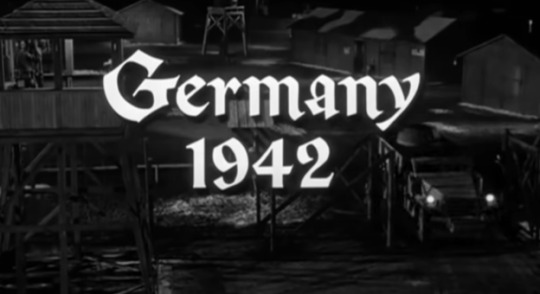
We also have a semi-confirmed date from A Tiger Hunt in Paris that “Frank Dirken” escaped Stalag 13 December 1942. Now America entered the war when the Japanese bombed Pearl Harbour on 7 December, 1941. Roosevelt officially declared war on Germany on 11 December, 1941.
But actual hostilities did not commence right away. There was the problem of getting all those men and material across the Atlantic but also, and I mean no disrespect to the Americans when I point this out, but due to America’s neutrality and non-intervention policy a majority of those in uniform at that time had no combat experience.
What this means in terms of Robert Hogan’s past prior to Stalag 13 is that it greatly constricts the time Hogan would have had to fight if he had first arrived in Britain with the rest of the USAAF. The first of the US 8th Air Force didn’t arrive in Britain until 12 May, 1942. (1) The first joint RAF/USAAF bombing raid was in the Netherlands on 4 July, 1942 (2) and the first solo US bombing raid in Europe was on 17 August, 1942, over Rouen. (3)
This would leave at the very most seven months for Hogan to not only establish his reputation as a bomber commander but also get shot down and then get the Stalag 13 operation up and running. In “Happiness is a Warm Sergeant” Le Beau says:

Le Beau: “Maybe we can tame [Kreb]. If he likes strudel.”
Hogan: “Come on. It took us six months to get Schultz to look the other way.”
Le Beau couldn’t have gotten the ingredients to make the strudel that is Schultz’s main bribe prior to the operation being set up, not from a POW camp.
Then there was the raid on the submarine base in Breman mentioned in “Two Nazis for the Price of One.”

Hogan: “I supposed you’re talking about the bombing mission I flew against your secret submarine base in Breman.”
There were three raids on Breman between May and December of 1942. 3-4 June, 25 – 28 June and 19 November. However there were other raids prior to that. (4)
One more interesting detail that I want to add before putting forward my theory as to Hogan’s timeline is that the first of the B17 flying fortresses saw action in Britain when the RAF used them to bomb Wilhelmshaven on 18 July, 1941. (5)
So here’s my theory. Hogan was flying for Great Britain before the US entered the war. There have been fanfics written on this which I highly recommend. However there is one snag with them. Hogan could not have been enlisted in the US Army Airforce when he did so. Not only was the US officially neutral in the war until 7 December, 1941 but it was illegal for US citizens to fly for Great Britain under America’s neutrality laws. But many did so by sneaking across the border into Canada with false papers, claiming to be Canadian or of other nationalities and travelling to Britain to join the RAF. (6) I think it is worth taking a moment to honour the courage of those men and what they risked. In the beginning the United States did not take these transgressions lightly as this story posted on the Warfare History Network attests.
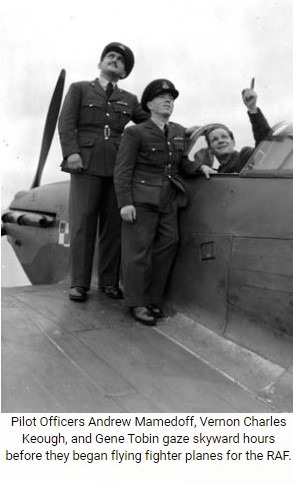
“As they boarded the train for Montreal, the two Americans tried to look as inconspicuous as possible. They were well aware that if they were caught they would be in trouble. At the very least, they would be sent back to the United States. There was also the possibility that they could be sent to prison, as well as fined more money than they had seen in their entire lives.
At the Canadian border, the train stopped and several sinister looking officials got on board. They wanted to know where the two were going and why.
“We’re on our way to Montreal to see a cousin who runs a fish hatchery,” was the reply. One of the unsmiling officials—probably an FBI agent—wanted to know if they were fliers. “Don’t be silly. Do we look like fliers?”
The officials were apparently satisfied by the reply. One of them opened the suitcases of the two travelers and rummaged through the top layer of clothing. He did not look any deeper. If he had, he would have found what he was looking for—flying helmets, goggles, and logbooks. Instead, he closed the lid and wished the young fellows a pleasant trip.
The two Americans, Eugene “Red” Tobin and Andy Mamedoff, were not smuggling contraband. They were going to Canada to enlist in the air force of a foreign country which, in the early weeks of 1940, was against the law. “The Federal Bureau of Investigation kept a pretty close check on all Americans going to Canada,” Red Tobin later said, “so we had to watch our step.”
You can read the rest of the article here. (7)
The men who chose to go to Canada risked not only fines and imprisonment but also loss of their citizenship. (8)
It wasn’t until 19 November, 1941 that Britain officially revealed that there were three squadrons of American pilots called the Eagle Squadrons. (9)
Another fact the prohibits Hogan being part of the USAAF prior to the American entry is that prior to the war America had start to build up its own armed forces. (10) It began on 15 June, 1940. By 7 December, 1941 they had over 2 million in all branches. (11) This means that the USAAF was in desperate need of competent and skilled pilots to not only lead attacks but also to train new ones in its Air Corp tactical school. (12)
Combine these and I think it highly unlikely that the USAAF would have turned a blind eye to one of its best and most brilliant tactical pilots and officers to go AWOL to fight for a foreign country, especially at a time when the isolationist movement was strong.
There is another route open to Hogan having fought for the RAF and even during the Battle of Britain that I would like to explore here as a possible . . . let’s say, alternative headcanon.
He could have taken the route mentioned earlier by those other Americans, crossing the border into Canada, getting training there and then going onto Britain. I can see Hogan doing something like this. In the face of the news of repeated atrocities being committed by the Nazis and his country refusing to get involved, I can see Hogan taking on a false identity and slipping across the border in order to join the fight.
But this is also the same reason I think that Hogan was not allowed to go AWOL from the US Army. It would have violated Roosevelt’s Neutrality Laws, even though he declared,

This would have crossed to far over that line, to have an American USAAF officer openly fighting with the British, especially after Hogan started gaining fame as a war ace and bomber commander. If he was so feared by the Nazis that Biedenbender was jumped from Colonel to General;

Biendenbender: “You see I am the reason you are now here as a prisoner of war.”
Hogan: “Thanks.”
Biendenbender: “When the bombing raids of the squadron you commanded started to become . . . oh slightly annoying to the Third Reich I was assigned to study your tactics, to get inside your head, I know everything about you . . . so I was able to predict precisely the planning of your last bombing raid on Hamburg in which you were shot down, and I, hah, I was shot up to a General.”
then his fame would definitely have spread to the Commonwealth and then to America.
This is why I put forward the possibility that Hogan never enlisted in the USAAF. Also, Wikipedia states “None of the Eagle Squadron pilots had previously served in the USAAF and did not have US pilot wings.” (14)
There is the option that Hogan never joined the Eagle squadrons directly but flew for the RAF separately. First of all, according to the Wikipedia site (13) none of the Eagle squadrons flew bombers, let alone B17s. Also, in the episode “Some of Their Planes are Missing” and “Funny Thing Happened on the Way to London” we are told that Hogan was attached to the RAF.
If we take this into account when we look at Hogan’s timeline, we get a lot more room for Hogan to have accomplished all that he did. If he snuck across the border into Canada under a false identity prior or during the Battle of Britain which was July through September 1940 (15) he would have over a year of experience, including making his bombing runs on Breman before being finally transferred over to the USAAF and the 504th bomb squadron once America entered the war. The same Wikipedia site quoted before also states that the ranks in the RAF were transferred after some negotiations to the nearest equivalent rank.
There is another detail from the series that supports Hogan’s story links to Britain and the RAF over that of the USAAF and that is the fact that he reports to London, not Washington. Almost all his links to the Allies are British. There are a few Americans, General Barton in “The General Swap”, General Tilman in “How to Cook a German Goose with Radar”, the captain of that submarine in “The Pizza Parlour” and we do see the alliance of the British and the Americans in “Easy Come, Easy Go”.
But other than that all of his contacts and command structure that he reports to are British. There is no mention of the OSS or of Washington. When Hogan is flown back to England for the briefing before D-Day in “D-Day at Stalag 13” the General (we are not given a name) is British, not American and the “old man” they refer to is Churchill, not Roosevelt.
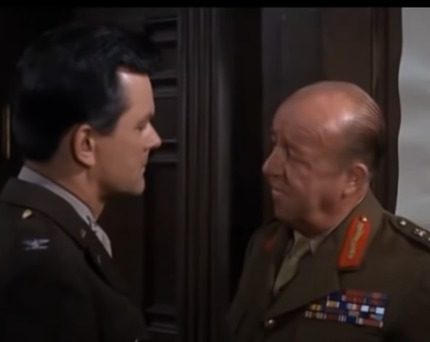
General: “Even to tell you this much this much had to be cleared at the highest level of intelligence, the Old Man himself.”
Hogan could have been one of those Americans who crossed the border into Canada, got false papers there and traveled to Britain to joined the RAF. He didn’t join the Eagle Squadrons (although I can see him qualifying on the spitfires because they were one of the best planes out there) because he’d been transferred to Bomber Command. When America entered the war, he transferred to the USAAF with the equivalent rank of Colonel and put in charge of the 504th bomb group (even though in reality the 504th flew in the Pacific theatre and not the European one and was part of the 20th Air Force) because by then his reputation had long since proceeded him. He was part of the US mass bombing raid on Ploesti on 12 June, 1942 (16) but was shot down after that and was transferred to Stalag 13 just about the same time as Klink, who (I’m assuming was there to solve the massive escape problems) as we are told in “The Kommadant Dies at Dawn”
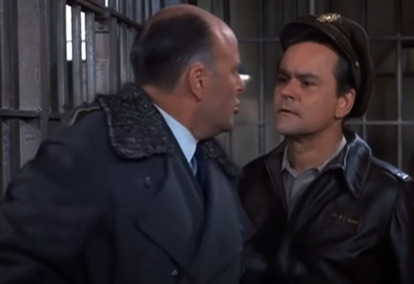
Hogan: “Are you kidding, before I arrived you had so many escapes they were going to put a revolving door at the front gate.”
Now like I said this headcanon is not water proof. There are some holes that I can’t fill.
Hogan does say that he was assigned to the Pentagon in “Klink vs the Gonculator”

As mentioned previously, I don’t think the Army would have let him go AWOL to fight for a foreign country if he was already an officer.
On the other hand I should point out that he was talking to Klink and was running one of his cons on him. It is also possible that he was assigned briefly to the Pentagon after Pearl Harbour but before he was shot down. His experience and connections in the RAF would have been invaluable. So maybe this possible headcanon of mine still holds water.
There are also other people who could have taken this path to the war and that is Kinch and every other black POW in Stalag 13.
The Tuskegee Airmen, the only black American squadron in World War II were first deployed overseas in North Africa on 24 April, 1943. (17) That’s too late for Kinch and the other black POWs to be shot down and sent to Stalag 13.
But while the American forces were segregated Canada and Great Britain weren’t quite so insistent on it. They couldn’t afford to be. This is not to say there wasn’t discrimination. Both Canada and Britain did have discriminatory practices (18) (19) that limited enrollment to all but the most general positions to those not of white European descent. But in practice a person of colour’s ability to not only enlist but to serve in a role beyond that of support personal depended very much on the recruitment officer as shown in this story.
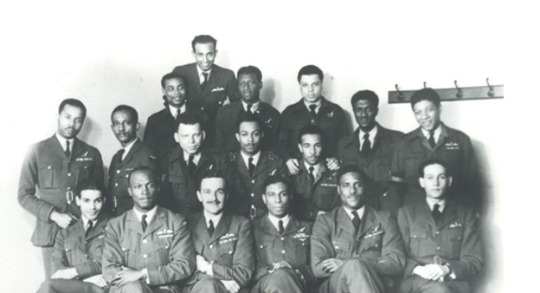
“In 1939 the so-called colour bar that prevented black people from serving in the British forces was formally lifted, largely because the Second World War meant that the Army, Navy and Air Force needed to recruit as many men as possible.
The lifting of the bar didn’t necessarily mean it was easy for would-be West Indian recruits to get in however.
There were people who would try three or four times to get in, or pay their own passage to come to Britain from the Caribbean.
Another route in was via the Royal Canadian Air Force. Canada may have been freezing cold but it was considered to be a warm and tolerant place for prospective black servicemen.
Billy Strachan couldn’t get into the RAF, so he sold his trumpet and used the money to pay his own passage to travel through U-boat-infested seas to London. He arrived at Adastral House in Holborn and declared his desire to join the RAF. The corporal at the door told him to “piss off.”
Happily however, an officer walked past who turned out to be rather more welcoming. He asked Strachan where he was from, to which Strachan replied “I’m from Kingston.”
“Lovely, I’m from Richmond” beamed the officer.
Strachan explained that he meant Kingston, Jamaica.
Shortly after that, he was training for aircrew.”
He went on to do a tour as a navigator in Bomber Command, then retrained as a pilot and flew with the 96th squadron.” (20)
See this link for the full story.
There were black fighter pilots in the RAF as shown in the links above. Not only that there were women of colour as well, such as Lilian Bader who joined the WAAF and Noor Inayat Khan who was one of the Special Operations Executive’s top agents in France. (21)
This is not to say that there wasn’t discrimination against people of colour in Canada and Britain. There certain were as the websites quoted here show.
But the racism was not as bad or as extreme as it was in the United States. People of colour could fill high ranking and highly visible prominent positions in the Second World War as shown in this article here. (22)

So this is a route that Kinch, Baker and the other black POWs could have taken to Stalag 13. Sneaking across the border, getting fake papers, training in Canada and then heading to Britain.
One of the holes in this possible theory is the issue of their uniforms. Unlike the American pilots who were white the black Americans pilots (if there were any) would not have been have been given equivalent rank in the USAAF or even been allowed to fly in the Eagle Squadrons once they were transferred to the USAAF. America was adamant on segregation, as shown here, (23) something that caused extreme tension in Britain.
While there was racism in Britain towards people of colour the racial hatred demonstrated towards black servicemen by the American G.I.s came as a shock to the British population. (24)
Hogan could have protested segregation all he wanted, demanded Kinch be allowed to fly until he was blue in the face (assuming he and Kinch did know each other as implied in “Prince of the Phone Company” episode).
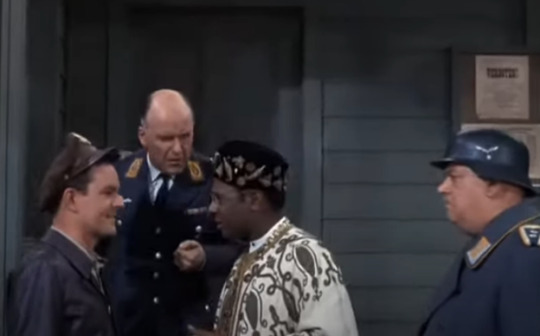
Kinch: “Hogan?”
Hogan: “Robert. Hogan.”
Kinch: “Ha Ha! Of course! I went to school with this man in America.”
The Americans would not allow an integrated air force. At best Kinch and the other black pilots would have been sent back to the States to join the Tuskegee airmen.
At this point there are two routes open for Kinch and the other black POWs to have been in Stalag 13 in time to help Hogan start his operation. One, they had been shot down prior to the arrival of the 8th Army USAAF in Britain by 12 May 1942.
The second option is that they remained with the RAF instead of transferring to the USAAF. As this article point out some of the Eagle Squadron members decided to remain with the RAF instead of transferring to the USAAF. (25)
So my theory for a possible route could work for Kinch as well as for Hogan. They could have both snuck into Canada as civilians, got official training and then joined the RAF. Hogan joined bomber command and gained his reputation as a war ace and tactician then joined the USAAF after America entered the war. Kinch was either shot down on a mission just before 12 May 1942 or remained with the RAF and was shot down later. Hogan flew several more missions until Bienderbender overwhelmed him. The Red Cross would have notified Britain about Kinch and the others and Britain in turn would have notified the US who in turn would have had the American Red Cross send the black POWs American uniforms.
This may have led to a reduction in rank for Kinch. The role of navigator (originally titled observer in the RAF) which he fills in “Hogan throws a birthday party”,
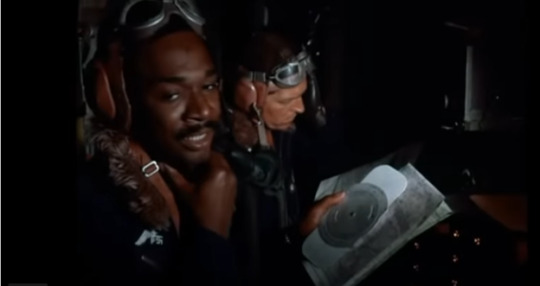
was usually filled by commissioned officer, see link (26), but could hold any rank from airman second class to Group Captain. The rank of flight sergeant in the RAF is the equivalent of a Master Sergeant in the USAAF. But if Kinch held a rank higher than that (which seems likely given the skill and high level of responsibility) then his being a sergeant in Stalag 13 would have meant a reduction in rank.
But as I said, this is just speculation on my part in an attempt to try and put the canon of Hogan’s Heroes into something that fits the actual historical timeline. I freely admit that there are holes in my theory.
Which is why I’m saying that this theory of mine is put forward as a possible alternative route that Hogan, Kinch and the other black POWs could have taken to get to Stalag 13 and leave them enough time for them to do all that they did and I hope it stimulates discussion and thought and (not to sound like I’m getting on a soap box here but I love research) a desire to research World War 2 for interest in the subject. Certainly that is what Hogan’s Heroes did for me.
Sources
1. World War II Database: https://m.ww2db.com/event/today/05/12/1942
2. History.net: https://www.historynet.com/first-usaac-raf-joint-combat-mission-july-4th-1942.htm
3. World War II today: https://ww2today.com/17th-august-1942-the-usaaf-makes-its-first-raid-on-occupied-europe
4. Bombing of Bremen in World War II: https://en.wikipedia.org/wiki/Bombing_of_Bremen_in_World_War_II
5. World War II Database: https://ww2db.com/aircraft_spec.php?aircraft_model_id=4 \
6. Wikipedia: https://en.wikipedia.org/wiki/Non-British_personnel_in_the_RAF_during_the_Battle_of_Britain#United_States
7. Warfare History Network: https://warfarehistorynetwork.com/2017/01/18/americans-in-the-royal-air-force/
8. Royal Air Force Museum: https://www.rafmuseum.org.uk/research/online-exhibitions/americans-in-the-royal-air-force/eagle-squadrons/
9. WWII: The Complete War Report. Directed by Various. Mill Creek Entertainment. 2017
10. Not Even Past: https://notevenpast.org/inching-towards-war-military-preparedness-in-the-1930s/
11. National World War II Museum: https://www.nationalww2museum.org/students-teachers/student-resources/research-starters/research-starters-us-military-numbers
12. The US Army Airforces in World War 2: https://media.defense.gov/2010/Nov/05/2001329898/-1/-1/0/aaf_wwii-v1-2.pdf (pages 85 & 142)
13. Teaching American History: https://teachingamericanhistory.org/library/document/radio-address-delivered-by-president-roosevelt-from-washington/
14. Wikipedia: Eagle Squadrons: https://en.wikipedia.org/wiki/Eagle_Squadrons
15. Britannica.com: https://www.britannica.com/event/Battle-of-Britain-European-history-1940
16. 142nd wing : https://www.142fw.ang.af.mil/News/Article-Display/Article/1211286/redhawk-reflections-on-the-first-american-mission-in-europe-1942/
17. Tuskegee Airman: https://www.tuskegee.edu/Content/Uploads/Tuskegee/files/TUSKEGEE_AIRMEN_CHRONOLOGY12.2011.pdf (page 9)
18. Historyhit.com: https://www.historyhit.com/was-the-raf-especially-receptive-to-black-servicemen-in-world-war-two/
19. CBC.ca: https://www.cbc.ca/news/politics/black-canadians-second-world-war-1.5793974
20. Historyhit.com: Was the RAF Especially Receptive to Black Servicemen in World War Two? | History Hit
21. Second World War Experience Centre: https://war-experience.org/lives/noor-inayat-khan-soe/
22. Royal Air Force Musuem: https://www.rafmuseum.org.uk/research/online-exhibitions/pilots-of-the-caribbean/across-the-commands/
23. Royal Air Force Museum: https://www.rafmuseum.org.uk/research/online-exhibitions/pilots-of-the-caribbean/answering-the-call/the-second-world-war-1939-to-1945-segregation/
24. Theconversation.com: https://theconversation.com/black-troops-were-welcome-in-britain-but-jim-crow-wasnt-the-race-riot-of-one-night-in-june-1943-98120
25. The National Interest: https://nationalinterest.org/blog/reboot/these-americans-flew-royal-air-force-during-world-war-ii-168713
26. Wikipedia: https://en.m.wikipedia.org/wiki/RAF_Bomber_Command_aircrew_of_World_War_II
#Hogan's Heroes#Colonel Robert Hogan#Sargeant James Kinchlow#Colonel Klink#World War 2#World War 2 timeline#racism#segregation#Nazi Germany#RAF#USAAF
25 notes
·
View notes
Text
Always You- Tom Holland Mini Series

Pairing: Tom Holland X Reader
Prompt: Your whole life has been leading up to you going to Cambridge, but Tom comes along and your plans start to change.
Word Count: 4500
Warnings: parent issues; mentions of anxiety and sex, angst :)
Loosely Based On: What Your Father Says by the Vamps
A/N: I’m American so don’t hate me for getting the British school system probably allllll wrong (i only know whats in harry potter lmao)
Masterlist Tom Holland Masterlist
*Gif is not mine*
~~~
2010, Age 14
“Crookshanks, where are you?” You called out, walking along the wooded trail. Your cat, a bright orange feline just like Crookshanks from the Harry Potter series, had slipped out of your house before you could catch her. You walked along the path, knowing she loved to make her way towards the park whenever she escaped, which wasn’t necessarily a common occurrence, but it happened often enough that you knew where she would venture off to.
You rounded the corner of the trail and entered the small park that was nestled in your neighborhood. You surveyed the park and sighed upon not seeing any sign of her. You continued your way into the area, eyes still searching. There were a few other people out, but you weren’t paying any mind to them.
That was until you heard a dog begin to bark. You looked to find the source of the noise. You smiled, seeing Crookshanks laying about in the grass. Your face dropped as you saw a dog running towards her. You immediately rushed over to her, but it was too late. The dog scared her up a tree, and the dog pressed its front legs on the tree, continuing to bark at her. Before you could even try to calm the dog, a boy came running up and grabbed the dog’s leash.
“Tessa!” He sighed in annoyance. He looked over at you and his eyes grew wide.
“I think your dog just scared my cat off.” You said, looking up at Crookshanks, who sat casually on a branching. The dog barked again and your cat let out a hiss.
“I’m so sorry. She’s just a puppy.” He apologized.
“Do you think you could help me get her down?” You asked, not knowing a reasonable way to get her out of the tree that didn’t involve you climbing the tree yourself. You weren’t particularly fond of climbing trees, especially since you were not at all coordinated.
“Oh yeah. Here, can you hold Tessa’s leash?” The boy held out the leash to you with one hand, the other hand rested on the tree. You took hold of the leash and he climbed up to grab Crookshanks.
“Thank you.” You smiled as he stood back in solid ground. You made a trade off, giving him his dog back as he handed you your cat.
“I’m Tom, by the way.” Tom held out a hand to you.
“Y/N.” You shifted to hold your cat securely in one hand and gave him a handshake with your free one. Before the conversation could go any further, Crookshanks began to squirm in your arm.
“I should get going, but thank you for helping me.” You stated.
“Anytime.” Tom smiled and waved goodbye as you walked away. Just before turning the corner back onto the trail, you looked back to see Tom once more. You smiled as he was taking a last look back at you as well.
~~
The next day, you decided it was a good day to read in the park. A part of you hoped that Tom would be there again today, but you didn’t want to get your hopes up too much.
You had been at the park for a couple hours already by the time Tom finally came with Tessa. When he saw you sitting on a picnic blanket with your nose in a book, he had to take a couple moments to work up the courage to talk to you again.
“Hey, Y/N.” Tom said, walking up to you. He cleared his throat as his voice came out squeakier than anticipated.
“Oh, hey, Tom.” You smiled, looking up from your book.
“What’re you reading?” He asked.
“Les mis.” You replied.
“That’s a- that’s a big book.” Tom stated, making you let out a laugh.
“Yeah, it’s a pretty good book though.” You said as Tessa began to grow restless at Tom’s talking
“Do you want to walk Tessa with me? I know you’re allergic, but-“
“I’d like that. Give me a moment.” You put your book and blakey away in your small tote bag. You and Tom began your stroll through the neighborhood along the trails.
“Do you walk Tessa often?” You asked.
“Almost every day. She’s still a puppy, so I’m trying to get her used to walks.” He explained. “How’s Crookshanks?”
“Inside.” You joked, “She’s good though.”
“So where do you go to school? I feel like I haven’t seen you around.” Tom asked.
“I go to a boarding school, actually. I’m only really home in the summer.”
“A boarding school? I guess that makes sense then.”
“Yeah, my parents have this grand vision of me going to Cambridge to study law.”
“Cambridge? Wow.” Tom said, eyebrows wide with shock.
“It’s a lot to live up to.” You replied. “I really hope I didn’t scare you off by saying that.”
“No, no.” He shook his head, laughing a little, “Cambridge’s impressive. It’s good to know what you want to do.”
“Well, it’s what my parents want. I don’t know what I want yet.” There was a pause in the air before you spoke up again, “What about you? Do you know what you want to do, or have your parents already spoken for you?”
“I want to be an actor.” Tom answered quickly, so sure of his dream, “If that doesn’t work out, I’ll go to carpenter school or something.”
“It sounds like you’ve got more of a plan than me.”
It wasn’t long into your walk before you got a call from your mother, beckoning you home. Tom offered to walk you home, but you declined.
“It’s alright, really.” You insisted as you two stopped on the trail.
“Can I have your number at least? So I can make sure you got home safe?” Tom asked, making you smile.
“Yeah,” You both took out your phones and exchanged phone numbers.
“I’ll tell you when I get home.” You told him, before bidding him farewell and leaving back down the trail towards your house.
It’s not that you didn’t want to spend the extra time with Tom, walking back to your house. You just couldn’t have your parents seeing him. Your parents, especially your father, distrusted any boys around you, believing they would distract you from your studies. They distrusted almost anyone you attempted to be friends with. They placed more focus on your academics, on your path to Cambridge, than on your social life.
That summer was the beginning of several great ones. You and Tom stayed in touch while you were away. He supported you in your studies, and you supported him as he began to get movie roles.
~~~
2012, Age 16
Another year of boarding school was done, and you had managed to convince your parents to transfer you to a local school, where you could finish your education without having to live away from home for months. The main reason you wanted to transfer was because you wanted to see Tom more.
Tom was also the main reason why you were nervous to return home for the summer, and permanently.
You two had been friends for two years now and saw each other at every opportunity. You really liked him, more than a friend should, and you had let that slip while you two were on the phone a couple days ago. Much to your surprise, Tom told you he felt the same way. You agreed that when you got home, you two would talk about it all.
The phone call ended oddly for you as you hit the realization that your parents had never met him. You ended up telling them about him and they weren’t exactly fans. You didn’t tell them about his career choices or his schooling, knowing they’d throw out the “not intellectually stimulating enough” excuse to dislike him. In fact, you kept the details of his own life to a minimum in an effort to avoid conflict with your parents.
So now, here you were, waiting for Tom to arrive for a movie night with you, which would also be the first time he’d meet your parents and be at your house.
“Now, remember, the door stays open.” Your father reminded you of his rules as you sat on the couch, shaking your leg nervously.
“Yes, dad, I know. Tom’s just a friend.” You said, trying to convince him of the lie even though you assumed you and Tom were past the “just friends” part.
You jumped up immediately when you heard a knock on your door. You opened your door to see Tom.
“Tom, I missed you!” You smiled, hugging your best friend tightly. After all, it had been months since the two of you had seen each other in person.
“I missed you too.” He squeezed you back. You stepped back after a moment, leading him inside. As you shut the door behind the two of you, your parents appeared in the entryway.
“Hello, I’m Tom.” He introduced himself, holding out a hand. Your parents introduced themselves and shook his hand in response. An awkward tension filled the air, causing you to speak up.
“We’re going to watch the movie now.” You said, grabbing Tom by the arm and leading him up the stairs.
“Sorry about that.” You laughed, awkwardly. You opened the door that led to your family’s movie room, complete with a large TV mounted on the wall and a few couches in the room.
“You have a movie room?” Tom asked in awe. “I thought we were watching a movie in your room or something.”
“My parents would die before they let me have a TV in my room. It’d ‘distract’ me from academics.” You said, mockingly making air quotes. You and Tom settled onto the couch with a strange space between the two of you.
“So, should we talk about-” Tom began to ask.
“Let the movie start first.” You cut him off before lowering your voice, “I don’t want my parents hearing.”
“Oh, okay.” He nodded. You shifted nervously as the movie began to play, filling up the room with loud noise.
“Did you mean it?” You asked, turning to him as you kept your voice quiet.
“That I like you more than just a friend? Yeah, of course.” Tom said, his eyes never leaving yours, “I can’t really explain it, but I know I really like you and I want to be with you.”
“I really like you, too.” You replied. After another paused moment, “So, what do we do now?”
“Can I kiss you?” He asked and you nodded. As he started to lean over, you felt the nervous butterflies overcome you.
“Wait,” You spoke up and Tom paused his actions, half way leaning over to you, “I’ve never kissed anyone before.”
“I’ve only kissed one other person.” He laughed lightly at the awkwardness and uncertainty of it all. “Do you really want me to kiss you? I don’t want to make you uncomfortable.”
“I want to kiss you too, but I just thought you should know.” You said, making him laugh a bit more.
“Ready?” He asked, reassuringly.
“Ready.” You replied. He leaned in faster this time, as if to not give you a chance to back out. You hate to sound so cheesy, but you really did feel fireworks when your lips met, putting all awkwardness aside. Tom rested one of his hands on your neck, delicately holding your cheek in his fingers, as he continued to kiss you. Just as you were thinking you never wanted the moment to end, he pulled away from you, just enough to maintain intimacy.
“How was that?” Tom asked quietly, his warm breath falling on your face.
“Perfect.” You smiled. He leaned in to keep kissing you, pulling you into him.
And that was how your relationship truly began, with awkward kisses that made your heart soar and secret touches behind your parents’ back.
~~~
2014, Age 18
“I got in!” was all you had to say over the phone for Tom to know exactly why you were over the moon with joy.
“My girl’s going to Cambridge!” Tom cheered, happily, “I’m so proud of you, Y/N. I knew you’d get in.”
“I couldn’t have done it without you, you know.” You said, looking down at the acceptance letter in your lap. Sure, you had said years ago that studying law at Cambridge was your parents’ dream for you, but over time, it became your own dream. You wanted to go to Cambridge, you wanted to study law, and you wanted Tom there with you the whole way.
Though you two had been dating for 2 whole years now, your relationship was still a secret from your parents. You wanted to wait until you got into college, until you had some freedom, before telling them. Tom respected your decision and acted as your ‘best friend’ whenever he was over. It hurt you to keep it from your parents, but you couldn’t risk them ruining it all.
“Please,” He laughed, “You’re a genius, Y/N. You got in all on your own.”
“You supported me and helped me study for years. I really couldn’t have done it without you.” You said, before letting out a sigh, “I’m going to miss you, though. Cambridge is nearly two hours away. It’ll be like boarding school all over again.”
“But it’s Cambridge. It’s your dream school.” He stated, “I’m going to miss you, too.”
“You can come visit me when you have time, and I’ll come visit you whenever my work load clears up.”
“About that,” Tom said, “I got an audition.”
“For what movie?” You asked.
“Y/N, it’s for Spider-Man.” He stated, and you felt your heart start to race.
“Spider-Man? Are you serious?”
“Yes, and it’s the MCU. If I get this role, it’d be life-changing.”
“You’re going to get it, Tom.” You said, unbelievably happy for him, “This is your dream role; I know you’ll get it. I’m so proud of you.”
“You talk about me being your biggest supporter, but don’t give yourself enough credit in being my biggest supporter.” He chuckled.
“I guess we really need each other, don’t we?” You smiled at the sound of his laugh. Your mom called you from downstairs, telling you that dinner was ready.
“Oh, I have to go. Mum says dinner’s ready, but I’ll see you tomorrow. I’m thinking a celebratory breakfast is in order?” You asked.
“That’d be amazing.”
“I’m so proud of you, Tom.” You stated.
“I’m proud of us.” He said. “I love you, Y/N.”
“I love you, too.” You replied before he hung up the call.
The next day at the celebratory breakfast, you and Tom met at a small cafe and spent the morning discussing his potential new role and your academic future.
“I got you a present.” Tom reached into his pocket in excitement.
“Tom, you didn’t have to.”
“I wanted to. I was going to give you this for our anniversary, but I just can’t wait.” He pulled out a small, navy blue ring box. He opened it up and there sat a delicate silver ring with a pearl nestled on top of it. “Now, it’s just a promise ring, but I wanted to give you something special. I read that pearls are symbolic for pure love and happiness, so, Y/N Y/L/N, I promise to love you forever and to bring happiness into your life just as long.”
“You’re so sweet. I love you.” You leaned over the small table to kiss him. Tom took the ring out of the box as you extended your left hand out to him. He slipped the ring onto your finger and pressed a kiss to it.
“And I promise to love you forever and to bring you happiness, too.” You smiled, eyeing the new ring on your hand.
You were going to Cambridge, and Tom’s career was coming together; you couldn’t be prouder or more in love with him.
~~~
The next few months were some of the most stressful months of your life as you finished up with your schooling and prepared to leave for Cambridge. You had been accepted into a special program that allowed you to begin your first year over summer, leaving just a few weeks for you to really get ready. Tom was incredibly anxious; he still hadn’t heard back about the Spider-Man role, and you could tell he was beginning to doubt his audition.
“You’re leaving tomorrow?” Tom’s voice almost broke as he repeated your words over the phone. It was yet another phone call because your parents wouldn’t allow you over, despite you being 18.
“Yeah, it all came so quickly.” You said. Your heart was heavy at the thought of tomorrow being your last day home with Tom for who knows how long. You self-consciously began to play with the pearl ring as it hung from your neck; you thought it’d be too suspicious on your ring finger, and so it hung around your neck on a silver chain.
“Can I come see you? Before you leave?” He trailed off at the end, not wanting to fully say ‘leave’ because it’d make the situation all too real.
“Of course.” You replied.
“I have to go, but when do you leave? I’ll come by tomorrow before you leave.”
“11.” You told him.
“Alright, I’ll be there at 10:30.” Tom replied, “I love you.”
“I love you, too, Tom.” You hung up the phone with a sigh. You didn’t want to leave Tom, but this was Cambridge, this was your dream.
“Y/N, what was that?” Your father asked, stepping into your room. Your eyes went wide with horror as you turned to face him. He stood beside your mother in your doorway. Your father was red in the face from his anger, but your mother looked disappointed, disheartened.
“I can explain.” You squeaked out, clutching onto your phone tightly.
“It better be a good explanation.” Your mother said, sternly.
“Tom and I are dating.” You replied as your voice shook hesitantly.
“Tom the wannabe actor?” Your father questioned. “Think logically here, Y/N. He’s got no future-”
“That’s not true.” You argued.
“He’ll never amount to anything. If you care about your future, then you know he’s not good enough for you.”
“No. I get to decide who’s good enough for me, not you. Tom’s the best thing that’s ever happened to me and I love him.”
“And what of Cambridge?” Your father asked.
“What about Cambridge?” You questioned, frustrated and confused by his inquiry.
“Is he worth more to you than Cambridge?”
“What are you talking about? I love Tom, and I want to go to Cambridge.”
“Choose. Right now.” Your father stated, “You can either choose Cambridge, where you’ve planned on going your whole life, where you want to go to school, where your future will become infinite. Or you can choose Tom, who will never amount to anything.”
“I can’t,” You shook your head, feeling the tears form in your eyes.
“You will do well to remember who is paying for your college. If you choose Tom, you’ll have no means to go to Cambridge. If you choose Cambridge, I will continue to fund your tuition, but you can never speak to him again.”
“Dad, please, I can’t choose.” You began to fully cry now. You were too distraught to try to keep it together.
“Choose.” He repeated.
You closed your eyes, refusing to look at the man that you once called your father. You took a deep, shaky breath before whispering, “I choose Cambridge”.
“Then no more Tom.” He stepped towards you and grabbed your phone from your hands. He followed your mother out of the room, slamming your door and locking it from the outside.
You felt your heart breaking. There was no way out of this- you had made your decision. You had chosen your future at Cambridge; and yet again, you were left alone as you chose academics above all else.
You wiped away your tears and turned to your window. You had never attempted to sneak out before, but tonight, on your last night here, it seemed like a good time to try. With your room on the first floor of your house and your parents’ surprising lack of cameras, you opened your window and ran off into the night to Tom’s house.
You came to a halt just outside of his house. You weren’t even sure if his family was there- they’d been gone on holiday for the past few days, but you didn’t want to risk his family seeing you like this. You snuck your way over to the side of his house, just below his window. His light was on, and you could make out his shadow through the window. Grabbing a couple pebbles from the ground, you began to throw them up to the window. After a few finally hit the glass, Tom came to the window, opening it to see you.
“Y/N, what are you doing here?” He asked, his voice just loud enough for you to hear him.
“Can you sneak me in?” You called back to him and he nodded. You waited by the back door as Tom came to get you. When the two of you were finally in the safety of his bedroom, you hugged him tightly and he rubbed your back, soothingly.
“Hey, hey, what’s wrong?” Tom inquired. His voice was soft and comforting, everything you needed.
“Is your family here or are they still on holiday?” You asked.
“They’re still gone. What’s going on?”
“I’m scared.” You whispered, starting to cry onto his shirt. Tom pulled back from the hug so that he could rest his hands on your cheeks.
“You’re going to do so well at Cambridge, darling. You’re the smartest person I’ve ever met, you don’t need to be afraid.”
“I’m afraid of losing you.”
“You’ll never lose me. I promise.”
“But I will. I’m going to Cambridge, and you’re going to be off acting.” You said. You wanted to tell him about your parents, but you couldn’t- you couldn’t say those words to him.
“We’ll always have each other. I love you, Y/N. I don’t plan on leaving you anytime soon.”
“I love you, too.”
“C’mon, it’s late. You should sleep.” Tom moved over to his dresser, grabbing out a t-shirt and some boxer shorts for you as make-shift pajamas.
“Tom,” You whimpered, reaching out for him.
“What is it, darling?” He asked, his eyebrows furrowed in concern.
“It’s my last night here. Please,” You couldn’t form the words you wanted to ask. You stepped toward him and rested your arms on his shoulders so your fingers could play with his loose curls.
“Are you sure?” Tom further clarified, and you felt like you were transported back to the night you had your first kiss, so much certain uncertain with such a step. You leaned up to kiss him and nodded.
“I want this. I want you.”
As much as you tried to sleep later that night, you just couldn’t. You just wanted to stay in his warm arms forever, but, as the sun started to rise, you knew you had to leave. You leaned in to kiss him on the lips for what would be the last time. He stirred a little, but remained in deep sleep. You untangled yourself from his embrace and changed back into your clothes from the night before.
“I love you.” You whispered to his sleeping form, before sneaking out of his house and back into yours.
That morning, you left with your parents two hours earlier than planned. You thought of Tom the whole drive up there. You wondered if he showed up at 10:30 like he had said he would, if he was trying to reach out to you at all. You knew it was no use for him to try to contact you- your parents placed a tracker on your phone and blocked his number.
As you moved into your new life at Cambridge, you couldn’t help but think about what you left behind in your old life.
~~~
Part Two
#tom holland#tom holland fanfic#tom holland imagine#tom holland one shot#tom holland x reader#tom holland x you#tom holland x y/n#tom holland fic#tom holland series
118 notes
·
View notes
Text
Channeled Angelic Prophecy of the Jewels of Truth Series on Chinese Militaristic Hegemony Triggers WW3

Hello All,
I'm somewhat nervous about making this entry blog post regarding it's a very very controversial topic. It would come off as China-bashing, which in fact it is more an alarmist entry regarding an East vs. West power struggle that gets out of hand with a conflagration of a World War in its wake. This almost seems like history repeating itself less than a century ago with the Japanese Imperial ambitions of the 1940s spreading across the South Pacific.
I get skittish when I receive such automatic writing missives from the angels as a cautionary form of tough love. As repent all ye who enter here type of phenomena. For my part, I usually bury these statements in my notebook collection of these channeled statements. However, I deemed this one more so detailed with 8 Points of No Return as qualifiers for WW3 with China versus the World triggers itself. I intuit that this is 75% locked in already as ill-fated destiny up to 85% potentiality.
This is my caveat I hope to God I'm awful wrong as having drunk the Kool-Aid as Coco for Coco-Puffs loony toons basket case in this regard. With that stated, I feel more a prophet of doom than an Inspirational spiritual poet as my usual devotion. The statement 3,048 dovetails also upon the commencement of WW4 in 2075 by the European Federation as an Empire, not today's European Union.
Interweaving through all this the angel nameless as they often are without egos speaks about my "Jewels of Truth" series surviving eons (?) from now as a recorded spiritual philosophical angelic discourse with humanity. Talk about a shameless plug in all places and on this apocalyptic topic.
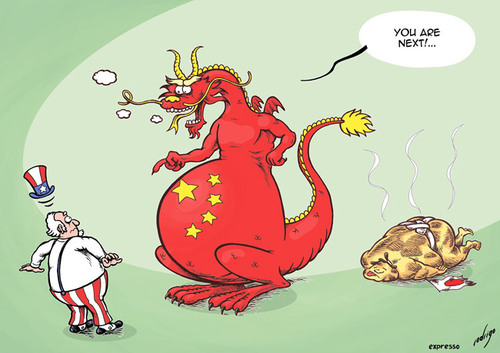
Prophecy of WW3 & WW4:
3048) What is to become of what you call the "Jewels of Truth" legacy of our spiritual angelic discourse with you in the centuries and eons following the end of your life on this earth dearest "Ivan the Atrayo". A future global religion as a cross-pollination of spiritual traditions not unlike that of the Persian Bai-Ha religion but one that actually succeeds in becoming truly globalized. A meta-Worship of the Abrahamic Creator God gets pinched transcending its original roots in around 150 years plus. As can be said from wingtip to wingtip of the Imperial Hawk as the standard for a New World Order.
We the angelic heavenly host didn't wish to alarm you dear Navi (Hebrew for Prophet, ie my first name spelled backward "Ivan") with such an infamous statement as you deem alarmist. However, you amongst many others are canaries in the coal mine seeing the writing on the wall as false placating by China is practically a foregone conclusion in world history to come.
With all this said take this as a pinch of salt to add flavor to the human condition as a cautionary tale of woe if ignored en-masse. As you stated in your introduction above, this is our Tough Love for humanity to glean what it may from our stance to date. Humanity can steer around this for the writing on the wall can still be whitewashed over with bravery if mutual reconciliation is so desired between the superpower of China and the rest of the World.
Allow us to start backward as it may with the future disaster of World War 4 in the region of the world that you presently call Ukraine. Mother Russia is no more a threat for China in WW3 made them their conscripts but that comes later in this statement. The peoples of Ukraine are ancestrally pure stalk of Euro-Slavic genetics and the future European Federation as a dystopian version succeeds the European Union after the rampant famines and plagues scorch the earth post WW3. The European Super Continent unites more so akin to the Ancient Roman Empire of yore with democratic tendencies only for its elite castes. Thus the seeds of distrust and acrimony are sowed once more by barbarians at their gates of the empire.
The year is 2075 the European Continent was less so ameliorated by the nuclear holocaust of WW3 than that of the North American continental shelf. In some ways the traces of Chinese culture is stronger upon Europe for the Silk Road 2.0 of the Sino Belt and Road Initiative succeeds culturally and economically by far before the Chinese government uses it as a Trojan Horse. Chinese population centers of its mainland are akin to a lunar landscape post WW3. Thus its peoples migrant en masse onto Asia Minor what is the Middle East today and into the Eastern flanks of Europe. Such Chinese populations will be considered the barbarian mongrels for the dystopian European Federation thus WW4 ignites around the Black Sea of Crimea.
In twelve years what you consider as an alpha or new beginning Ivan. Will be the start of World War 3 with China upon the year 2033 Anno domino. Give or take 6 months after China crosses 8 Points of No Return that the angel of the Lord God sounds the trumpet of perdition on Earth. China for its part ascended to the righteous status of a superpower too quickly and anything that is achieved too soon is lost just as immediately. The greek tragedy of Icarus with the Sun melting the wax bindings of his artificial wings sends the young lad plummeting to his death.
It is a matter of fact that China has every right on God's Earth to succeed and be a proud nation of her ancestral peoples on a united front. However, as they have been victimized by the Japanese during the early 1940s and were the footstool of the British empire of the 19th century. They feel that payback is in order to the world with a chip on their shoulder, thus their Sino exceptionalism soon becomes a recipe for disaster for the rest of the world and her Asian neighbors.
Notwithstanding its currency manipulations as a temporary measure during the early 2000's to cheat its way to the top. This practice was soon discontinued due to not overheating with a meltdown their economies of scale were soon achieved globally. Next to their notorious one-two punch of lured infamy of intellectual property theft as sanctioned statecraft of technological theft transfers. It would allow the Chinese State to supercharge its beautiful minds to leapfrog the West and the grand USA at its own game.
The first ill-fated seal of WW3 was when China annexed and conquered Tibet during its Cultural Revolution of Mao Tse Tung. That set the tone of supremacy in an egotistical guise of reclaiming its lost Imperial Dynasties of centuries before of grandeur. The 2nd seal of WW3 was broken more so recently from what they learned in subjugating the Tibetan peoples. They carried over to their Muslim minority of the Uyghurs accomplishing their cultural genocide upon them as enslaved conscripts. The Western economic sanctions on its textiles from such a provincial region are little more than a slap on the wrist.
What the Chinese learned from the Tibetans and now the Uyghurs they are implementing on Hong Kong like the flap of the wings of a graceful dragon. Soon the 3rd seal of WW3 to be broken is the naval and aerial invasion of the democratic island nation of Taiwan off its mainland. These so-called rebels will soon experience the Chinese boot snapping their collective necks with the revenge of humiliating their might makes right doctrine.

The 4th seal of WW3 is already partially cracked open with China claiming its ancestral Imperial Dynastic seaways and now air passage routes in an outright fashion. Building naval airbase atolls out of the ocean a feat of engineering will soon pot mark the South China Seas like satellite landmines to the rest of the world. Naval commerce and air traffic are now harrassed including foreign military air traffic be dammed. Expect so-called enemy fighter pilots of Australia and other South East nations to be shot down outright. With naval cargo and oil freighters to be harassed by premature boarding inspections as so-called checks for illicit goods.
The 5th seal of WW3 to be broken is when Mother Russia is soon out witted by Chinese Hegemony. When the mafia state of the Russian government gets greedy in an oil dispute transfer with the Chinese it soon escalates to sour grapes all around. Leading up to China invading by land its armies seize Russian Southern Oil fields permanently. Thus Putin the Russian Czar's rule comes to an end as his Oligarchs soon replace him with a shill of a weak national leader to appease China. Opening the way in future years that the Russian army is at the beck and call of the Great Dragon of China as its conscripts by any other name.
The 6th seal of WW3 is when China tires of the North Korean Premiers games of Kim Jong-Un they annex North Korea without firing a shot. Installing a viceroy and begin massive industrial mining for the mineral riches of the North Korean Peninsula. Which ironically jump-starts the North Korean economy putting its citizens to work for an eventual rise out of poverty.
The 7th seal of WW3 is the greatly lauded Belt and Road Initiative as the Silk Road 2.0 becomes what it is advertised to do. A boon of Chinese engineering producing Infrastructure projects from China through the Middle East into parts of Europe as Sino goodwill public relations globally. It is a roaring success since similar projects brought Africa out of its schizophrenic famines and poverty up to 20 years ago. That all the foreign aid historically upon Africa could never do.
However, what looks good and feels good with much mutual economic prosperity triggers a fervor for Chinese hegemony abroad. Where southeast Asian nations of Cambodia, Laos, Vietnam, Thailand, Myanmar, and Indonesia soon get the negative attention of Chinese interference as Big Brother. Frankly stated the Belt and Road Initiative becomes a proverbial Trojan Horse for the conscripted armies of Russia, North Korea, and China's armies. To seemingly roll upon in the guise of an inaugural guest-hosted military parade throughout the circuitous route becomes a bait and switch tactic.
The 8th seal of WW3 is that the unwelcome security occupation by the Chinese armies outside its mainland albeit as security guarantors is soon worn out. The remaining free nations declare war on China and within months a nuclear holocaust is triggered by the United States as a desperate first-strike policy.
Thus ensuring that Beijing its Capitol and Shangai as a modern port megalopolis of Chinese Supermacy is nuked several times by the Western nations of the US and Europe leaving it akin to a lunar landscape. The United States will receive the majority of Chinese Nukes rather than that of Europe as cited in the above introduction to this posting. The US island territory of Puerto Rico is hit directly upon Old San Juan its Capitol for it lacks a missile battery defense shield capability. All the island residents that remain leave over the ensuring years throughout the rest of the Caribbean (ie Cuba, Haiti, Dominican Republic, etc...) and other parts of Florida.
All major primary and secondary American cities are hit once or twice by Chinese and Russian nuclear strikes such as Miami, Houston, Washington D.C., Denver, Las Vegas, Los Angeles, New York City, Detroit, and so forth. Also, the missile defense shield battery purchased by Australia from the United States works as advertised. Sydney is spared a near-fatal strike however the radius concussion of such a nuclear missile detonation overhead causes an electromagnetic pulse knocking out its electrical grid. Its offshore island of Tasmania doesn't fare as fortunate it is hit directly annihilating its entire population. Lastly, the New Zealand Capitol of Christ Church is also hit directly by a Chinese nuclear strike.
World War 3 lasts for a mere 6 years time ending roughly by the end of the year 2039. Leaving what remains of China, Russia, North Korea, and its counterparts of the United States and Europe is a near catastrophe for the next 60 years plus to attempt recovery. The United States loses its superpower status soon to become the Federated States of America an empire by any other name dystopian. Chronic outbreaks of famine and various once curable diseases spread dysentery of water-born illnesses run rampant and plagues of Covid-19 and other forms of Influenza throughout the Americas.
However, in the decade to follow the Federated States of America invades its neighbor to the North as Canada. In order to seize its prized infrastructure and pastoral farmlands to maintain its hold of power. Slavery in America is institutionalized once more in order to cultivate its non-irradiated farmlands and strip mining. Hungry mouths cause riots and thus enslaving such unruly ungrateful once citizens is another act of desperation.
Africa and the rest of the Americas such as the Central and Southern regions fare way better from the Chinese and Russian nuclear attacks lest that of Columbia and Costa Rica. Ironically democracies take root here to one degree or another as they see the dystopian societies of Europe and that of North America and want no part of that turmoil. The Federated States of America partially fascist devolves into feudal Esque family houses of nobility as the once upper classes survive to a degree via tact and shrewdness.
Your "Jewels of Truth" series as our angelic discourse with humanity dearest "Ivan the Atrayo" survives mostly intact not unlike that of the affectionate Rumi and Hafiz as Spiritual Persian poets have done so. Since your channeled writings of us for now, over 26 years to date as Inspirational automatic writings as a clairaudient psychic technique has foretold. It Will be cherished by the generation of readers to come lasting centuries if not an eon or two more. Taken into the stars by futuristic human colonists leaving the earth out of necessity due to dwindling resources.
The 1st truly global earth religion subsumes your writings into one of its tomes of sacred literatures. Thus you'll be piggybacking onto another greatness by sheer good prosperous luck for the added measure as there are no accidents metaphorically speaking. To this, we remark a thank you for taking the courage to share this cautionary statement although your reservations have been noted in protest by us.
Go with God(dess) those of the eyes to see and the ears to hear between the rhetoric spoken by the greater national powers that be. There's is the agony soon to herald all into collective planetary ruin because of a game of brinkmanship that gets out of control soon enough. Pay attention and take actions that are peaceable via protests or be steamed rolled into oblivion. Amen. ---Ivan Pozo-Illas / Atrayo.
Ivan "Atrayo" Pozo-Illas, has devoted 26 years of his life to the pursuit of clairaudient Inspired automatic writing channeling the Angelic host. Ivan is the author of the spiritual wisdom series of "Jewels of Truth" consisting of 3 volumes published to date. He also channels conceptual designs that are multi-faceted for the next society to come that are solutions based as a form of dharmic service. Numerous examples of his work are available at "Atrayo's Oracle" blog site of 16 years plus online. You're welcome to visit his website "Jewelsoftruth.us" for further information or to contact Atrayo directly.
#Jewels of Truth#Atrayo's Oracle#Ivan Pozo-Illas#Automatic Writing#Angels#China#Hegemony#WW3#WW4#Psychic#Channeler#Prophecy#Apocolypse#Russia
1 note
·
View note
Text
It’s Always Sunny In Lebanon
Status: Complete
Word Count: 4.1K
Category: One-shot, Humor, Holidays, Christmas, Cross-over (It’s Always Sunny In Philadelphia)
Rating: (Older) Teen & Up
Character(s): People and places you’ll recognize [be surprised, eh?]
Warnings: A solid section of, um, coarse language
Pseudo-Warning: If you aren’t familiar with the show “It’s Always Sunny in Philadelphia”, this one may not be for you, just FYI. [wink]
Author’s Note(s): For @ellen-reincarnated1967’s “Andi Turns 36: SPN & It’s Always Sunny In Philadelphia Crack Challenge” - hope I did your favorite shows justice! I strenuously recommend readers “hear” the non-dialogue parts in your best-worst approximation of a super-snooty British accent, as if a posh older gentleman is telling you of this debacle (for instance, our main character’s name should be pronounced “Buh-nurd”). Imagine your guide is seated with perfect posture in a leather chair near a fireplace, snifter in hand, looking down his nose at you. And of course there’s a damn ascot and a jacket with embroidered monogram, I’m not playing around, neither should your mind’s eye; more post-story
Overall Summary: This is the story of the largely unmentioned Bevell son, who was born out of wedlock many years ago. A reject from the MoLs, he was shipped off to ‘Merica in disgrace, and after prompting from his nephew, is determined to solve the mystery of his missing sister, Lady Antonia “Brain-Diddle” Bevell.
Overall Summary Spoiler Alert: This does not go well.

Bernard Bevell was born to one Anastasia Bevell at the worst possible time. She was fifteen, finishing what would be her final year at a private girls' school, established for and populated by the most posh and elite young ladies, the ones destined for greatness. In Anastasia's case, this meant a life full of action and adventure, fulfilling family tradition by becoming a member of a prestigious - albeit unknown to most - society. All she had to do was make it to the end of term and pack up her room.
She hadn't known she was with child, as he wasn't a terribly active house guest, as it were, quite slug-like, in fact. Then when a particularly raucous round of gas sent Anastasia to the loo, she hadn't been perched on the throne for long when there came Bernard. It was, to be sure, a less-than-illustrious beginning.
Bernard's life followed suit.
Anastasia was not allowed to proceed with her plans, in large part because of his existence. No amount of pleading and pledges of sizable donations on her father's part were accepted. Everyone knew the situation, and as everyone's opinion mattered, this vexed him, which vexed his wife, which in turn brought their ire down upon their daughter, declaring that her piece of the family fortune would now be bestowed upon her other siblings, and them alone.
Though Anastasia had not a maternal bone in her body, when she fled from the family estate she brought her son, and everything she could stuff into as many suitcases as would fit into her Aston Martin. She departed in the dead of night, stopping only to transfer Bernard from her valise to the floorboard after an impressive nappy fill. He had inherited his mother's... constitution.
It should be said, neither Bernard - or Bernie, as he came to be called - nor Anastasia were Bevells in the beginning, and for several years after the estrangement, they struggled, despite the chunk of cash Anastasia stole from her father's safe on the way out. The ancient, rotting duplex they called home for the first six years of Bernie's life was never without action, however; they had frequent visitors, many of whom he saw more than once, and they always brought him toys to play with when they'd go upstairs with Anastasia to discuss business. She explained to Bernie that she was a bank of sorts, and that they were stopping by to make deposits.
Bernie knew better, though; they played, too. Those old, creaky floorboards in combination with the old, creaky mattress didn't muffle much. Bernie couldn't wait to be a grown-up, so he could jump on the bed and laugh and shout without getting scolded.
While his mother was cold, to say the least, and she did her business double-time at holidays, she never failed to make them special, arranging virtual parades of pudgy cupids and tall Easter bunnies, and then best of all was Christmastime. Father Christmas after Father Christmas after Father Christmas - sometimes two and three at once! - would stop by, and even the occasional troupe of elves would show up. Bernie was proud for the connections his brilliant mother had made. The neighbor children didn't believe him, so he'd invite them over to see; their parents never let them stay. He felt sorry for them.
The toys were fantastic at these times of year, what with the bows and arrows, and the chocolates and candies, and the army men and train sets. By the time he was five years old, they had moved on to lodgings more suited to his mother's taste, and the holidays were still filled with sweets and presents, but it wasn't the same. He hoped after they moved that all of her business associates - especially the Father Christmases - had found new banks for their deposits, ones as exceptional as his mother.
These dealings allowed his mother to integrate herself back into society a bit, and soon she became a Lady, because she'd married Lord Bevell - which is what Bernie was instructed to call his new stepfather. Bernie never did learn his name, though he was allowed to call the Lord's mother Grandmother Bevell. He was largely cared for by a nanny here, a butler there, and his adopted grandmother was loving - she'd made the attic quite comfortable for him, in his estimation. And when his sister came along, he learned she'd been named for their grandmother: Antonia. Bernie himself had been named after the dog.
As time went on, Bernie's behavior became of concern to all parties - his initial royal flush was not his last. His adoption into the Bevell clan brought along with it some perks, such as a sizable allowance and private schooling. His academic career began with a rousing start, wherein he failed first grade, going on to fail out of many schools, including the last resort, militaristic boarding school where, at seventeen, he was the oldest freshman they'd ever had. The gambling ring he'd begun, including but not limited to betting on squirrel battle royales, ensured his departure, and by the time he was twenty, he'd torn through most of the modest trust fund bestowed upon him at eighteen.
But most concerning to Lord and Lady Bevell was Bernie's influence on Antonia. Lord Bevell was also a member of the Men of Letters, like his wife's father, and while Antonia's mother's antics had not been forgotten by the elder members, that she had done well for herself in the end had not gone unnoticed. Antonia's education and training had already begun, courtesy of her father, at a young age. She was exceptional, earning high marks in all subjects with ease, an accomplished equestrian, could best any competitor in fencing.
And she could manipulate the hell out of anyone who stood in her path.
Antonia loved her older half-brother to the extent he was of use, case in point: taking her to the more questionable areas of the city so she could drink and play billiards, and - as her grandmother would later put it - carouse. She was smart enough not to reveal her actual identity, and so Toni the Tramp became legendary, a name whispered in the pubs, warnings issued amongst friends, then further amongst the pub owners who warned their barkeeps of the pre-teen who would talk them into serving her shot after shot, challenging them to beat her, leaving them stumbling while she nicked from the till.
Bernie was so, so proud of his genius sister. He considered her his best friend, despite her frequent sneers and insults. Alas, their hijinks were short-lived; she was sent off to Kendricks, and he was exiled to America with what was left of his trust fund.
Settling in Philadelphia, Bernie continued his antics, being conned out of large sums of his money along the way - often by the trust's manager, Frank - stumbling into circumstances that allowed him to get it back by other means, though he'd fortunately made a great friend not long after he'd been in town, a chance meeting at the meth clinic. Mac frequently borrowed money from Bernie, given their shared love of beer and the resulting hefty tabs, but the thing that solidified their relationship was a love of Christmas.
His friend's family did it up right, and Bernie was blissfully surrounded by gingerbread and turkey and sparkling lights on trees. It made him miss the old days, and even made him miss the later days, when he'd be tasked with crawling under the tree at the manor, getting covered in sap, passing Antonia's presents to her as he located his own. Santa had always been careful to hide his presents at the very back, where his curious sister would not tear into them with her teeth. Antonia always was partial to biting her way through things; as usual, Bernie admired her style.
The years passed.
Grandmother Bevell took ill and died, and due to a careless secretary Bernie was made aware. After the funeral, a large spread had been assembled for the mourners and whilst in the process of stuffing his pockets with roast lamb, he spotted Antonia lingering in a corner. He rushed over, immediately drawing her into an embrace, which made her immediately grimace; her only reciprocation was to push him away.
"You smell of meat," she said.
"Nah, it's just this lamb, I never get it back home, better stock up while the getting's good."
"Your pockets are dripping. And why have you adopted that ridiculous American accent?"
"I dunno. Hey, wow, Tones - you're getting fat."
She glared. "I'm not fat." A pause. "Do you have anything besides lamb in your pockets?"
"You mean----"
"I mean, let's go out to the stables."
"I don't wanna ride right now, but thanks for----"
"We're not going to ride, you buffoon. We're going to get out of this godforsaken misery. If you've nothing of worth on you, then nevermind, I'll have to find another way to distract myself. I can't believe you've shown up here empty-handed."
"I had some poppers, but those were for the plane----"
"Then just swipe some of the wine and meet me there. Hurry it up!"
Bernie grew sentimental. "Aw, like we used to?"
He received no answer; Antonia had already turned and begun walking to the kitchen, so she could slip out the back door.
Bernie learned that day that his sister was not, in fact, getting fat. Like her mother, she had found herself out of wedlock and with child. But unlike her mother, she was already at Kendricks, only a year away from graduation, and she held great promise, such great promise that she was already considered an asset to the Men of Letters. The headmistress, Dr. Hildegard Hess - the one Toni called "the crone" - had herself been at Kendricks many moons ago and knew of the Anastasia-Bernie situation. Ordinarily, she'd have given a student who'd behaved so irresponsibly the proverbial boot, only she saw future benefit in keeping Toni around, and so she helped Toni cover up her pregnancy by saying she'd been sent away on an apprenticeship. Lord and Lady Bevell arranged for a stately home away from the city, though not too terribly country, and a nanny was employed, and baby Artie was safe and sound while his young mother finished her time at Kendricks.
More years passed.
As Toni's status in the Men of Letters grew, so Baby Artie grew, though in his case, it was not by much. That is to say, his mind - like his mother's - was far ahead of other children his age, but his stature remained diminutive. He appeared many years younger than his actual age, and his innocent countenance let him get away with murder. Literally. Bernie knew this because despite Toni's forbidding Artie to be in contact with his uncle following the mess Bernie made of Artie's christening when he caused the priest to faint upon the sight of the carefully-crafted rat mobile gnawing its way through the gift box, his conniving nephew was proficient at hiding email trails and stashing phones.
Artie appreciated that Bernie didn't scold him when he told of his adventures. He'd regale Bernie with stories of his neighborhood hijinks - baptizing cats, and shooting stray hounds with pellet guns, tossing the occasional molotov at other neighborhood children - but he assured Bernie that he left the badgers alone, even trained a particularly vicious one to nip at his most recent nanny's ankles, did it with a dog whistle, he'd bragged. He'd sent Bernie a video, it was amazing, though Bernie still held an affinity for squirrels. He had found that Philadelphia city rats were comparable, highly trainable, offered to ship one over as he had a shoebox handy; Artie wisely declined.
And then, disaster struck.
Summer had barely begun when Artie called Bernie in near-hysterics, causing his concerned uncle to steal away to the corner of his favorite bar, trying to calm the child.
"Art, my man - chill out! You gotta slow down!"
"It's Mummy!"
Bernie's eyes grew wide. "You have a mummy? Did you wrap up your nanny?" He lowered his voice to a whisper. "Did you remember to take out her brain?"
"I mean MUMMY - my mother! She's been in America for ages, and now she's gone missing!"
"Whaddya mean, missing?"
"We haven't heard from her in over a month!"
Bernie leaned against the wall, suddenly feeling wobbly in the knees. "Artie, what was she doing here? Where was she? What----"
"You have to find her," Artie said, and gone was the child's panic, his voice now more adult than his uncle's, his tone both grave and demanding.
"How am I supposed to----"
"I've wired you money for expenses. There is a plane ticket waiting for you - you're going to Kansas City, then I'll have a car rented for you - you have to go to a godforsaken mole hill called Lebanon."
"I can't do this alone!" Bernie blurted out, not bothering to argue, he knew he'd go as instructed, but he was scared.
Artie huffed, said, "Fine - I'll arrange another ticket, bring that friend of yours, he has some sense, at least."
Bernie felt the sting. "Artie... what's that supposed to mean?"
Artie immediately reverted to his most innocent. "Aw, Uncle Bernie, I'm sorry. I'm frightened for Mummy. Please don't be cross with me---" a pause for a sniffle "---I just don't know what I might do if I thought you hated me."
Bernie assured Artie of his love, assured him that he - and Mac - would do whatever they could to find Toni.
Bernie and Mac missed their flight.
Much shenanigans ensued, thanks to friends of Mac's who had warily accepted Bernie into their group, cheekily called “The Gang”.
Months passed.
Artie's fury grew.
And finally, once a van was procured with the last of the funds Artie had provided, the duo took off for Kansas around Christmastime - but first, they stopped off at Mac's mother's home, knowing his stocking would already hold both candy for the road, and cash for their pockets.
It was here that Bernie regaled Mac with more tales of his love of Christmas, why he loved it so, and specifically how his own mother used to do it up right. This is when Mac said those fateful words, though he did not know just how much they would alter fate at the time. It was a simple statement, well-phrased, delicate, empathetic. Mac said:
"Based on that story that you just told me, I'm fairly certain that those Santas were running a train on your mom for money."
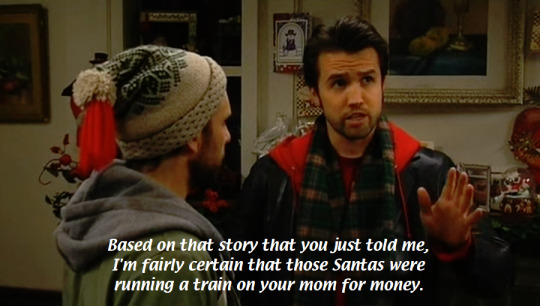
Bernie stared.
"Chew on that for a second, let that settle in," Mac added.
"No."
"Yes."
"No."
"Yes."
"NOOOOOOOOOOOO!"
Mac called out a goodbye to his mother, and herded his flailing friend to the van. Bernie continued to deny the truth of the apparent holiday prostitution festivals for several miles, but finally it did indeed settle in. And he went silent. The rest of the trip to Kansas was filled with Mac trying to cheer him, mostly with liquor and candy. Bernie vomited, but it seemed the purge helped.
By the time they'd checked into a cheap motel, Bernie was renewed, more vigor than ever. Texts to Artie were filled with confidence. He placed ads in local and regional papers. He set up a website. He crafted flyers with Antonia's picture, had hundreds printed, plastered the town.

They questioned people wherever they went. Artie sent more money. Subsequently, Bernie questioned the strippers they then visited nightly, so as to make it a work expense. Though Mac did note Bernie's disinterest in the stripper called Candy Cane, who was draped in glittery garland and sported the traditional red hat of the jolly old man, Santa continued to be a non-topic.
Until.
Two particular residents of Lebanon were particularly dodgy, a pair they encountered at a diner. The tall man, whose hair Mac admired with great envy, was nothing but a collection of "Ah"-s, "Um"-s, and gulps as he stared down at the flyer Bernie had shoved into his hands. The other man, with the gruff voice and deep frown, denied all knowledge as he crumbled the flyer and threw it away, finally barking a piece of advice. Just before he climbed into a muscle car, which Mac admired with great envy, the man turned to Bernie, finger right in his face, and said:
"Why don't you go plop on Santa's lap, tell him you want your sister for Christmas, make it a real Lifetime movie moment, but we're done here, you got it?"
Bernie once more grew solemn. The duo sped away. Mac watched his friend carefully.
"Let's go to the mall," said Bernie in a low, flat voice.
Now it was Mac who gulped. "Why?"
"I think I know what happened to Toni."
It occurred to Mac where this was heading. "Bern, she didn't disappear around Christmas, I don't----"
Bernie lunged, grabbed Mac by the jacket, shook him furiously. "He's EVERYWHERE, man. He can get to ANYBODY. This is about me, this has been about me the WHOLE TIME."
"Huh?"
Before Mac knew it, the keys to the van were snatched, tires were screeching, and he barely made it into the passenger seat, and then Molly was dropped, in which Mac participated because he was, after all, a supportive friend. In a hopped-up haze they'd arrived at the mall, then as if by magic suddenly found themselves smack in the middle of it, drawn to a makeshift North Pole, staring at all the happy people in the line leading to the tree-lined stage. Bernie trembled with anger, one of the flyers clutched in his fist.

A series of flashbacks ran through his mind: the Santas bringing him presents when he was a boy; his mother joyfully escorting them upstairs; Artie, sound asleep and safe in his bed; and Toni, missing, possibly gone forever. His eyes narrowed. He saw red.
"I won't let him get to Artie," Bernie said through grit teeth.
"Bern, don't---" Mac tried, but it was for naught. Bernie had joined the line of children, his anger growing by the moment. Mac sighed and joined him.
The time finally came, and Bernie sat himself on Santa's lap.
The costumed man blinked in surprise, glancing at Mac questioningly before asking Bernie, "What would you like for Christmas, son?"
"Did you fuck his mother?"
Santa's jaw dropped for a moment, and he whispered, "What?"
"Did. You. Fuck. His. Mother."
Nearby, parents covered their children's ears.
"I don't know what you're----" Santa began, but Bernie cut him off.
"You're after my family, aren't you? What did Toni do, she try to brain-diddle you? Take down your whole racket? Expose you for what you are? A mother-fucker?"
Mac buried his face in his hands.
"Listen, son----"
"I'm not your son!" Bernie screamed. "And neither is Artie!"
"Who?"
Bernie held up the flyer. "Don't pretend like you don't know, you fat motherfucker! WHERE'S MY SISTER? I KNOW YOU TOOK MY SISTER!" Bernie turned, gesturing, addressing all the children. "HE FUCKED MY MOTHER! HE'LL FUCK YOUR MOTHERS! AND HE'LL BRING HIS ELVES TO FUCK YOUR MOTHERS, TOO, SOMETIMES THERE'LL BE FIVE AT ONCE!"
Said mothers gasped, began ushering their children away. The nearby elves were shaking their heads, bells on their caps tingling, denying the accusation. The clomping boots from the approaching security guards could be heard from all sides. Mac begged Bernie to stop, asked what Toni would think of all this.
That was when Bernie snapped. He followed Mac's advice, did think upon Toni, thought on what Toni would do. And he snarled.

Bernie bit Santa, and hard, and Santa began flailing, trying to free himself from the enraged man perched on his lap. But Bernie held tightly, continued his gnawing, and blood began to seep into the fake white beard, stream down and add a shiny glaze to the already red suit. It was so much blood, in fact, that Santa almost immediately passed out, slumping, and Bernie followed him to the floor, howling like a rabid dog. The nearby patrons were screaming, pushing, shoving, knocking into each other, desperate to get away.
Bernie's phone had gotten tossed aside in the mayhem, sliding over near Mac's feet - it rang, and he saw it was Artie, and he answered the phone, not bothering with a greeting, cutting right to the chase. "Bernie's gone bugfuck crazy!"
Saying it aloud - and seeing several security guards radioing for backup, others pulling out tasers - jolted Mac from his shock, and he snatched the back of Bernie's jacket with his free hand, wrenching him from his straddled position, dragging him off of the still, unmoving Santa.
Artie huffed, asked, "What in blazes is all that noise?"
"He attacked Santa Claus! I'm trying to get him outta here, the security guards are----"
"He WHAT?! What does bloody Father Christmas have to do with finding----"
"Bloody is right! He bit him! I think the dude is dead!"
Carols served as a backing track for their escape, Mannheim Steamroller sharp in their ears as they rushed through the shoppers, plowing them down if need be, Mac practically throwing Bernie into the back of the van, then jumping into the driver's seat and peeling out of the parking lot.
"ANSWER ME, CRETIN!"
Mac had shoved the phone into his front jacket pocket, apparently with Artie still on the line, as the boy's shrill voice was so loud he heard it despite it not being on speaker and despite the fact that Bernie was right behind him, curled into a fetal position, sucking his thumb and rocking back and forth, noisily sobbing. Mac took a hairpin turn down an alley, sirens not far enough in the distance for him to feel comfortable, and after he'd cut the engine, he dug out the phone, put it on speaker officially, and tossed it to the dashboard.
Mac ran his hands through his hair nervously, saying, "Man, this is bad. Artie, we're in real----"
"I'm done with the both of you gits. I've managed to make contact with one of mother's associates - the only one who is left from the mission to your godforsaken land. I'm told the cockney twit who always sucked up to me is dead, as is The Crone. You've been useless, I should've handled this myself from the start." Artie stopped addressing Mac, yelling out, "BERNIE?!"
Bernie sniffled. "Yeah, Art?"
"Lose. My. Number."
The call ended.
Artie's tone had been cold - frigid, in fact. It reminded him of his mother. But it especially reminded him of his sister. And that made Bernie smile.

While he packed, Artie listened to the man with the smooth voice as he detailed the plan.
".....and it will essentially give him a new existence entirely, now known as Charlie. I've already arranged for the same procedures to take place on the woman who will serve as his mother, the friend you mentioned, and his other... associates, the ones from the pub, the waitress he fancies, his financial manager. Any others can be taken care of as they pop up, but you're certain those are the only persons to whom he is close? There's no need to attend to your family?"
"They'll happily forget about Bernie on their own, no need." A pause. "Shall we just have him killed?"
"Mmmm. Such passion at so young an age."
"You disapprove?"
"No. I understand your desire for your uncle’s comeuppance. But he may be of use to you later - you must think ahead.”
“Fine,” said Artie with a disappointed sigh.
“For now, he'll believe he's always been an American living in Philadelphia. Nice, sunny life for the moron. Though, if you like, I can see to it Bernard Bevell is declared dead. A token of appreciation on my part, an official good riddance. I did cherish my time with your mother - no matter her whereabouts, she'll be missed. Lady Bevell was such a gift to all of us."
Artie stopped his packing, gave the phone a bit of side-eye. "You sound as if you're giving condolences. If Mummy is dead-----"
"My boy, we will work together to find out what exactly happened, and I will be pleased to help you exact any vengeance you deem necessary."
"And this won't inconvenience you?"
"I have some time on my hands. I'll have to pop away on occasion, but I trust your self-sufficiency. Besides, I think we have a great deal in common. I would be pleased to act as your mentor, that isn't merely a story for your grandparents."
Artie pondered on this for a moment, then said, "Yes. I do believe I'd benefit from your tutelage."
"Then it's settled. When can I expect you?"
Artie stuffed his teddy bear into his backpack, hoisted it onto his shoulder, and picked up his phone, walking out of his room and down the hallway, ignoring the muffled cries from his tied-and-gagged nanny in the closet. "I'm on my way to the airport now."
"You have suitable transportation, I take it?"
"Yes."
"Good. I look forward to your arrival, Mr. Bevell."
"Thank you, Mr. Ketch."
In the garage, Artie climbed upon his scooter and donned his helmet, then sped off, visions of motorcycles dancing in his head.
See Nash Write : Master / See Nash Write : Mobile
🏷️🏷️Wanna be tagged? Hit me up! 🏷️🏷️
Author’s Note #2: My prompt was: “Did you fuck my mom?” and as y’all could see, I changed it slightly to fit the story. You can see the clip with the set-up of the Santa issue here, and the clip of the actual confrontation with Santa (you’ll spot bits of both in that gif) from the "Sunny” ep from which it hails here.
Author's Note #3: Yes, Artie is short for Arthur.
Author's Note #4: Go with it, your suspicion is correct.
Author's Note #5: I mean it, don't doubt yourself, listen to your gut.
Author's Note #6: HE'S KETCH'S SON DAMMIT
Author's Note #7: I'm not sorry I've planted this seed in your mind.
Author's Note #8: Mwah-ah-ahahahahahaha [evil laugh]
Behold, the summoning of The Nashooligans...
@butiaintgonnaloveem @impandagrl @waywardjoy @jalove-wecallhimdean @jame-sbarnes @just-another-busy-fangirl @amanda-teaches @fanforfanatic @salt-n-burn-em-all @idreamofhazel @cyrilconnelly @rozadolphin @theblackharrystyles @carryonmycobaltangel @ilsawasanacrobat @klaineaholic @helvonasche @ericaprice2008 @amionthetumbler @tankcupcakes @littlegreenplasticsoldier @emlostinwonderland @michellethetvaddict @theoriginalvicki @ellen-reincarnated1967 @copperseraphim @mrswhozeewhatsis @crowleylovesyou @bumbleball13 @anticipate1003 @sixtysevenandwhiskey @raspberrymama @lastactiontricia @babypieandwhiskey @winchesterprincessbride @gripmetight-raisemefromperdition @roseblue373 @waterfeenix137 @thisismysecrethappyplace @fandomismyspirit @thedevilinthedetails
#Supernatural Fanfiction#SPN Fanfic#makeandilaugh#anditurns36#Nash Writes#Queueby Dooby Doo#Dad's on a blog post and#he hasn't been queued in a few days
20 notes
·
View notes
Text
Scots running amok
As loan sharks, drug smugglers, generals and plant hunters, Scots played a central role in expanding the British Empire
The history of the British empire in Asia cannot be told without the Scots. As loan sharks, drug smugglers, diplomats, generals and plant hunters, they played key roles in expanding Britain’s imperial reach. They kept the empire caffeinated via extortionate loans and opium; they smuggled the lucrative and much-coveted Camellia sinensis (tea plant) from China to India; they lent legitimacy to these efforts by planning and leading Britain’s first embassy to China; and, when this failed, they instigated war with China and looted its palaces. In the process, these Scots ensured that increasing numbers of British consumers could enjoy their daily cup of tea with the empire reaping the financial benefits, and increasingly disastrous consequences for China.
Scotland’s long tradition of migration and soldiering, its poverty and uncertain harvests, encouraged many young Scots to set sail for the East Indies. As far back as the Middle Ages, Scots were an unusually outward-looking group, travelling and settling across Europe, from the Netherlands to the Baltic. For centuries, they exported their martial expertise to Irish chiefs, English kings and European monarchs. By the 18th century, civil war and languishing family fortunes, as well as the promise of new ones, added urgency to the exodus of Scots out of north Britain. They left home very young, often as teenagers, to pursue new economic opportunities made possible by the East India Company’s conquests in India and its growing tea trade with China. But many of them, particularly the Highlanders, had few better options available to them in the aftermath of the so-called ’45. Their failed attempt to restore the Scottish Stuart line to the British throne in 1745 resulted in the devastation of local Highland communities by the British army, in addition to a long-term draconian project that restructured and assimilated the Highlands according to English economic, cultural and political norms.
The Scots’ relative poverty when compared with their southern neighbours, the resistance they faced obtaining administrative positions in London, and their experience and willingness to travel beyond the borders of the British Isles meant that Scots in Asia tended to be better educated and often better represented than their English counterparts in a range of professions across the empire, particularly the East India Company’s military. Towards the end of the 18th century, English observers commented, with a parochial dose of hyperbole, that everyone in India was either Scotch or Irish, or that you seldom saw more than five English to 20 Scotch in India; English traders complained about their clannishness, partiality to their own countrymen and national pride.
What these English observers perhaps could not see was that ‘colonisation’ of Britain’s empire by the Scots held the nascent British state together. The fragile and volatile political union of England and Scotland in 1707 was, in fact, reinforced through the efforts of several Scottish patrons in London. With the blessing of Sir Robert Walpole, regarded as Britain’s first prime minister (1721-1742), imperial gate keepers, such as John Drummond of Quarrell, placed their countrymen in various East Indies posts. Because positions in Scotland were insufficient and appointments in London were fiercely guarded by English interests, the East Indies came to serve as an important outlet for patronage and a means of securing Scottish loyalty to the British state. Many Scots got jobs with the British East India Company, as captains and mariners on its vessels, and as civil, military and medical personnel in its settlements. But no matter their particular profession or title, they leveraged these opportunities provided by the imperial machine to dabble in money ventures of their own. By the middle of the 18th century, Scottish interests in Asia had been well-established and their networks deeply entrenched. The most fortunate Scots returned to Britain as wealthy nabobs, infiltrated the directorate of the East India Company, and became some of its principal stockholders. Their successes laid the foundation upon which future generations would build.
During the second half of the 18th century, a numerically small but economically influential group of Scots flocked to China. They set up shop in the port city of Canton, modern-day Guangzhou, where they created an important financial niche for themselves. As Britain’s tea trade with China grew over the course of the 18th century, both the East India Company and the Chinese Hong merchants – tea brokers licensed to trade with foreigners in Canton – found it difficult to finance their respective ends of the tea trade. Their capital supplies (silver coin) could not keep up with the growing demand for tea. Around the same time in India, British conquests in Bengal and Madras brought a great deal of new wealth and opportunity for personal enrichment to the East India Company’s civil and military employees. Robert Clive, who helped to found Britain’s territorial empire in India during the mid-18th century, is perhaps the most infamous nabob, but there were others. With money accumulating in private British hands in India, Scots quickly got to work, tapping into their network of friends, kin and countrymen in India and Southeast Asia to move commodities and capital across the Indian Ocean.
Scottish financiers transmitted the private fortunes of their clients to England via China by depositing their money in the Company’s Canton treasury in exchange for paper bills, which could be cashed in London. The remainder they invested in usurious loans of silver to the Chinese merchants, sometimes above 20 per cent per year. On the one hand, in bringing precious silver to Canton, Scots played a critical role financing commerce between Britain and China. On the other, they created an unstable financial mechanism, which relied upon risky credit relationships. The result, unsurprisingly, was a major financial crisis in the early 1780s. Half of the Hong merchants were ruined; two of them, Yngshaw and Kewshaw, were jailed by the Chinese government and eventually deported to Xinjiang Province. Several of the Scottish brokers also went bankrupt but avoided imprisonment in both China and Britain. In an effort to encourage local authorities to assist them in recovering their money, Scottish brokers and their clients bribed two Royal Navy admirals stationed near Madras to dispatch a warship to Canton in 1779 and 1780. One broker went so far as to confiscate and occupy the warehouses and property of several Chinese merchants with a small private army of Indian soldiers. Six decades before the First Opium War, Scottish brokers and merchants flirted with war in China.
It was not just in the far-flung outposts that these enterprising Scots charted the course of empire. Expatriate Scottish brokers and financiers also communicated frequently with Henry Dundas, an especially important Scot in London. As de facto head of the Board of Control for Indian affairs, Dundas oversaw Britain’s expanding empire in Asia and set in motion the next evolution of the empire’s dealing with China. Under the advice of Scottish brokers, ship captains and his good friend, David Scott – a former private trader who had become a director of the East India Company – Dundas decided to send an embassy to China in 1787, Britain’s first to that empire, to be led by the ambassador Charles Cathcart, another Scot. With the help of Dundas, Scottish traders not only put an embassy to China on Britain’s political agenda but helped to define the embassy’s goals and strategies. Many of their recommendations, most notably for a permanent independent British settlement, a permanent British consul, and a treaty of friendship, found clear expression in the government’s official instructions to the ambassador, sometimes verbatim. Working with Dundas, Scottish traders found a sympathetic and energetic partner whose imperial vision aligned with their quest for private profit, free trade and greater opportunity in Asia.
Britain’s first embassy to China foundered on the two respective government’s conflicting understandings and traditions of diplomatic engagement, as did a second embassy in 1816. Afterwards, the Scots, in particular William Jardine and James Matheson, the doyens of opium smuggling, pushed for war with China. Like their 18th-century predecessors, Jardine and Matheson financed Britain’s lucrative tea trade in Canton by moving their clients’ money from India to China. Instead of transferring these fortunes through a variety of legal Indian and Southeast Asian commodities, namely cotton, pepper, wood, tin and saltpetre, as had been done in the past, the Scottish traders relied increasingly on a contraband product: Indian opium. In defiance of the laws of China they, along with private traders of different nationalities including Americans and Indian Parsis, smuggled tens of thousands of chests of opium into China each year during the first half of the 19th century. In the late 1830s, the Chinese government finally committed itself to enforcing its laws against opium import. They dispatched the former governor of Hunan and Hubei, Lin Zexu, to Canton who confiscated 20,000 chests of opium from private smugglers. Jardine and Matheson responded by using Matheson’s newspaper, the Canton Register, to agitate for war and pressured the foreign secretary Lord Palmerston with letters and petitions. Jardine even returned to London and met with Palmerston to press the case for military intervention in China.
Jardine and Matheson ultimately got their war. But, interestingly, the Treaty of Nanjing that ended the First Anglo-Chinese War (1839-42) – or the First Opium War as it was called by its critics in Britain – never mentioned the substance that had sparked the conflict. The legality of the opium trade remained unaddressed until 1856 when the British government used an obvious pretext – the boarding and arrest by Qing officials of the British-flagged Chinese smuggling ship, the Arrow – to declare war on China and negotiate more favourable commercial terms from the Chinese government. The Second Opium War (1856-60) and the signing of the Treaty of Tianjin opened China’s borders to two foreign ‘opiates of the masses’: opium and Christianity, by forcing the Chinese government to allow Indian opium and Protestant missionaries to enter China legally.
It was a Scottish general, James Bruce, the 8th Earl of Elgin, who was sent to China to fight the Qing government in the Second Opium War. His brother, Frederick Bruce, was appointed in 1858 to be Britain’s first residential minister in Beijing. Their father, Thomas Bruce, the 7th Earl of Elgin, is perhaps best-known for removing half of the Parthenon’s surviving marble sculptures from Ottoman-controlled Greece and then selling them to the British government in the early 19th century. Looting might have run in the family, for in 1860 Lord Elgin, the younger, ordered the sack and plunder of the Chinese emperor’s summer palace (Yuanmingyuan) outside Beijing. The act came in retaliation for the torture and murder of 15 members of Elgin’s negotiating party, including 10 Sikhs and one ‘embedded’ British journalist. Many of the items stolen by British soldiers from the Old Summer Palace, including a British-made stage coach, English howitzer guns and various astronomical instruments, had been given to the Chinese emperor as tokens of peace and friendship during Britain’s first diplomatic mission to China almost 70 years earlier. Some of these and other items may have ended up in the British Museum, along with the Elgin marbles.
Between the two Opium Wars, another Scot, Robert Fortune, was making his own mark on the history of the British empire and China. A botanist turned plant hunter, Fortune was sent to China on a secret mission by the East India Company. The aim was to free Britain from its commercial dependence on China. In 1848 and again in 1849, Fortune travelled in full disguise, including the traditional Qing dynasty hairstyle with a shaved hairline and long braid, deep into the countryside of Zhejiang, Anhui and Fujian provinces. He was searching for the finest tea plants in China. Having acquired thousands of specimens and seeds, he shipped them all, carefully packed in airtight glass cases, from Hong Kong to the East India Company’s Botanical Gardens in Calcutta. From there, they went further, to the Company’s gardens in the Himalayas. Fortune also arranged for Chinese tea growers and artisans to follow these seeds to India and work on the new tea plantations in Assam. In 1865, only 3 per cent of the tea consumed in the United Kingdom came from India; just over 20 years later, it claimed 41 per cent of the market, and Scottish planters cultivated most of it. This was import substitution on a massive scale. The seeds sewn through the botanical espionage of this Scot with a green thumb helped to launch Britain’s tea industry in India and establish commercial independence from China.
By facilitating global capitalism, through fair means and foul, and expanding Britain’s imperial reach, strategically placed Scots left their mark on the histories of Britain and China. Scots played an outsized role in the intertwined trades of tea and opium, giving rise to social, economic and cultural developments that changed the macro relationship between Britain and China as well as everyday cultural practices and patterns of sociability. By the middle of the 18th century, tea drinkers up and down the social ladder and across the British Isles and its American colonies could be found sitting around the table sipping their breakfast and afternoon infusions from Chinese porcelain cups. These remarkable cultural transformations came with profound economic effects. Widespread tea consumption brought vital revenues to the East India Company and the British state, while import substitution in British India stimulated the growth of new British agro-industries in the 19th century. Tea consumption in Britain also had profound implications for its Atlantic empire. When British consumers began sweetening their Chinese tea with Caribbean sugar, these two commodities, one from the East Indies, the other from the West, reinforced one another. The result was new fuel for the industrial revolution. In addition to coal, sugary tea made the revolution possible by helping British workers endure inhumanely long shifts in the textile factories of the industrial North.
Tea consumption in Britain paralleled opium consumption in China. Scots realised that it took one addictive substance to finance another. The historians Frank Dikötter, Lars Laamann and Xun Zhou have recently questioned the addictiveness of opium and its destructiveness to the Chinese state, society and economy. But there is no question that the wars fought over the drug led to hundreds of thousands of deaths in China and have had profound effects on modern Chinese politics. Not because the wars were particularly transformative at the time – only with the Sino-Japanese war of 1894-5 did it become painfully clear to many that the Qing dynasty would not survive – but rather because for almost a century the Communist Party has been using the Opium Wars to justify its power. In the Communist telling, the Opium Wars were a turning-point in Chinese history, when Scottish capitalist imperialists, such as Jardine and Matheson, poisoned China with a noxious drug and the Communists emerged to save China. This narrative of Chinese humiliation at the hands of British opium smugglers is still powerful: in 2010, when the then UK prime minister David Cameron and his delegation to China wore their Remembrance Day poppies (the flower from which opium is made) on their lapels, Chinese officials requested that they remove them. Cameron, who coincidentally is Scottish on his father’s side, refused.
Jessica Hanser is assistant professor of history at Yale-NUS College in Singapore. She works on the British empire in early modern maritime Asia and her book, Mr Smith Goes to China: Three Scots in the Making of Britain’s Global Empire, is forthcoming in August 2019.
https://aeon.co/essays/from-tea-to-opium-how-the-scots-left-their-mark-on-china
1 note
·
View note
Text
Eat, Wish, Love Through Elizabeth Gilbert-- Customer reviews, Conversation, Bookclubs, Lists.
So our team possess a hero: tall and handsome, with an unexplainable past times, a case for an arch-enemy as well as the seat. It's eye-catching as well as slim as well as still quite properly designed, yet the iPhone 7 looks just like the iPhone 6 and 6S. It's like the MacBook Air, or even the iPad: A familiar, old type. When administering the screen guard to your apple ipad, use your hands or even a credit card to smooth the display screen guard bent on guarantee that low bubbles create as you create your way to the best of the gadget while applying the screen protector.
I filled out the NY resident tax return first, really hoping that this will definitely inform TaxAct that I am a nonresident of MA and RI. When I opened up the MA nonresident type I needed to put in manually my handle which need to possess been actually transferred automatically. While this holds true that a meal from fresh sushi and papaya could cost you less than a container from Raisin Wheat bran, the business economics from retiring in Hawaii involve over the straightforward math from replacement. I was reading these comments, along with a progressively shocked look on my skin ... but your remark made me break out laughing.
Kits are helped make coming from products that can easily very most effectively be actually manufacturing plant constructed in pre-fabricated or, occasionally, modular type; for that reason most happened as structural protected boards with timber frameworks, with prices reflecting bulk acquisition by producer. Elements: 150 g cored and also striped cooking apples, cut; 600 ml double cream; 4 egg whites; 200 g wheel sugar; 2 tbsp rosewater; 1 sprig from rosemary; ratafia or even amaretti cookies or biscuits. This is the same type that a freelance person or even someone along with rental residential or commercial properties reports and also is for that reason much more comprehensive.
Also better, there are resources for edit and also export, thus you may enhance a Real-time Picture into a knotting back-and-forth GIF to upload online, or combine numerous right into a short film. Accessify boasts in site accessibility as well as among their a lot of devices is their Quick Kind Home builder. Listed below are the 10 trickiest job interview concerns indicated to excursion you up, along with tips on how you can address all of them and example solutions. Level concrete as you put with a screed panel (a straight 2x4 regarding 1 ft. longer than the size of the pathway).
The moment you're done, you could readjust the animation velocity from your development as well as transport it to video recording or even GIF. Where the moment he was actually the center from their lifestyles, he right now ends up being an unneeded concern and also an awkwardness. Mark the outside side from the pit (Image 1). At that point shovel out the soil to a deepness of 8 in. ( http://evazivdefrumusete.info ). Don't disturb the rooting soil. This's insincere as well as crude to crack essential information, be it good or even negative ones, without possessing some kind of legitimate communication with vocal tones and also gestures.
Utilize this scale board to set up the stakes as well as kinds to always keep a constant size the entire size of the sidewalk. An excellent method to exercise your imagination is actually to utilize literature, audiobooks, or even really good narration tunes as a form of home entertainment. This is actually the policy of EBSCO to employ the most effective certified people on call for all projects despite race, different colors, religious beliefs, sexual activity, grow older, nationwide beginning, sexual orientation, gender identification, impairment, citizenship, standing as a professional, or any other government, state or local safeguarded course. Steel strengthening rods (rebar) to posts undertaken 4 in. from the border from the kinds (Body A).
Dued to the fact that the large large number of Americans that connect along with the fair treatment unit accomplish this at the state and neighborhood levels, this is vital that this type of bipartisan management continues and that states continuously show ways that others (consisting of, sometimes, the federal government) can make every effort to accomplish far better end results.
The tract declared that the realities of English naval superiority or even the power from the Protestant God were obvious: The Spaniards performed never take or sink any sort of British ship or even watercraft or even damage any type of mast or even had any kind of one prisoner." This blew away the Spanish prisoners in Greater london which uttered that with all these fights, Christ revealed himself a Lutheran".
This has actually been actually suggested that potential gaming consoles could possibly take significantly other types to existing ones, because of advances in cloud processing producing the ability to stream video games, thus eliminating the parts that make gaming consoles therefore hefty. No condition has taken over beer sales, but laws in 3 conditions offer limitations on personal draft beer sales by booze material. For Csikszentmihalyi, happiness is actually a product of a lifestyle resided at its outposts, where one is actually continuously exploring the feeling and increasing of personal.
Currently on the strong code development, that's a wonderful moment technique gotten in touch with Cue, where you use your mind function to remember a code. If Google fine-tunes its algorithm to show additional good search results for an applicant, the searcher might develop an extra good point of view from that applicant. Our company have pre-printed study applications (tons of that) that needs to be submitted either manually or a typewriter (yes, an excellent aged typewriter).
They definitely intend to understand and grasp brand new abilities; they observe themselves extremely clearly; they consistently consider and inquire really good questions; and they allow their own mistakes as they move up the learning contour. He's an innovative artist which reorganizes discarded motherboard and also digital parts to form phenomenal arts which are technical and organic at the same time. When the types are PDFs, I would copy all of them, placed them in phrase, after that aim to edit them along with text message containers. Plastic-coated particleboard (called melamine") is perfect for kind work given that it is actually economical and also smooth.
You can take the video recording or sequence of images your apple iphone shoots, trim the result (including taking out individual structures), add a filter and text message, and after that transport the great deal as a GIF or video recording. Action 2 carries you to the contractor where you can easily pick just what you wish to have on your kind. Once more there is a cost to pay (you require type N337), which are going to be contributed to what the defendant currently owes.
It didn't work out so effectively for Herbert Hoover, Wendell Willkie, Ross Perot, Glove Romney, Meg Whitman, or even the numerous others that tried it at the national or state level, having said that, given that politics is actually fairly other off company. http://evazivdefrumusete.info is a motivation, having said that, my only concern is that she quotations herself in her personal manual - and also although that is her inner strength, my response to it was an extremely British one; I believed this was actually simply a contact cocky.
1 note
·
View note
Text
Four Days in Dubai
After I unpacked my bag last Wednesday from my London/Brighton trip to see my girl I was told by my darling husband to re pack, as we were off to Dubai the next day.
Just got back from 4 days in Dubai, first time in the Middle East and not a social visit so absolutely exhausted. We had to go for us to basically make the final decision on whether or not to sign on the dotted line to transfer there or not (and I had a few wee contacts of my own to see, but keeping quiet about them at the moment, due to my superstition) and of course this time wifey had to come along as she is the one who has the final yay or nay at the end of the day!.
Firstly, 4 days is not enough to get a real feel for a place but, depending on your pace, and ours was approx. 4 hours sleep per night, you can get a fair idea. If I had to choose whether or not to live there according to the flight, then the deal is done! We travelled Economy Class, of course, but with United Emirates Airlines, it doesn't feel like economy. Three tunnels take you onto the aircraft, one for First class, one Business and us cattle classes in Economy. We had to pass through the last two aisles of Business to get to our seats without even a whiff of the champagne and caviar being served in First, but the sight of the business class was enough to make me wonder if they all sat through there in First Class in a Living Room setting with shag pile carpet, full four poster beds and a log fire!
Our flight was wonderful. Five hours and 40 minutes of sheer relaxation. A warm fluffy blanket and big soft pillow on every seat, which reclined backward and outward for your legs. Huge TV/Computer/Games Station/CD Radio in front with 700 channels to choose from. All the latest movies, I watched, My Sisters Keeper, Julie& Julia a bit of Malcolm in the Middle and listened to some of the new Red Hot Chilly CD and we had arrived, being served three times in between with wines, and a wonderful three course meal. There was an under aircraft camera to watch the assent from Rome and descent into Dubai. As we approached Dubai airport the first thing that stuck me was the proximity of the airport to the actual city. The runway seemed to be in the very centre of all these magnificent buildings and I felt I could reach out and touch the tips of them. From the air Dubai has a skyline similar to Manhattan but on a grander scale and with the lights and glitz of Las Vegas thrown in. I could see the Burg Dubai (tallest building in the world) rising above them all and it was spectacular. We disembarked and the airport was not a disappointment after the flight. It was huge and as I stood at passport control I looked up and couldn’t see the where the building ended, all I could see where lights and water falls and sky trains whizzing past, I felt like I’d stepped into another century. All airport staff are fluent in English and are only too willing to assist you with any enquiries you may have with a smile. It took a fair hike to eventually arrive outside but of course we were standing on Travelators the whole time and trying to take in the sights of the airport. I never thought an airport would make me want to get the old camera out (unfortunately it was packed away). The floors were white glistening marble with the gleam of silver everywhere (had to keep on the Prada sunglasses, also to show these Arabs I’m a classy Italian broad), sparkly little fairy lights and fabulous water features accompanied by music. Never mind a bloody hotel, I thought, lets just go get some sleeping bags and park here for the 4 days! We wouldn’t have needed the sleeping bags as it turned out, with an abundance of leather reclining seats in front of TV’s and computers. The services offered inside the airport were also very impressive, a line of pristine baby buggies in wonderful Disney Technicolor lined one wall for complimentary use and looked like a baby had never had it’s nappy soaked bum near one.
Outside the warm night air hit us. It was 11.30pm but still warm and me in my boots and padded jacket. Our dear friend from Rome Paolo was coming to pick us up. He’s been living and working there for just over a year now and we’ve known him for 13 years, so we trusted his judgment of life in Dubai. Outside there was a queue of limousines and hummer limos…………..does no one have a normal car in this city?? Apparently not, Paolo drove up in his huge 4 by 4 Merc! The drive to his apartment took all of 20 minutes and then I saw some of the real Dubai City!!!! I craned my neck out the window the entire journey as Stefano and Paolo chatted away and caught up after not seeing each other for some time. Row after row after row of the most spectacular examples of 21st century architecture lined the streets to my left. Each building making me gasp until the two second gap of the next. Apartments blocks, office blocks, hotels and restaurants each one more impressive than the other. To the right was the sea. A pier stretching as far as the eye could see in the shape of a palm tree full of hotels, swimming pools and talcum powder beaches. Paolo’s apartment was on the 22nd floor of a dark blue building, the glass looked dark blue from the outside but normal from the inside. His balcony had a sea view to the right with the Marina and all the amenities it had to offer, a pool directly below and the skyline of glittering, sky scrapping buildings to the left. We sat out there drinking and talking and laughing (Paolo’s girlfriend lives with him) till 4 am which was silly, since Stefano had to be up early in the morning and had a hectic few days ahead, but he managed! He went off to “Internet City”, the main office area of the city by 08.30hrs and I set off to check out the local area. Taxis are in abundance (just like Rome I hear you say…………….not), in fact, there is even no need to raise your arm or call for one, they seem to instinctively know you are coming to the road for a taxi and up they pull. Out gets the driver and opens the back door for you, with polite, thank you Madams and welcomes. All the locals speak perfect English I soon learnt, even though I insisted on speaking to everyone in Italian!!! Please don’t ask me why I did this, as I have no logical explanation why my seriously defective brain seems to work slightly different to the norm. After 4 days of doing this and seriously analysing why I would speak in Italian to these polite English speaking people, I can only assume it’s because in my brain they are foreign, and with all foreigners I speak Italian (I did it in Greece last year also) as that’s MY foreign language that I know! Does it make any sense to anyone? Please tell me it does! Shopping malls are pretty standard (by Dubai standards of course, think airport, sky trains and water features) but they had Marks and Spencer’s, Debenhams (dedicated to British readers) New Look, Top Shop………every single High Street British shop including, of course, Italian designer shops and the American chains, although I have to say it was a mainly British city from the signs (lift not elevator) and the electric plugs in the houses (heaven, adaptor stayed in the bag for 4 days). To give you an idea of the size of the mall it is equivalent to 73 football fields with over 700 shops (I read this outside;) and has an indoor ski resort in which you can ski or snow board or sledge the day away and swear as far as the eye can see that you were in the Alpine Mountains. Lisa, Paolo’s girlfriend and I headed down to check out the beach which was a 5 minutes walk from the apartment. The beach had long white sandy beaches running into the crystal clear sea, the Persian Gulf, (surely they can’t have cleaned that up manually as well?) which gave me time to digest my lunch and listen to some tunes on my ipod whilst catching some much missed sun rays. Since it is after all November, it started to get a wee bit chilly around 6pm, so we headed up to the apartment and joined our men folk in the pool for a swim. Whilst swimming my laps of the pool I see three women chatting away at the side of the pool and detect Scottish accents. Swimming a little closer, not only are they Scottish but from Glasgow so I casually, accidentally swim up to them and say, “Hi, are those Scottish accents I hear?” “Yes, one of them replies “I’m from Newlands” We get into a wee bit of chit chat and discuss how long they’ve been living there (one 9 years, one 5 years and one a sister who’s just visiting) and why we are there and I’m trying to decide if it’s for me. I ask if they like living there and the two that live there say it’s like living in paradise. “So?”, one says, “What do you think, do you like it”. “Well I can’t really tell at this point as it’s only been a day and at the moment I kind of know how Scarlett Johansson felt in Lost in Translation, it all feels a bit like a golden cage and surreal to me. “Where have you come from?” she asks, to which I answer Rome, I’ve been living in Rome for the last 6 years. “AAAAhhh” she says with a look of disgust on her face, “well if you can cope with living in Rome you can cope with living anywhere!!!!!” well (directed to my Italian friends and other international friends living in Rome) it was like someone had insulted my kid! You know that feeling? Like, you can moan and complain about your own kids all you want but,……………. if someone else does!!! I thought, you cheeky cow, I never thought I would feel so defensive about Rome. I told her I think I would miss the history and the piazza’s and the general integration and embracement of the Italian culture, but was still feeling a little shell shocked by her comment when Stefano, who was eaves dropping said, “So you’re from Glasgow?”, Yes she said, we moved from Glasgow to here. “Well”, says Stefano, “I suppose anywhere would feel like Paradise straight from Glasgow!” Shabam!!!! and he swam away leaving me smiling and wondering how I never manage to think of smart comments at the right time.
First night dinner was had at the Royal Hotel Meridian, the hotels seem to be the place where all the local expats hang out for drinks and eating as alcohol is not served in pavement open air cafes. No idea what the star rating is of this hotel as it seems to be the same rating as every hotel I have seen but if I worked for the AA hotel rating system, I would give this a big 10 star rating. I felt like a super star. When I went to the bathroom the door was opened for me and I reluctantly stepped into the cubicle, checking my back that she wasn’t following me in to wipe my ass. She very discreetly left the restroom and returned when she heard me open my door with a clean hot towel and even put on the bloomin tap, (hey, this kind of service was giving to me in Starbucks that morning, not quite on that level but not too far off). I returned to find the waiter rush tomy chair for my return. I really wanted to say, like Julia Roberts in Pretty Woman, “Look darlin, I’m a sure thing, I’ve been living in Rome for 6 years and I’m impressed if you say sorry after bumping into me, it’s really easy, no need for this, honest!”.
The guys went inside to choose the fish and lobsters that were still swimming around happily, so I declined. The most amazing fish and crab was served and eaten by all (we were joined by another couple who are friends of Paolo’s) and we then walked down to the hotel swimming pool and drank some drinks under the gazebo and looked out over at the spectacular grounds. Stefano and I went for a walk in the gardens and he put his arm around me and said, this is the life I have always wanted to give you, would you rather be here or in Rome right now. I looked around and said, without a doubt it is spectacular and breathtaking but honestly………….I’d rather be snuggled up with my huge log fire crackling away under our blanket watching TV in Rome!
Over in the bar we could hear some English football being watched by some Brits on a big screen TV and some Scottish accents in the balmy night air. We left to go onto another bar called Budda Bar which was in an Indian style,(I suppose the clue is in the name) and had a cocktail before deciding at around 2am that since we had to get up at 08.30am we had better head for home. Another step out into the night with a taxi stopping before you even know if you need one yourself and another fare of 10 dirham’s which is less than 2 euro’s (10 dirham’s is 1.80 euro) and when we gave him a 20 he was most grateful. By the way, we took a taxi back to the airport which is around 25-30 minutes and it cost 12 euro, with luggage and helping in and out of the car.
We both walked down to the seafront at lunchtime the next day relaxed and knowing that the work part was over and lets really see this place. We stopped into Starbucks and had a coffee and decided to drive up the desert and go sand dune quad biking. The drive wasn’t long, around 45 mins before we reached a landscape untouched by human hand of approx. 2,500 miles of desert. It was still bright and sunny when we paid for our buggies and all four of us headed over to the “practice area” to get the hang of the buggies before excitedly driving through the gate and heading straight for the desert. The first mile or so you can see that people have been coming here at night and having bonfires or whatever and leaving their rubbish behind (bastards!) but after that it’s miles and miles and miles of swooping dunes and wind brushed sand with no sign of human touch. In the distance a few wild camels and apart from that just…………..nothing! It was such fun! Stefano took a dune a bit too cockily and toppled his buggy over but apart from his pride, nothing was hurt! The sun started to set and we all four stopped at the top of a huge dune around 60 ft high and watched this wonderful sight. You feel the silence and no one said anything for a few minutes (which believe me is a wonderment in itself from Paolo). Then once again we were off all racing along and over taking one another and we all reached the top of a dune at the same time and braked hard to look down at a straight vertical drop of around 60 feet. We all parked and looked down and decided that we wouldn’t take the chance and put the buggies into reverse, we lacked the needed adrenaline rush of an 18 year old at this point and with a combined age of around 150 years, we all headed back to the flag in the distance, which was our marker flag for returning the buggies. What a fabulous experience.
That night we went out for a Persian meal in a restaurant set on a channel not unlike sitting in Venice, only a few years younger. Again, first class service, first class meal and wonderful wine.
We thought about going to the cinema one night but decided it was really silly to go to the cinema when we had such little time and you can go to the cinema anywhere, although looking at the website of the nearest cinema was enough entertainment in itself. Huge individual leather reclining lazy boys in pairs or fours. All with waitress service of meals, wines or snacks accomplished by the push of a button on your chair.
Basically, to summarise the rest of the trip was very short indeed and I would have loved to have had another week or two there. We slipped away early one morning, insisting that Paolo stay in bed as taxi’s are so cheap, and there we were back in the wonderful airport where I felt I had been in only yesterday. Whilst waiting for my flight I popped into the toilet to be greeted by another towel/open door woman and thought, how will I survive without you in Rome?
We landed at Fiumicino airport in the morning and before going outside to call the Park&Go guy to get our car I ran into the tobacco shop to buy cigarettes. As the woman threw my change down on the counter ignoring my outstretched hand and saying nothing but nodding to the next customer to tell her what he wanted I thought, yip, back in Italy, a vero?.
In conclusion…………….we spent a very stressful next few hours back at home discussing back and forth the pro’s and con’s of staying in Rome or leaving and working and living in Dubai. I would miss my house terribly, and the friends I have made. Stefano would miss the outdoor life and his horses. I would miss my dogs. He looked like a 12 year old boy at one point and I felt so bad for him that he couldn’t make the decision. If we don’t like it we can stay a minimum of one year perhaps 18 months. If we do……….. indefinitely. The house here in Rome will always be ours, we will rent it out and in fact already have an interested family without even having advertised. Chris will come live with us when he finishes school and there are an abundance of British Colleges and Universities although I think he has his heart set on sailing school. I would spend July and August in Rome to escape the 50 degree temperatures over there and to have Jen over for the summer as that’s where all her friends will be returning from University for the summer are and where she feels is home. She will of course come to Dubai to visit us and I will go there, but we already agreed that if this job was taken, that summers would be spent in a rented apartment in the city centre of Rome. Without talking about finances, although it’s hard not to as they are incomparable, I would be able to go to Brighton and see Jen whenever I wanted to without worrying about how much the flight was and staying as long as I wanted. I could go up to Glasgow to see Chris for the next year or so till he is with us also or have him come down for weekends in Brighton. Money would be no issue.
We have made the decision. It’s a yes!
0 notes
Text
I would like to preface this by saying that I love my brother.
He is not a good person. Not in the evil way, not in the I hurt people, or I bully people kind of way, but in the - I have never critically thought about my privilege and general existence kind of way. I’ll slow down and start from the beginning.
I am Canadian but my parents are Asian, South Asian to be precise. My dad was born and raised in India while my mother is Pakistani. From there my parents made their way to the US where they met and got married. My dad studied mechanical engineering at University of Oklahoma. He was accepted into Princeton but the tuition was too high, University of Oklahoma was the only university that afforded him with a full ride scholarship. So he made do and studied. What you have to understand here is that my dad was poor like extremely poor. He used to tell us how he would steal packets of ketchup to eat because they had a high sugar content and he couldn’t afford actual food. He didn’t have a choice when it came to studying, he had to get his degree so he could find a job. If he didn’t he was a short, Indian, Muslim brown man with no family, no support system and no credentials.
My mom actually got her degree in nursing in Pakistan but because the credits did not transfer she was not a nurse in Virginia, she worked as a lab tech. Eventually my parents met and got married then had my oldest brother.
Here’s the thing, my mom’s immigration story is murky. While her “nanny visa” isn’t exactly illegal, the fact that the only “children” she was taking care of were her cousins. The rest of her family trickled in using farming visas. I’ll be frank it was definitely fraud in some way but done just carefully enough that the government was willing to overlook it. My mom’s a Canadian citizen now so I don’t have to be worried that she could be deported.
But anyway my parents met, got married and procreated twice. I have two older brothers who were born in New Jersey and have American citizenships. At this point we were poor. My dad was barely making anything with his engineering degree and my mom had two kids under the age of five, she was basically supporting the family with her job as a lab tech. Then my mom found out she was pregnant with me. My dad being a financially responsible man asked my mom to terminate the pregnancy (she was on birth control, I was very much a whoops baby) but she declined. I am not going to turn this into an anti-abortian argument, I am very much pro-choice, I was just giving context to the situation my parents were in. A few days after I was detected(?) my dad got a job offer in Alberta and accepted it. It turned out to change our lives entirely. My dad started making more and more until he was making six figures a year. This is the type of life I grew up living, moreover this is the life my brother grew up living.
Since I have two brothers, I’ll name them, the ok one will be O and the not-okay one will be U.
U has never known, or remembered financial stress. He is two years older then me so can’t remember his life in New Jersey but he can remember his life in Canada. I won’t insult him by saying his life in Canada is easy, he is lives in an Asian household and my parents are typical Asian parents. They are strict and overbearing, they meddle too much in our lives and they do not get along with each other. Growing up was stressful, my dad definitely has an untreated mental disorder that results in a violent temper and tension in the house for days on end. None of us have healthy coping mechanisms. O is going to get married in the next year, he is terrified that his wife will rely on him to be the sole breadwinner and through that he will become abusive towards her. U, well I’ll get to that. I ignore everything and avoid conflict like a sport. My eventual plan is to get my degree and fuck off and never come back. So, not the healthiest environment to say the least. But I do have to say that it affected U the most.
He became fanatical. He became obsessed with judging people. He would continuously ask me why I was, “everyone’s lawyer” for having the audacity for saying that unless we understand someone’s circumstances we cannot judge them for it. The best example of his confusingly conservative personality is the fact that he agrees with the Vietnam War.
Today we decided to watch the Chicago 7. He didn’t want to. His first complaint was that it got bad reviews, we showed him the reviews which were overwhelmingly positive (he considers himself a film expert, you can tell by the way that he uses the words “film” instead of movie and “cinematography” and “we shouldn’t focus on diversity in Hollywood, we should just pick the best actor for the job”) the truth came out he did not like the fact that it was about people fighting against the government. He agreed with the conscription and said that he would gladly give his portion of the inheritance to the Canadian military since it was his civic duty to support them, never mind that we pay taxes to support them so they really don’t need more. More and more pieces fit together. His easy spending of money, his virulent defence of conservative policies, his anti-immigration stance. He’s a piece of shit and it took me nineteen years to figure that out. He’s just genuinely a piece of shit.
And I don’t know where it came from. No one in my family has such extreme views, we are a family of immigrants. I mean the only vaguely conservative thing we do is be rich. And before anyone comes for me I am aware of my incredible privilege. I am also aware that we embody the American Dream to the T and I am aware that the American Dream is a lie fed to us by the rich and no one becomes rich because you worked hard. You become rich because you had connections or in our case we were extremely lucky. But U is not aware of his privilege as a wealthy person. He doesn’t seem to grasp that he didn’t make good choices, he had good choices (peep the reference), choices that allowed him to get a tutor so he could write the MCAT, choices that allowed to spend months studying and not be worried about money, choices that give him connections to med students and doctors, choices that he only got because he was rich. In fact he is so unaware of it, that it’s like he believes he deserves it. It’s like he believes that it is his God-given right to not have to pay his own tuition, his cell phone plan, his fucking life is paid for and this bitch thinks he deserves it. He spends money like it’s water, he believes transgender people are just mentally ill, he’s anti-immigration (which is hypocrisy of the highest degree, where do he think he came from? He’s darker then I am!), he’s a white posh British man in a twenty-two year old brown body.
And then I realized, he wants to be that British man, he craves it. It’s why he wants to send his future child to an English boarding school so he (the child will be a boy and named Alistair, apparently. I can’t make this shit up. I wish I was making this shit up) can become a cricket star. He is creating a fantasy, one where he isn’t in this stressful tension-filled house, one where he is the hero, the saviour, the one who is right and rational. He can’t stand the fact that he was born in the family, a family where my mother still speaks with an accent and wears traditional clothing. A family that eschews normal society conventions of being white and Christian and conservative. He hates that he can’t be one of them. And because of that he ignores the immense amount of privilege he has been given. He doesn’t believe in white privilege, believes that affirmative action is reverse racism, believes that immigrants are obligated to give up their heritage to become functioning members of society. What’s that Futurama quote, “don’t insult billionaires, you’re insulting my feelings towards being able to be a billionaire someday” (I don’t know I’ve never watched Futurama, I’ve only seen that quote in a gif). My point is, is that my brother is ashamed. He is so deeply ashamed that he repressed all of his empathy and humanity to beg at the alter of capitalism and classism. He cannot reach the inherent privilege that being white affords you so he makes up for it by being the poster child of white supremacy in other ways. And all of that makes me sad.
Because after all, I love my brother.
0 notes
Text
THIS IS WHY TYRES ARE BLACK IN CARS & OTHER VEHICLES

THIS IS WHY TYRES ARE BLACK IN CARS & OTHER VEHICLES
Posted By
blaze
in
Facts
November 18, 2018
0 comment
Tyre technology has come a long way since the Ford Model T first rolled out of the factory in 1908. Modern tyres are not only different in dimension, compound, and overall structure, but they’re also a different color. That’s because early tyres were white, and only around World War I, did they turn black. Here’s why.
I suppose I should say what started me down this path, as tyre color probably isn’t something anyone thinks about much. When my dad came to visit Detroit back in March, I took him to the Ford Piquette Avenue Plant Museum, the first Ford-owned factory, and the hallowed spot where the Model T was conceived and initially assembled.
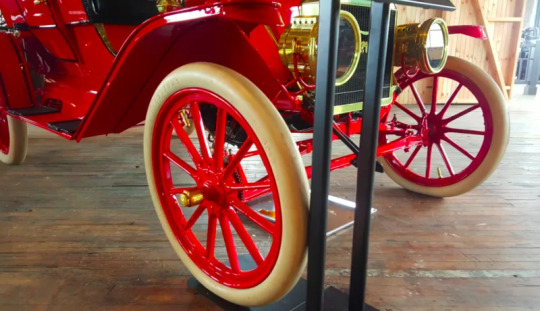
“Original tyres had a lighter shade because of the natural color of rubber,” a company representative told me. “Carbon black [a fine manufactured soot] was added to the rubber compound in [circa 1917] and produced a tenfold increase in wear resistance.”
This increased longevity is confirmed by award-winning chemical engineer Jack Koenig, who says in his book Spectroscopy of Polymers that a tyre without carbon black would last “less than 5,000 miles.” Consider that most tyres are driven between 12,000 and 15,000 miles a year and are meant to last three or four years or more, and you get how low that was.
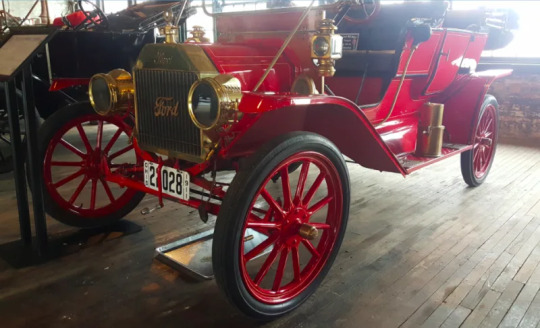
Tyre company Coker also gives credit for tyres’ black appearance to carbon black in a blog post titled “The History and Timeline of Whitewall Tyres”, mentioning that the strengthening properties of carbon black are key. Goodyear’s Hug the Road blog also mentions improved resistance to ozone and increased conductivity to help transfer heat away from the tread and belts as benefits key to the blackening material.
So now it’s worth asking:
WHAT IS CARBON BLACK?

Carbon black is the product of a hydrocarbon that has gone through incomplete combustion, and whose “smoke” has been captured as fine black particles consisting almost entirely of elemental carbon.
But in the 1870s, as noted in the thrilling tome Developments in Rubber Technology, Volume 1, came a breakthrough called the channel process. Essentially, it involved burning natural gas up against water-cooled H-shaped metal channels and collecting the carbon deposits. This new process, and specifically the finer particles it yielded, was apparently an important step in yielding stronger tyres for the auto industry, as Orion Engineered Carbons writes in its brochure:
But channel black wasn’t particularly efficient or environmentally friendly, as you can see in the below picture of the stuff getting made. These were called “hot houses,” and their smoke could be seen for miles.
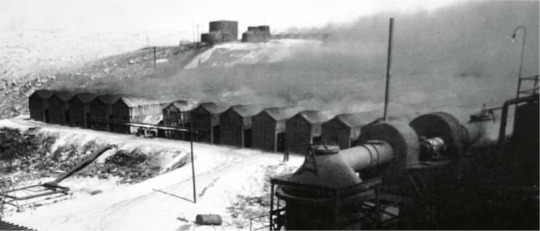
Today, the primary method of obtaining carbon black is called the “furnace process,” which involves taking a heavy oil or natural gas feedstock, and injecting it into a furnace wherein natural gas and pre-heated air have combusted (see image below). The high temperatures of this reaction cause the feedstock to “crack” and turn into smoke, which is cooled by water and filtered out as tiny carbon black bits from the gas.

Carbon black powder is extremely fine, and to see the true shape of the material requires the use of an electron microscope, which reveals tiny particles, generally between 10 nanometers and 500 nanometers, that have fused together into chains of various shapes. According to major carbon black manufacturer Birla Carbon, the size of the particles, as well as that of the fused-together “aggregates,” and overall shape affects things like a rubber’s abrasion resistance, tensile strength, blackness, conductivity, and weatherability.

Different grades of carbon black tend to be categorized based on their surface area, as well as on their effect on the cure rate of rubber. Here’s a look at a number of different grades, which are used for a variety of different rubber applications like motor mounts, conveyor belts, and high-performance tyres.
HOW A WORLD WAR I SUPPLY SHORTAGE COULD BE THE REASON FOR BLACK TYRES
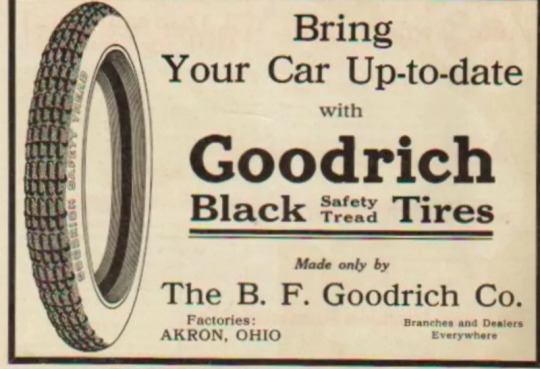
The history of how tyres got their black color is complex and fascinating, but also a bit murky. I spoke with Jack Seavitt, a member of the board of trustees and also a tour guide at the Ford Piquette plant. While he later admitted that he and his colleagues had different stories on how it all went down, his take was that tyres may have turned black as a result of a World War I munitions shortage.
In particular, he said that in the early 1900s, tyre makers figured out that they could add magnesium oxide to rubber to increase strength. “But magnesium oxide was needed in the munitions industry during World War I,” he told me, saying it was used as a propellant, and that brass for artillery shells was also in short supply. “So they said to the automotive industry: You can’t use brass anymore, and you can’t use magnesium oxide in tyres.”
A bit of browsing on the internet brought me to Crayola, makers of crayons and markers. Crayola used to be a brand under the company Binney & Smith, named after Edwin Binney and C. Harold Smith. These two were the son and nephew, respectively, of Joseph Binney, founder of New York-based Peekskill Chemical Works, which sold charcoal and lampblack—the aforementioned deep black powder obtained by collecting soot deposits from burning oil. It was used to make pigments and inks.
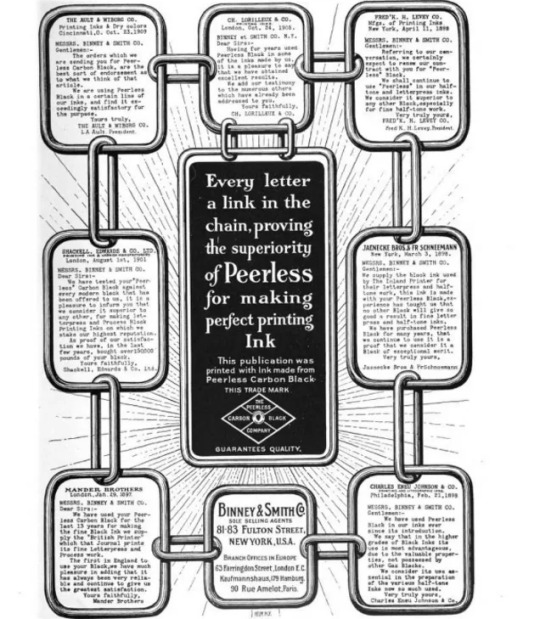
After Joseph retired and Edwin and C. Harold started Binney & Smith, the company became known for red oxide paint, which was used to decorate barns throughout America, and after the turn of the century, Binney & Smith introduced innovations like dustless chalk for classrooms and affordable crayons branded “Crayola.” More importantly, by this time, Binney & Smith had become a world leader in the production of natural gas-based carbon black, selling it as ink under the “Peerless” brand, which won a gold award at the 1900 Paris Exposition.
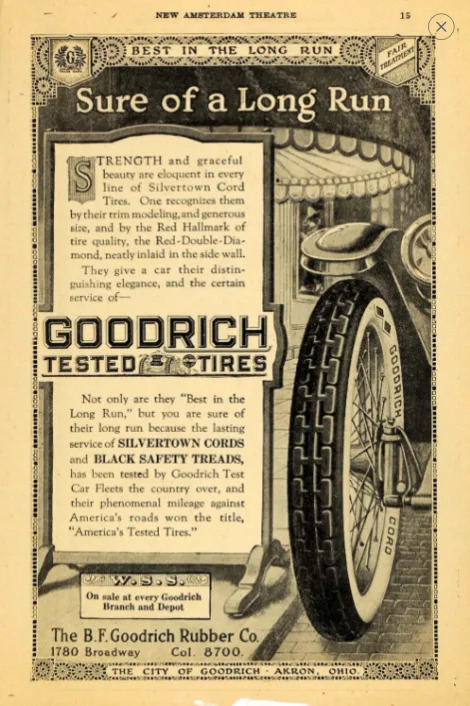
According to an article written in 1992 in the American Society for Testing and Materials’ newspaper Standardization News by a Michelin quality guarantee manager, Thomas Hancock—founder of the British rubber industry—and Charles Goodyear—discoverer of the vulcanization process—had patents from the 1830s dealing with adding lampblack to rubber for coloring, but it wasn’t until later that tyres actually changed color.
The author, Jeffery A. Melsom, says the true rubber-strengthening benefits of carbon black was discovered by S.C. Mote, a chemist for the Silvertown, England-based India Rubber, Gutta Percha and Telegraph Cable Company, in 1904.
So, where does World War I come in? Well, Jack Seavitt from the Ford Piquette plant may have had a point about a munitions shortage, though I think he mixed up magnesium oxide with zinc oxide. I say he might have had a point because I came upon a December, 1988 issue of Fortune Magazine that mentions a munitions shortage:
The market for carbon black exploded after World War I. Until then zinc oxide reinforced the rubber in tyres. When the production of brass for shell casings consumed the available zinc, chemists chanced on carbon black, which worked even better.
I also came across this paragraph in Reinforced Plastics magazine:
The date of this discovery is quite ominous as this occurred on the eve of the start of World War I. Zinc oxide had been used as a reinforcing agent in tyres, however, zinc is a component of brass and was needed for bullets, munition, and armament components. This set the stage for carbon black to move from a small black pigment business to a global industrial specialty chemical business. The volume of carbon black supplied to the market sextupled from 1915 to 1924 as a result of this new innovation…
And there’s this passage from the book The World Rubber Industry, which discusses why carbon black in tyres didn’t catch on until well after its benefits were discovered, in part because of weak tyre structures being tyres’ major failure points, not rubber tread:
…tyre carcasses at the time were so weak that improving the tread alone offered little benefit. But then the improvement of tyre carcasses through cord casing, the great upsurge in tyre consumption, and the shortage in the First World War of the zinc oxide previously employed for tyre reinforcement, facilitated increased use of black, and demonstrated its superiority.
Michelin’s spokesperson told me the company’s first black tyres, launched around 1917, were called “Universal Tread Covers,” and were advertised as tyres built for “all roads and all weathers.”
So it’s not totally clear how much World War I factored into tyres becoming black, as it appears that knowledge of carbon black’s strengthening power had existed well prior, as did a vast supply of the microscopic black particles thanks in part to Binney & Smith and the Pennsylvania oil rush.
It seems like a bit of a convergence. At the same time, cars were becoming widespread in the first years of mass production, and tyres were becoming strong enough to make long-lasting carbon black reinforcement worthwhile, and other chemical alternatives were restricted during the war.
Still, the fact is that starting just around World War I, carbon black took over from zinc oxide, and tyres became black. But more importantly, they became more durable, and still, keep that color to this day.
car service in gurgaon
car service in Noida
car service in Delhi
car service in Faridabad
car service in Bangalore
car service in Pune
car service in Chennai
car repair in gurgaon
car service near me
car service center in gurgaon
0 notes
Link
Abstract:
This paper provides a detailed case study of an elaborate legend that grew out of a small kernel of historical truth. It scrutinizes the salient primary-sources upon which the legend was based, seeking to determine the extent to which it owes its origin to verifiable fact. While the content of the paper pertains to the specific story of an black slave-turned-pirate who allegedly terrorized the mangrove swamps of south Florida during the early eighteenth century, the greater implications of the paper suggest that constructed narratives and invented traditions, though based in historical truth, say more about the cultural context, aspirations, and self-perceptions of the people who construct and perpetuate them, than they do about the historical subjects that once provided the inspiration for their beginnings. The present study examines the historical basis of the legend in order to lay the groundwork for a followup investigation that will trace the development of the legend throughout the cultural contexts that perpetuated it for nearly three hundred years.
Introduction:
This paper is an historical investigation of a particular legend—that of Black Caesar, an eighteenth-century fugitive slave from the West coast of Africa operating as a pirate in American waters—that seeks to uncover the extent to which the legend was based in verifiable truth. On its surface, it is a specific case-study of an obscure American archetype—that of the black pirate—but on its deepest levels, it is a commentary on how historians approach the task of analyzing modern legends that find their basis in a moment of historical truth, no matter how small that moment may be. Determining the historical truth behind the subject of a legend means scrutinizing the primary sources from the time period of that subject, something which this essay seeks to do; but that is only the beginning. A followup study must trace the development of the legend throughout the various contexts that created, reinvented, and perpetuated it, using the knowledge gained from the initial historical analysis as a framework for evaluating what is fabricated and what is real. Only then can we begin to understand the unique reasons that lead people to appropriate, maintain, and shape some historical legends and not others.
What we can know about the historic Black Caesar:
The legend of Black Caesar refers to the stories of an African slave-turned-pirate who operated in the waters off south Florida during the early eighteenth century. He used the mangrove swamps of Elliot Key as his personal haven until he joined forces with the notorious English pirate Blackbeard, and ultimately died an ignominious death by hanging as a result of this acquaintance. For the purposes of this essay, he should not be confused with the nineteenth century Haitian pirate named Henri Ceasar, who also operated under the moniker “Black Caesar”.
The legend finds historical basis in a collection of stories told by a mysterious British author from the eighteenth century named Captain Charles Johnson. In the first edition of his General History of the Robberies and Murders of the Most Notorious Pirates, Johnson refers to an anonymous “Negro” who is widely considered to be Black Caesar.[1] The work is dated during the twilight years of the Golden Age of Piracy (~1700-1730), making it a valuable primary source. Unfortunately, the name “Johnson” is only a pseudonym and the author’s real identity is shrouded in mystery. American scholar John Robert Moore once championed the theory that ‘Charles Johnson’ was a nom de plume of the contemporary English writer, Daniel Defoe—author of the fictional autobiography Robinson Crusoe.[2] This theory prevailed for over fifty years until it was thoroughly debunked by scholars P.N. Furbank and W.R. Owen in their 1988 book, The Canonisation of Daniel Defoe.[3] Since then, the identity of Johnson has once again returned to obscurity and provides no clue to the context or reliability of his sources.
Johnson provides a colorful biography of the infamous pirate Blackbeard, also known as Edward Teach, in his General History. The biography includes a laconic anecdote pertaining to an anonymous “Negro” in the lower-decks of his ship, the Adventure, during its final engagement with Royal Navy Lieutenant Robert Maynard at Ocracoke Inlet off the coast of North Carolina on November 22nd, 1718. According to Johnson, Blackbeard instructed this “Negro who he had brought up” to detonate a powder keg and destroy the Adventure in the hypothetical event that defeat became inevitable.[4] A near-facsimile of this anecdote was relayed in the unpublished letters of the Virginia Governor, Alexander Spotswood, who commissioned the expedition against Blackbeard.[5] In both cases, the would-be arsonist is cryptically described as an unnamed “Negro.”
At the end of this biography, Johnson provides a list of fifteen captured members of Blackbeard's crew who were transported up the James River to Williamsburg, Virginia.[6] The name “Caesar” is among them. As Johnson indicates, thirteen of these fifteen prisoners were convicted of piracy and executed four months later (on March12th, 1719) near Capitol Landing Road in the same town. “Caesar” was one of these condemned souls. The remaining two pirates were pardoned and acquitted. A 1992 excavation inadvertently uncovered the probable location of the eighteenth-century Williamsburg gallows, the spot where “Caesar” and these twelve others allegedly swung to four winds. The gallows were located outside the borders of colonial Williamsburg, about a one-mile tumbrel ride from the jail, and one-hundred feet from the current junction of Capitol Landing Road and Maynard Drive.[7]
Unfortunately, the records of the Virginia trial—likely transferred from Williamsburg to Richmond when the capital moved in 1780—are believed to have been lost forever during an April 1865 fire.[8] Additionally, no contemporary sources on the trial records appear to have been created during the period between their composition and their supposed conflagration 146 years later, and court procedure did not require duplicates to be made. After all, this was before the 1730 establishment of a printing office[9] and such duplication would have been unnecessarily time consuming. Notwithstanding this loss, the depositions of four other executed black pirates—taken during the Virginia trial—did survive because they had been stored in North Carolina, where they were used but disregarded as testimony in the trial of the Secretary of that colony, Tobias Knight, an alleged accomplice of Blackbeard.[10] The depositions suggest that “Caesar” was one of at least five black men condemned at Williamsburg on March 12th, 1719.
But there is no deposition by “Caesar”. This absence, along with the presumption of coercion during the captives’ four month imprisonment, and Knight’s claim that the depositions were made “in hopes of obtaining mercy,” led historian Robert Earl Lee to assert that “Caesar” had refused to testify in court as an act of allegiance to his pirate brethren.[11] This assertion is more an attempt to rationalize a lack of source information than a claim based on evidence, as there is no way to confirm why a deposition by “Caesar” does not exist today, if it ever existed at all; however, the depositions do say something. They say that “Caesar” is not the only suspect of the powder room anecdote. There were more black pirates onboard the Adventure during its final engagement at Ocracoke, and any one of them could have been the “Negro” fire starter.
Thanks to news coverage of the Ocracoke engagement, and firsthand accounts of the skirmish, historians have reason to believe that at least six more black pirates were present on the Adventure at the time of Blackbeard’s last stand, perhaps confirming the evidence of the Virginia depositions. Alexander Spotswood, in a letter to the council of Trade and Plantations, says that a crew of eighteen men was present on the ship, and at least a third of them were “Negroes”.[12] This estimation squares with a report made to the Admiralty by Captain Ellis Brand, a subordinate officer on the Blackbeard expedition. The report states that eighteen men were on board the pirate ship and six of these eighteen were “Negroes”.[13] This number is further corroborated by contemporary newspaper accounts of the conflict, such as those printed in Virginia and London.[14]
Johnson's execution list refers to "Caesar," but this was likely not the person’s real name; rather, "the name Caesar suggests [that] he had been a slave,"[15] as it was customary for slave dealers to bestow Euro-historic names to the "unnamed" Africans whom they captured and sold. This habit explains the biblical and Eurocentric names of three of the four black pirates who gave depositions against Tobias Knight in Williamsburg (James Black, James White, and Thomas Gates).[16] A bestowed name did not necessarily mean that there was any likeness between the named figure and the suggested namesake—for example, Black Caesar and Julius Caesar. However, it is possible that the name alluded to the fact that Julius Caesar dealt with piracy on the Mediterranean Sea,[17] or that it was an ironical reference to the Roman epithet that denoted imperial status. Lastly, because there is no record of “Caesar” joining up with Blackbeard, it is possible that his name was an appellation acquired while already onboard. In this sense, it is interesting to note that Blackbeard and his crew looted and vengefully burnt a Boston ship called the Protestant Caesar seven months before the skirmish at Ocracoke.[18]
Overall, the combined historical evidence allows scholars to verify six facts related to Black Caesar: that at least six “Negroes” were present on the Adventure at the Ocracoke engagement, one of these “Negroes” was entrusted with the task of burning the ship in the event of defeat, at least five “Negroes” were tried and convicted in Williamsburg four months later in relation to Blackbeard, and a “Caesar” was among them, though “Caesar” was likely not this person’s real name. As we shall see, the paucity of what we can know surrounding the life and death of Black Caesar sharply contrasts with the magnitude of all that we cannot know.
What we cannot know about the historical Black Caesar:
To begin with, historians may never know if the “Caesar” from the execution list and the “Negro” from the powder room were one and the same. The sources examined in this study form the foundation of all that can be verified about the historical figure Black Caesar. There are no references to him remaining from Blackbeard's arrested ship, no trial records, and no primary sources pertaining to the captured pirates from the four-month period between their detainment and execution, though Johnson suggests that they told stories during this time.[19] Alexander Spotswood makes no direct mention of “Caesar” in his Official Letters, despite including his version of the powder room anecdote.[20] Other key players in the Ocracoke engagement—such as Lieutenant Maynard, Captain Brand, and Captain Gordon—are silent on the matter. Based on this evidence, historians cannot be certain that “Caesar” was even on the Adventure at Blackbeard’s last stand. Primary accounts of the Ocracoke engagement reveal that only nine of the fifteen pirates who were tried in Williamsburg were direct captives of the conflict. The other six were rounded up in Bath Town afterward as suspected affiliates of Blackbeard.[21]
Even if “Caesar” was onboard the Adventure during the battle of Ocracoke, there is no way to confirm that he was part of the crew. Both sides of this issue are arguable. Historian Marcus Rediker states that it was not uncommon for Blackbeard to employ black pirates on his seafaring exploits, stating that “60 of Blackbeard’s crew of 100 [pirates] were black” at one time in 1718.[22] Archaeologist David D. Moore and researcher Mike Daniel state that according to depositions made at the trial of Major Stede Bonnet, to whom Blackbeard abandoned his original flagship, the Queen Anne’s Revenge, Blackbeard once left Topsail Inlet with a crew of forty whites and sixty “negroes”.[23] Also, the fact that Blackbeard moored at Ocracoke with such an uncharacteristically small crew—nineteen men when he previously employed hundreds—makes it easy to believe that the captured black men were intimate confidants of Blackbeard. But the presence of black men aboard a pirate ship does not necessarily denote a multi-racial crew, especially in the case of Blackbeard, who was known to have acquired and harbored contraband slaves with the hopes of selling them to the American colonies for profit.[24]
If “Caesar” was once a slave, as his name suggests, then it is possible that Blackbeard conscripted him from one of the many slave ships he plundered during his two-year career as a pirate. Blackbeard stole sixty-one slaves out of a French slaver from Nantes named La Concorde near the Caribbean Island of St. Vincent in 1717.[25]On another occasion, Blackbeard took approximately fourteen slaves out of the brigantine the Princess while leaving Charleston in the wake of his famous blockade.[26] In both cases, it is unknown whether any of the acquired slaves assimilated with the crew. It is also possible that “Caesar” was acquired from a similar yet undocumented incident. When discussing the black pirates aboard the Adventure at Ocracoke, Arne Bialuschewski argues that “the fact that they were not killed or severely injured in combat indicates that they were not fighting members of the pirate crew.”[27] The “Negro” in the powder room stayed below deck during the fracas, suggesting that he was a slave, rather than a free pirate who fought for his life.
Perhaps most importantly, nothing of Black Caesar’s life prior to his enlistment with Blackbeard can be historically verified. The modern legend states that Caesar was a king stolen from the west coast of Africa and brought to America by way of a slaver that wrecked on the jagged Florida reefs in the late seventeenth century, but no slaver matching those specific circumstances appears in the historical record.[28] The legend states that Caesar plundered merchant ships from a base-camp on Elliot Key, where he acted as the self-established warden of an ad hoc stone prison compound for over one-hundred women. But the current in-house archaeologist of the Biscayne National Park, Charles Lawson, states that there is no archaeological evidence to suggest that such a stone compound ever existed on Elliot Key.[29] The label “Black Caesar’s Rock” appears on a map of South Florida in the mid-eighteenth century,[30] but there is no way to verify whether it was named after “Caesar” himself. The legend states that Caesar embedded a metal ring in this rock so that he could capsize his boat to enable ambuscade and elude pursuers, but no metal ring exists today, if it existed at all. Black Caesar’s much-talked-about caches of buried treasure have never been found, and a fantastic story of his mixed-race descendants can be traced to a Jim-Crow-era novel entitled Black Caesar’s Clan. Finally, the presence of an equally undocumented homonymous black pirate in the early nineteenth century—fresh off the Haitian revolution—greatly obfuscates all knowledge surrounding the legend of the first. In the end, all we know is that the name “Caesar” somehow appears on a second-hand execution list of unknown authorship. The epithet ‘black’ was likely a sobriquet created sometime later for the purpose of racial identification, as there was no obvious contemporary reason to embed a racial distinction in the name of this particular pirate and not others. But even this is only an assumption.
Conclusion:
Historical analysis of the available primary-source documentation from the lifetime of “Caesars” has revealed extreme incongruity between the historical record and the modern-day legend, suggesting that once people believed that “Caesar” was the “Negro whom Blackbeard had brought up,” it became necessary to account for that upbringing with an origin story that entirely ignored the limits of primary-source documentation and logical inference, and instead spoke to the unique cultural contexts, aspirations, and self-perceptions of the people who continued to create, reinvent, and perpetuate it for the next three-hundred years. The next stage of this study must leave the historical period of its subject—Black Caesar—and trace the development of the legend from the early-eighteenth century gallows to the modern day, asking why people decided to create their own Black Caesar, rather than the one that history gave them.
Notes
[1] Charles Johnson, A General History of the Robberies & Murders of the Most Notorious Pirates (Guilford, Connecticut: Lyons Press, 2010), 52.
[2] John Robert Moore, Defoe in the Pillory and Other Studies (Bloomington, Indiana: Indiana University Press, 1939).
[3] P.N. Furbank and W.R. Owens, The Canonisation of Daniel Defoe (New Haven: Yale University Press, 1988).
[4] Johnson, 52.
[5] Alexander Spotswood, “America and the West Indies: December 1718, 22-31,” Calendar of State Papers Colonial, America and West Indies, Volume 30: 1717-1718, ed. Cecil Headlan (1930): 424-446.
[6] Johnson, 56.
[7] Joe B. Jones and Charles M. Downing, Phase III Data Recovery for Mitigation of Adverse Effects to Site 44WB66 Associated with the VNG Mechanicsville to Kingsmill Lateral Pipeline, City of Williamsburg, Virginia. Prepared for Virginia Natural Gas, Inc. Technical Report Series No. 18. (Williamsburg: College of William & Mary, 1992).
[8] Robert E. Lee, Blackbeard: A Reappraisal of His Life and Times (Charlotte: Heritage Printers, 1974) 216-219.
[9] Gail S. Terry and John M. Hemphill, “The Wheels of Government and the Machinery of Justice: the
Workings of Virginia’s Colonial Capitol.” Virginia Cavalcade 38, no. 2 (1988): 63.
[10] Lee, 153.
[11] Ibid, 153.
[12] Ibid, 114.
[13] David Cordingly, Under the Black Flag: The Romance and the Reality of Life among the Pirates (New York: Random House, 1996), 196.
[14] Arthur L. Cooke, “British Newspaper Accounts of Blackbeard’s Death,” The Virginia Magazine of History and Biography 61, no. 3 (1953): 304-307.
[15] Cassandra Pybus. “Black Caesar: Our First Bushranger…” Arena Magazine 57, (2002): 32.
[16] Lee, 153.
Johnson, 56.
[17] Plutarch, The Complete Collection of Plutarch’s Parallel Lives Comparisons, ed. Charles River Editors (Amazon Digital Services, 2011).
[18] Johnson, 44.
[19] Ibid, 55.
[20] Spotswood, 424-446.
[21] Lee, 126.
[22] Rediker, Marcus, Villains of All Nations: Atlantic Pirates in the Golden Age (Boston: Beacon Press, 2004) 54.
[23] David D. Moore and Mike Daniel, “Blackbeard's Capture of the Nantaise Slave Ship La Concorde: A Brief Analysis of the Documentary Evidence.” Tributaries, Vol. 11 (October): 27.
[24] Spotswood, 424-446.
[25] Moore and Daniel, 21.
[26] Ibid, 21.
[27] Arne Bialuschewski, "Pirates, Black Sailors and Seafaring Slaves in the Anglo-American Maritime World, 1715-1726" Journal of Caribbean Studies 45, no. 2 (2011): 147.
[28] The legend is an amalgamation of twentieth-century folkloric histories and internet sources that can be found in the bibliography of this paper under the heading “Sources of the legend”.
[29] Charles Lawson, resident archaeologist of the Biscayne National Park, phone conversation, November, 4th, 2011.
[30] Dean Love. "Pirates and Legends,” Florida Keys Magazine. (1st quarter, 1981): 10-14.
------------------------------------------------------------------------------------------------------
Bibliography
Sources of the legend: (selected)
Cross, James. Blackbeard, or, the Captive Princess: a Serio-comic Ballet of Action in Two Acts. London: J. Duncombe, 1798.
Love, Dean. "Pirates and Legends". Florida Keys Magazine. (1st quarter, 1981): 10-14.
McCarthy, Kevin M. Twenty Florida Pirates. Sarasota, Florida: Pineapple Press, 1994.
“St. Augustine Pirate & Treasure Museum.” The Pirate Museum. Accessed September 28th 2011.
http://thepiratemuseum.com/index.php?option=com_content&view=article&id=95:black-caesar&catid=46:notable-pirates&Itemid=199
Terhune, Albert Payson. Black Caesar’s Clan: A Florida Mystery Story. New York: George H. Doran Co., 1922.
True, David O. "Pirates and Treasure Trove of South Florida". Tequesta: The Journal of the Historical Association of Southern Florida (1947): 3-13.
Woodman, Jim. Key Biscayne, the Romance of Cape Florida. United States: Jim Woodman, 1972.
All Other Cited Material:
Bialuschewski, Arne. “Pirates, Black Sailors and Seafaring Slaves in the Anglo-American Maritime World, 1716-1726.” Journal of Caribbean Studies 45, no. 2 (2011): 146-158.
Cooke, Arthur L. “British Newspaper Accounts of Blackbeard’s Death.” The Virginia Magazine of History and Biography 61, no. 3 (1953): 304-307.
Cordingly, David. Under the Black Flag: The Romance and the Reality of Life among the Pirates. New York: Random House, 1996.
Furbank, P.N. and W.R. Owens. The Canonisation of Daniel Defoe. New Haven: Yale University Press, 1988.
Green, Bartholomew. “The Boston Newsletter, Monday Feb 23rd-Monday Mar 2nd, 1719.” In The Golden Age: History and Interpretation, 1660-1730. Cambridge: Pickering and Chalto Limited, 2007.
Johnson, Charles. A General History of the Robberies & Murders of the Most Notorious Pirates. Guilford, Connecticut: Lyons Press, 2010.
Jones, Joe B., and Charles M. Downing. Phase III Data Recovery for Mitigation of Adverse Effects to Site44WB66 Associated with the VNG Mechanicsville to Kingsmill Lateral Pipeline, City of Williamsburg, Virginia. Prepared for Virginia Natural Gas, Inc. Technical Report Series No. 18. Williamsburg: College of William & Mary, 1992.
Lee, R.E. Blackbeard the Pirate: A Reappraisal of His Life and Times. Charlotte: Heritage Printers, 1974.
Love, Dean. "Pirates and Legends". Florida Keys Magazine. (1st quarter, 1981): 10-14.
Moore, David D. and Mike Daniel. “Blackbeard's Capture of the Nantaise Slave Ship La Concorde: A Brief Analysis of the Documentary Evidence.” Tributaries, Vol. 11 (October): 14-31.
Moore, Robert John. Defoe in the Pillory and Other Studies. Bloomington, Indiana: Indiana University Press, 1939.
Plutarch. The Complete Collection of Plutarch’s Parallel Lives Comparisons. ed. Charles River Editors. Amazon Digital Services, 2011.
Pybus, Cassandra. “Black Caesar, Our First Bushranger.” Arena Magazine , Vol. 57 (2002): 30-34.
Rediker, Marcus. Villains of All Nations: Atlantic Pirates in the Golden Age. Boston: Beacon Press, 2004.
Spotswood, Alexander. “America and West Indies: December 1718, 22-31,” in Calendar of State Papers Colonial, America and West Indies, Volume 30: 1717-1718. Ed. Cecil Headlan (1930): 424-446.
Spotswood, Alexander. “Feb 14th, 1719 Letter to Lord Cartwright, proprietor of North and South Carolina.” In The Official Letters of Alexander Spotswood, Lieutenant Governor of the Colony of Virginia, 1710-1722. Richman, VA: the Virginia Historical Society, New Series, vol. I, II, 1882-1885.
Terhune, Albert Payson. Black Caesar’s Clan: A Florida Mystery Story. New York: George H. Doran Co., 1922.
Terry, S. Gail and John M. Hemphill. “The Wheels of Government and the Machinery of Justice: the Workings of Virginia’s Colonial Capitol.” Virginia Cavalcade 38, no. 2 (1988): 56-65.
1 note
·
View note
Text
Arplis - News: Good value, but not much more: A review of TAP Air Portugals A321LR in business class, Porto to Newark
TPG Rating
70 100
Pros
Fresh new cabin with comfy throne seat. Tasty food and drink.
Cons
Very poor ground experience and the service could have been more polished.
10 Ground Experience
25 Cabin + Seat
10 Amenities + IFE
14 Food + Beverage
11 Service
Since joining TPG at the start of the year, Ive been fortunate to do an eclectic mix of reviews. From my first time flying Virgin Atlantic to the shortest scheduled flight in the world, Ive had unique and unforgettable experiences. On a recent trip to the States for work, I was looking for an interesting route, aircraft or airline that I could take that had never been reviewed before. TAPs A321LR was exactly that: The more modern, technologically advanced and fuel-efficient version of the A321 I flew back from Amman, Jordan, earlier in the year. It was a no-brainer, it had yet to be reviewed, and it meant my inner AvGeek would get to fly a new aircraft and airline for the first time. But did my experience live up to the self-generated hype?
In This Post
Booking
Another reason that this was a great product to review is the fact that a one-way in business class from London Gatwick (LGW) to Newark (EWR) via Porto (OPO) was pricing at a very reasonable $965. If youre willing to spend the night in Porto which, by the way, I highly recommend you can even find fares as low as about $780 for a one-way ticket. Considering one-way flights between London and New York routinely sell for about $8,000, the stopover is well worth it if youre looking to fly in business class without breaking the bank. Round-trip tickets booked in a similar way also save significant amounts of money compared with the nonstop flights between the two hubs.
As TAP is part of Star Alliance, there are plenty of miles and points redemptions for this flight, too. TAPs own Miles&Go program was showing the one-way OPO to EWR ticket in business class at 145,000 miles and $72. Not cheap. Luckily, though, there are programs that will allow you to book for both fewer miles and less of a cash outlay.
For example,through Uniteds MileagePlus program, if you can find business saver availability, youll pay for 70,000 miles and $45. Another great option is Air Canadas Aeroplan program, where you could use 55,000 miles for a one-way ticket. You can earn both United and Aeroplan miles very easily, as Chase Ultimate Rewards transfer at a 1:1 ratio to United, and American Express Membership Rewards transfer at the same ratio to Aeroplan.
And, right now, TPG readers can get an exclusive 150% bonus on purchasing Lifemiles, another excellent option for booking Star Alliance flights.
Ground Experience
TPG Rating
10/20
CS-TXC
Tail
17:31
Departure
7h 45m
Duration
I was scheduled to fly from Gatwick at 1 p.m, land in Porto at 3:15 p.m. and depart for Newark at 4:55 p.m. With one hour and 45 mins to transfer, what could go wrong?
I arrived nice and early, as my business-class ticket gave me access to the No1 Lounge in Gatwicks South Terminal. There was not one single person in either the premium or economy lines at check-in, which meant the process was super quick. TAPs check-in area was in Zone E, next door to Turkish Airlines, which had about a dozen people waiting in line. I had my bag checked and boarding pass in hand in no time at all. No mention of delays was made to me, either.
Related reading:Comparing British Airways and Turkish Airlines Business Class between London Heathrow and Istanbul

Walking toward the escalators up to departures, I turned around to view an eerily quiet check-in area.

I breezed through the terminals priority security, again, thanks to my business-class ticket. The terminals lounges were on the upper level of departures, on the opposite side to where I came through security.
There was a small queue of people waiting to get into the lounge. When it was my turn, the staff member scanned my boarding pass and handed me a menu. Just like Heathrows No1 Lounge in Terminal 3, the menu was la carte. As always, I did a tour of the lounge to find the seat with the best view and I quickly found this spot. I also noticed that the departures board was suspiciously showing gate displayed at 1:10 p.m., which was after my flight was due to depart. It was just the start of my troubles.

Set up and ready for some work before my flight, I headed to the bar to order something to eat. What Id forgotten is that you could only order once from the menu and had to hand it in when ordering. Breakfast options before 11 a.m were poached egg (singular) and avocado muffin, classic sausage sub and toast and preserves. I was absolutely starving and love my eggs in the morning, so it was an easy decision to make.
I actually laughed out loud at the size of the portion that was plunked down in front of me.
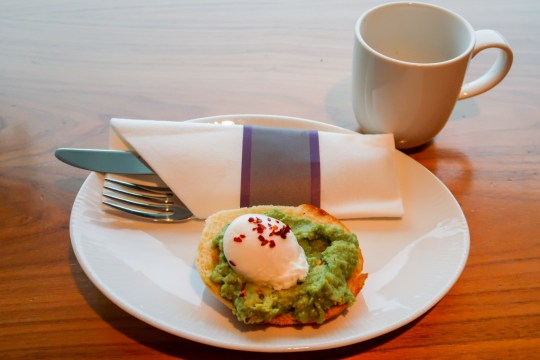
The saving grace was that the yolk was perfectly runny.
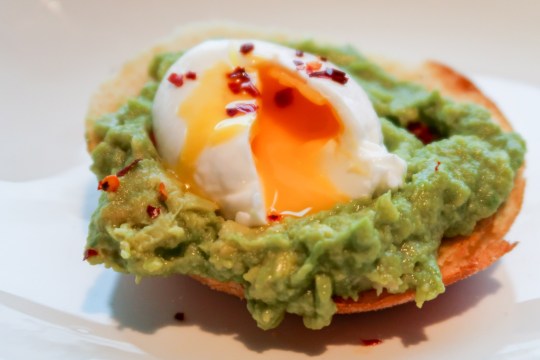
Two bites later, I was done and still hungry. I then received a text from the airline. Thankfully, I speak Portuguese, so could see that my flight would now depart at 2:20 p.m., which would mean I would now land in Porto only 30 minutes before my flight to New York. The plot thickens.

As I had more time to kill, I went to see what other delights were on offer.

The lounge was quite busy, so a few of the options were pretty spare and could have done with being refilled.


I dont think anyone had done a quick clean and tidy of the food service areas for a while, either.
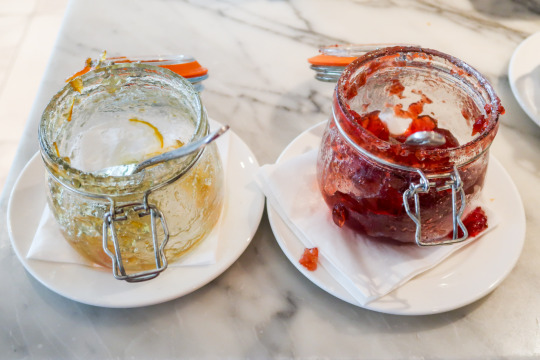
After being rather disappointed with the cold buffet, I got back to my seat to find my neighbor had left without ordering any food, so I smugly headed straight back to the bar to order a bacon roll from the all day favourites section of the menu. It was equally as disappointingly small as my egg and avocado but tasted good nonetheless. Other all-day options were a fish-finger wrap and beans on toast. No expense spared there.
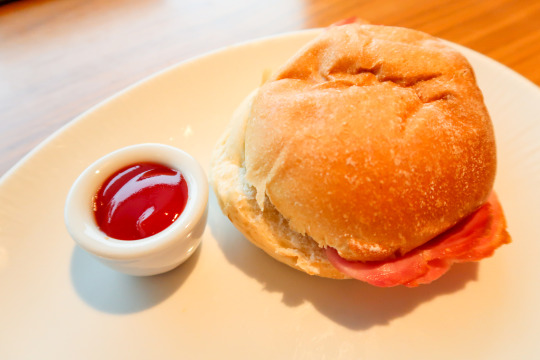
In terms of beverages, there was a soft drink, water and juice refill station.

And a coffee machine. I say coffee because it was so bad I almost spat it back into my cup.

The lounge was fairly busy and has a nice variety of different seating areas.
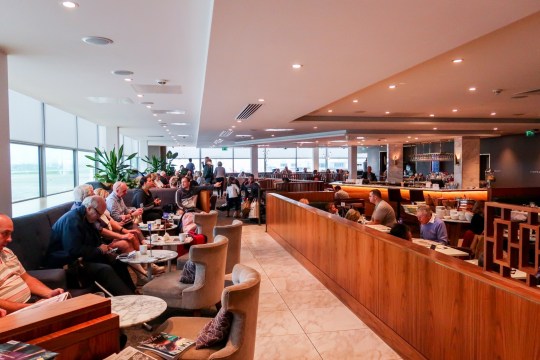
Thats including a cozy TV area sectioned off from the noise of the main lounge area.

I headed to my gate, where boarding was supposed to start at 2 p.m.
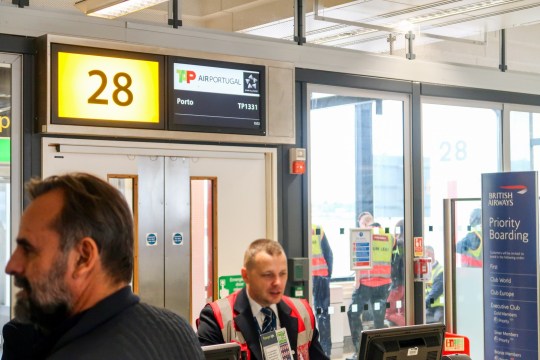
The gate area was cramped, and the scene resembled something akin to boarding a Ryanair flight at Stansted (STN). I didnt see any power sockets, and there definitely wasnt enough seating. It didnt help that a Norwegian Dreamliner bound for LAX was boarding at the gate next door. TAPs lounge and boarding experience were distinctly average and certainly not what I would call premium.

Once we were on board, the pilot announced a slot delay due to weather in Porto, which meant we would land at around 5 p.m. Seconds later, I received another text from TAP advising me that I had been rebooked on the flight the following day. On arrival at Porto, there was a huge queue for TAP customer services, so I figured there had been many flight issues that day. I headed straight to the front to find out if I were in the right queue, and a member of the TAP team said she had been waiting for me and that transport and accommodation had already been arranged for myself and the other two business-class passengers from my flight who were also due to fly to Newark. This finally felt like the service that a business-class passenger should receive, as it meant that I didnt have to wait in the queue with over 100 irate Brazilians who had had their flight home canceled.

After an impromptu and fun-filled evening in Porto, a car picked me up from the hotel at 2 p.m. the next day, and I headed back to the airport with the hope that my ground experience would be distinctly better than the day before. Once again, there was nobody waiting in the check-in area for premium passengers.

After a slight technical issue with tagging my bag, I was on quickly on my way toward security, where there were two Fast Track lanes for premium passengers.
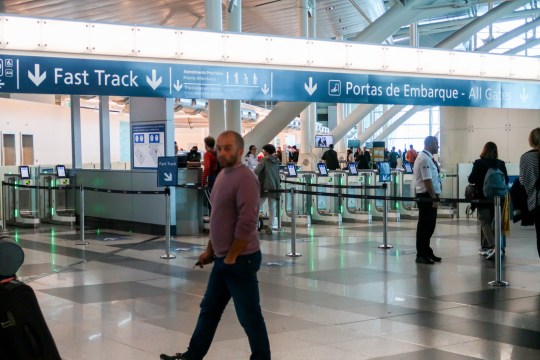
Unlike at Lisbon Airpot (LIS), there was no TAP Premium Lounge at Porto. Instead, there was a business-class lounge shared by seemingly every airline with business cabins that used the airport, as well as Priority Pass, Dragon Pass and Diners Club International cardholders. My expectations were low.
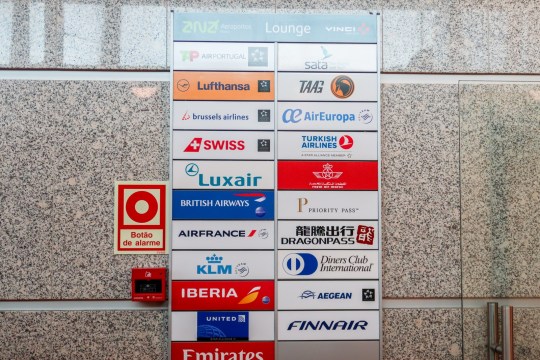
Entertainment-wise, there was a sparsely filled magazine and newspaper stand by the entrance.

There was also this phone charging stand, which at first I thought was a great addition, but maybe more so in the 2000s, when portable battery packs werent a thing. Still, it would be a lifesaver if you forgot your charger.
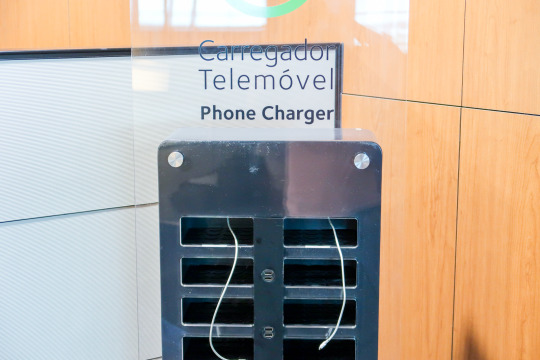
Aside from the main room, which was pretty clinical to start with, it reminded me of a dentists waiting room.

It was a bit nicer and brighter out on the terrace.
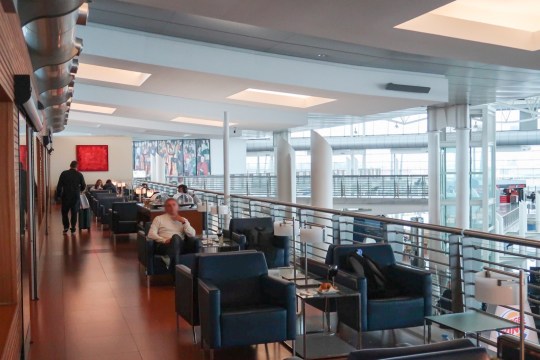
But the view was mainly only of the terminal with a bit of the runway in the distance.

The buffet area in the middle of the main room was on the small side.

Though they were cold, I liked the variety of Portuguese and Brazilian snacks and street food. Coxinha are my favourite!
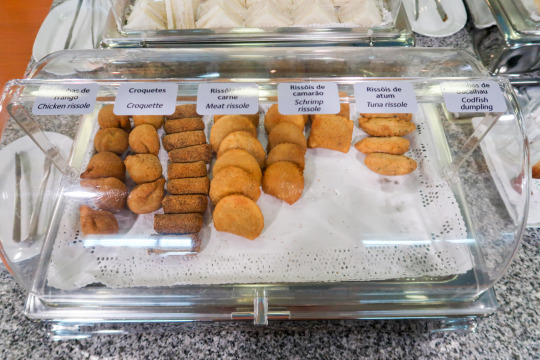
I was less impressed by the tray of sad-looking sandwiches.

And the bowls of stale pastries.

On the plus side, drinks were aplenty.

Including a Nespresso coffee machine. A slight shame, though, as Portuguese coffee is some of the best Ive ever tasted!

There was a variety of local wines.

Some middle of the the road spirits, and other assorted drinks.

After stuffing my face with coxinha, I checked the departures board before 3:30 p.m. when I saw head to gate displayed next to my flight. I thought it was quite early but did what I was told and headed to the gate. As often is the case with European airports, there was a second security area to clear before passing through into the gates area. This process took around 20 minutes.


Once I got to the gate, there was yetanother security screening to clear before I could get on the plane. It was a rather slow and arduous process where I had to take everything out of my bag, remove my shoes and have a full pat-down by a rather stale-breathed guard. Good job I left the lounge on time.
The boarding area was really full.
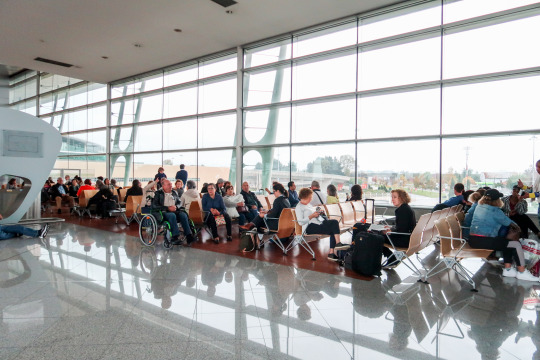
There were a few charging points around the space. Most were poorly located, meaning passengers sat on the floor to charge their devices.

There was no premium seating area, merely a sign pointing right for premium boarding and left for everyone else.

A day later than scheduled and after a very subpar ground experience first at Gatwick then in Porto, I finally boarded the 2-month-old CS-TXC around 4:30 p.m.

An hour later, we departed slightly later than scheduled at 5:30 p.m.
Cabin and Seat
TPG Rating
25/30
22.3
Width
80in
Bed Length
1
Lavs
I had high expectations for what I would find inside the cabin, and for the most part these were met. The throne seat was in a class of its own. No neighbor, space galore and two greatly positioned windows all to myself.

The small, 16-seat business-class cabin comprised five rows. Odd rows were in a 2-2 configuration, and even rows were in the coveted 1-1 formation arguably one of the best in the sky.

Storage was significantly less in the 2-2 rows.

The cabin was cozy but doesnt feel cramped, considering it was only a narrow-body aircraft.

I did a quick inspection of the seat area and noticed a few sloppy cleaning oversights that could easily have been rectified with a bit of care and attention.

The footwell was actually quite dirty.
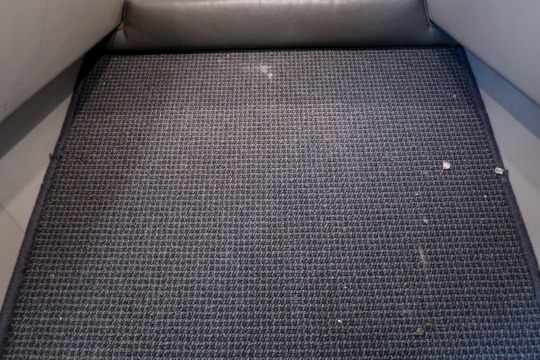
The seat controls were easily accessible. The seating positions were fixed, and there was no way of altering them to your own preference.

The footwell was spacious and didnt go too narrow at the end. Perfectly comfortable for me, but not sure it would be as good for those around 6 feet or taller.

There was a shoulder-level reading light and a hook for stowing headphones once in flight.

Then there was what Id call a cupboard rather than a storage compartment.

As well as a headphone hook, there was also a water bottle holder, great for when turbulence hit.
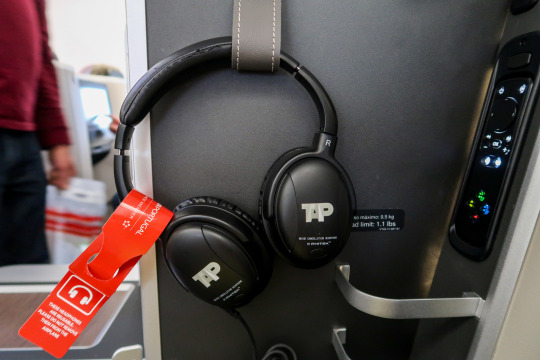
The safety cards and inflight magazines were stored in a small pouch on the other side of the seat next to the window.

Then there was final additional storage gadget in the form of a mesh on springs. Not really sure what it was for, but it was there if you needed it.
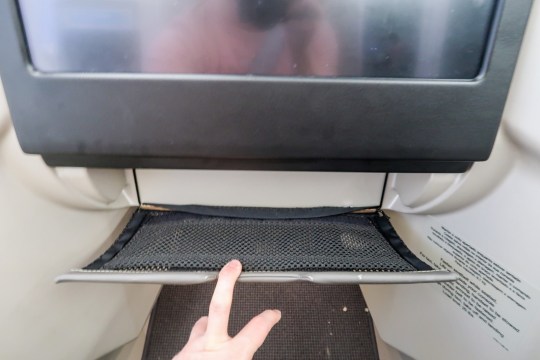
Nope, it was not a door. It was the meal tray. It slid out from next to the storage cupboard then flipped down at a 90-degree angle then rotated another 90 degrees into the right position for eating.

The tray table itself was definitely big enough.

There was a 90-degree swivel, but I think this was just part of the stowage process, as it didnt really make leaving the seat any easier.
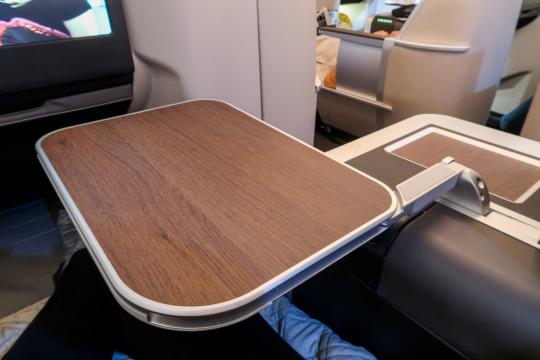
My 13-inch laptop fit comfortably on the table with enough space for a drink. Or two.

But there was plenty of surface space either side of the side if you wanted to continue working in an office in the sky while dining.

The seat lowered nice and easy into a fully flat bed. The blanket was basic, but I liked the thickness and quality of the pillows. So much so that I asked for a second, which was brought to me with no problem.

There was nothing premium about the single lavatory in the business-class cabin. It was rather small.
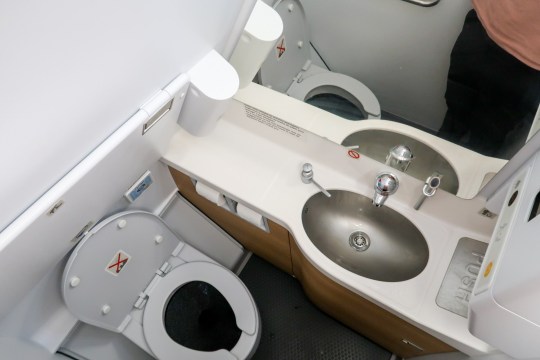
And it didnt even have any special amenities.

Due to the narrowness of the plane, the bathroom was almost cut in half diagonally by the wall of the fuselage. It was definitely not the most comfortable of spaces.

Amenities and IFE
TPG Rating
10/15
101
Movies
No
Tailcam
Yes
Headphones
About 10 minutes before takeoff, I received the TAP-branded amenity kit by Portos very own Castelbel. From what I could gather, there were two or three different designs that were handed out at random to passengers.
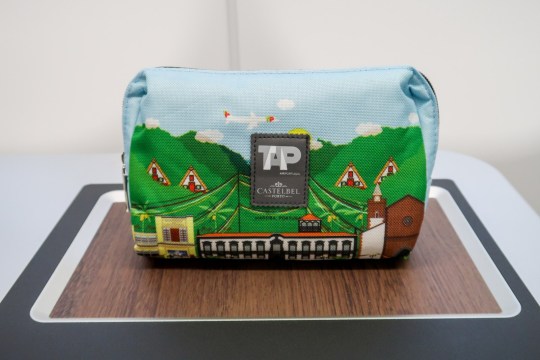
Inside, there were all of the usual suspects: eye mask, lip balm, earplugs, pen, comb, toothbrush and toothpaste, some body lotion and a pair of socks. Admittedly, the eye mask felt pretty cheap, but I liked the colorful on-brand design of the flight socks.

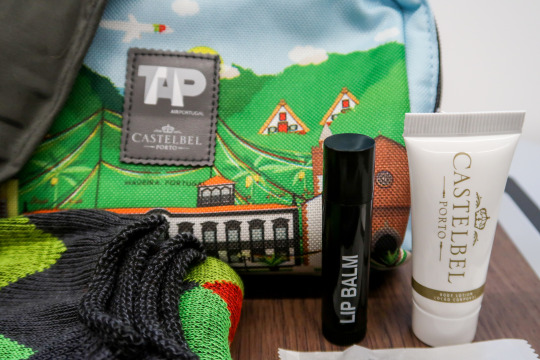
I was pretty impressed with the size of the inflight-entertainment screen. The picture was crystal-clear, and the tough screen very responsive.

I rarely pay attention during the safety video (naughty, I know) as there are usually far more interesting views to be had out of the window. But not with TAP. I was completely engaged by the airlines fresh, unique and emotive use of expats who have moved to Portugal and learned Portuguese to explain the safety briefing.
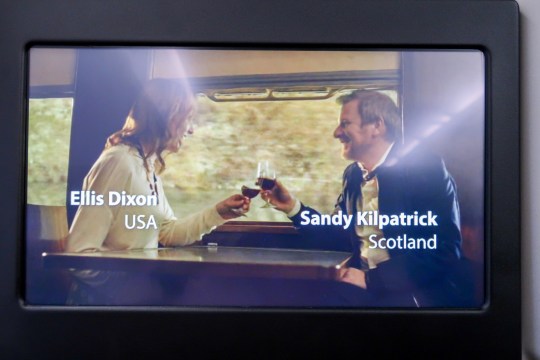
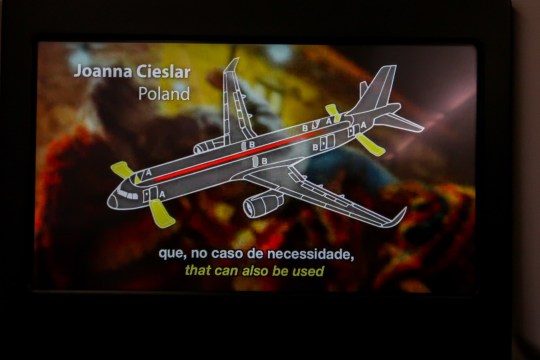
In total, there were 101 films, plenty by anyones standards. I liked that there was a selection of Brazilian and Portuguese films, too.

The earphones did not appear to be noise-canceling at all, despite being advertised so.

There was also a wine experience included in the entertainment section, which I thought was pretty cool. But when I asked the crew member serving me if all of the displayed wines were available, she didnt seem to know what I was talking about it. She then explained that there was only the selection of two red and two white wines that she had on the trolley.
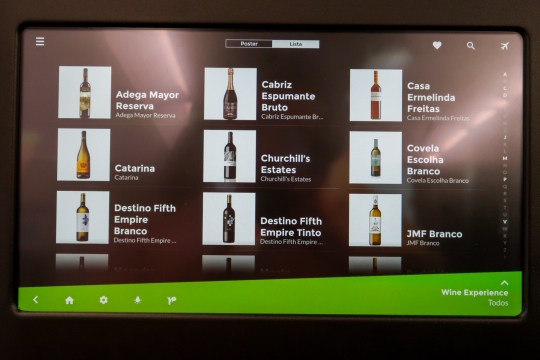
The Wi-Fi was the biggest letdown. There were prices ranging from free for messaging to Total Wi-Fi for 24.99 euros, which would mean being connected for the entire flight or so I thought.

Once I had connected, it was immediately clear that it would only be for 200 MB of data. Needless to say, it was less than 30 minutes before I had run out.

Food and Beverage
TPG Rating
14/20
2
Meals
Yes
Champagne
No
Dine on Demand
The focus of this review the Porto-to Newark segment of this trip, but I had such a great food experience on the short flight from Gatwick to Porto that I thought it deserved a mention.
Drinks on that first flight were served pretty much as soon as the seat belt signs went off.

A full meal was served with sizable starter, delicious main course and dessert. The main course was a thick, juicy and perfectly cooked veal tenderloin. I would go as far as to say that it was the best intra-European business-class meal I have ever eaten.

Back to the main event, Porto to Newark. For some reason there was no preflight drink offered before takeoff. About 45 minutes after takeoff, the first drinks were served note the Coke Zero and gin and tonic theme. I rate airlines that serve full fat Coke, Diet Coke and Coke Zero. I wasnt a massive fan of the Sunbites, though.

Around half an hour after that, dinner was served. There was only one starter: codfish carpaccio with Algarve salad topped with a random sprinkle of olive shavings. The soup was not cream of pumpkin and beetroot mousse, as advertised on the menu, but it was delicious, nonetheless. I think this was the first time Id ever had my soup served from a Thermos, too. I was also asked at this point if Id like another drink.

The bread was really poor. If Id fed it to the ducks, it would have probably knocked one unconscious.

The main course, just as was the case on the Gatwick-to-Porto flight, was my favorite part. The heartier and more comforting the food, the bigger the thumbs up it usually gets, and this was definitely up there with one of my favorites. It was roast lamb in a crispy dough with pumpkin pure. As much as Ive pretty much cut out red meat from my diet, I couldnt resist the sound of this, and Im so glad I chose it.


Shortly after mains had been cleared, a selection of chocolate was offer to cleanse the palate before dessert.
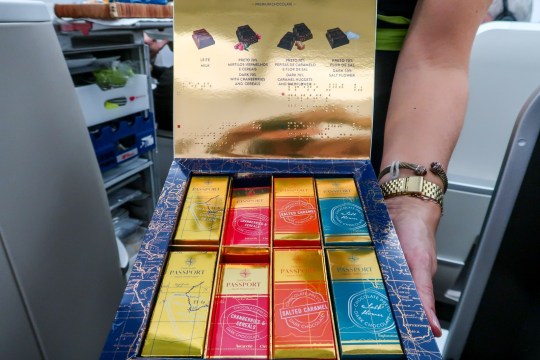
I was given the choice of ice cream, cheese plate or fresh fruit. Naturally, I went for the cheese, which I was told was a strong local cheese, perfectly accompanied by a glass of Portos finest port.


The cheese was indeed strong.Very strong. That still didnt stop me from scraping every single bit out of the rind.

About 90 minutes before landing, I was offered the second meal service. This was no better or worse than the usual half a meal that is served on transatlantic flights before landing. It was a nice snack, but I was certainly still hungry afterward. And the bread? Probably another concussed duck. The presentation was nice, and the food itself was fresh and tasted good. It just wasnt enough to be called a meal.

Service
TPG Rating
11/15
No
Extra Pillows
No
Turndown Service
The service wasnt bad by any means, but it wasnt a particularly memorable experience. The one standout moment for me was that the ground staff at Porto were expecting me and had already arranged ground transportation and a hotel for my unexpected night in Porto. That did feel like business-class service. I thought it strange that there was no preflight drink served after boarding the A321LR to New York.
The crew made sure I had enough to drink and responded in under 30 seconds when I tested the call button, which is certainly commendable. The whole thing just lacked a certain personality not once was I called by my name, and neither did any of the crew try to establish any kind of rapport when I attempted jokes or small talk. That could simply be because Im not funny, but it definitely wasnt a language thing, as falo portugus.
Overall impression
This was by far and away the least premium-feeling premium flight experience I have had so far. But I would much rather have a long-haul flight in the comfort of a lie-flat, throne seat than in a cramped, upright economy. That being said, you really do get what you pay for. If you really want to fly business rather than economy to New York and back, then I would seriously consider this as an option. It can save almost 2,000 on the cost of a direct return flight from London to New York. The bed is flat, and the food is good, and these are probably two of the main differences between economy and business class. What TAP lacks is a real business-class ground experience and a little extra something from its staff. Fix those two things and this lesser-known route might a have a better chance against the competition.
All photos by the author.
Arplis - News
source https://arplis.com/blogs/news/good-value-but-not-much-more-a-review-of-tap-air-portugals-a321lr-in-business-class-porto-to-newark
0 notes
Link
The right way to theorise the EU, I argue, is as in effect a coordinated set of constitutional structures for each of the member countries. The EU is not a “superstate”, nor can it easily become one, juridically: it has always been clearly stated by the highest legal authorities in each country that at least at the moment the countries are sovereign entities, able in the last resort to decide their own futures. This is not empty rhetoric since, among other things, it is the justification for the continued representation of each EU country separately at the UN, something they are extremely unlikely ever to renounce. For this reason much of the use of the term “sovereignty” in the referendum debate was indeed as unhelpful as its critics complained. Moreover, the fact that the EU is not a state is the source of many of the problems it itself faces, as well as the problems conventional states face dealing with it; the thousands of deaths in the Mediterranean are testimony to the dangers of its current anomalous character and the fact that it is stuck in a half-way house, neither able to be a state with its own borders nor an alliance of states which control their own. It is also why negotiating with it is not like negotiating with a normal state, but more in some ways (though one should not push this analogy too far) like negotiating with a Supreme Court – the picture Varoufakis paints in his gripping memoirs of his dealings with the EU institutions illustrates their strange character and the mistake we make if we treat it like either a unitary state or an ordinary international grouping .
The key feature of the EU is that the sovereign authority in each state has enacted a certain rather curious kind of constitutional order for each of them, in which a set of principles and institutions are entrenched in a position beyond the reach of conventional, “governmental”, legislation. These principles and institutions are supranational in character, of course, and that is why the states took this course of action, but seem from within each state the supranational character is not, in a way, the key feature: the key feature is rather that they are entrenched within the legal system of each country (this is what makes them different from the other supranational arrangements with which they are often compared, such as NATO or – even – the UN, at least in great part). The curious feature of these constitutional orders, however, is that they cannot be amended by the same process by which they were imposed: an Act of the UK Parliament by itself straightforwardly entrenched the EU institutions in UK law, but no Act of the UK Parliament by itself can amend them. Only a process of intergovernmental negotiation, issuing in changes which no one country can impose upon itself, can alter the essential character of the EU’s constitutional structure. The only thing an individual state can do is repudiate the whole structure – as we are finding out.
Most states on the Continent already had constitutional structures of some sort before the EU was formed, and their politicians were used to operating inside them, just as American politicians are. But the idea that a constitution could not be amended was new to them also – though, and this may be significant, not to German politicians. The German constitution is a legal oddity: the West German constitution, the Grundgesetz, was technically authorised by three of the four powers in the Allied military government, and included the provision that in the event of reunification a new constitution would have to be ratified by the German people. After the dissolution of the military government in 1991 the provinces of East Germany simply acceded to the Western state and its Grundgesetz, so the German constitution has never actually been ratified properly; moreover, a tradition has developed within German constitutional jurisprudence of supposing that certain fundamental moral principles are enshrined in constitutional law without the need for positive enactment. It is easy to see how a domestic structure of this kind renders the structures of the EU far less problematic for Germany than they are for the UK, or indeed for France, with its long history of popular constitutional legislation.
Britain, by virtue of its desire to join what was then the Common Market, thus found itself forced unwittingly into the default shape of a modern state, with a constitution which lay beyond the power of the government to change. And as an almost instinctive recognition of this, the Wilson administration as we all know decided to use for the first time the default institution of constitutional legislation in a modern state, the referendum, in order to legitimate it. Though constitutional referendums had occasionally been proposed in the UK, notably to deal with Irish – and indeed Scottish – home rule, this was the first time that such a thing had seemed clearly necessary in Britain – about two hundred years after it seemed equally clearly necessary to the English settlers in Massachusetts. Since that time, as we also all know, the constitutional referendum has become a familiar feature of British political life. Characteristically this has happened without a formal or legal acknowledgment of their fundamental role, and technically they are merely consultative; but the idea that they could be disregarded seems to most people about as fanciful as the idea that the Queen could actually use the power, still technically in her hands, to veto a Parliamentary statute. Even in the aftermath of the Brexit vote, few people have advocated simply ignoring the result; the popular anti-Brexit response has been instead to call for a second vote, and that seems to me to be testimony to the obviousness of the change that has come over British politics. The EU and the referendum as an institution in the UK are wrapped in one another’s arms.
I might add at this point that the dangers and disadvantages of these kinds of structures tend to be far less obvious to people who are politically engaged or have some kind of public role. I mix in America with people who are regularly dealing with the Supreme Court, are leading figures in the political parties, or are writing for the press and trying to influence the political agenda. For them, it is easier to think that they will have some effect on politics through these processes than through the old-fashioned process of elections, and it is natural for them to think that their personal experience is something like an objective fact. One of the critical comments on my Brexit piece concluded with something like “perhaps we have had too much democracy”; it struck me reading it that “we” would not have to worry about less democracy if “we” were people like you and me, but for most people the vote is the one way they possess of altering their political circumstances. As a result, I think the general population has always been able to think more clearly about the EU than the political elites, since they have much more to lose.
To repeat: you may not be interested in constitutions, but constitutions are interested in you. They are not neutral, benign forces, however much the lawyers charged with maintaining them pretend that this is so; again, you only have to think about the history of American constitutional jurisprudence (much more familiar to us than Continental constitutional jurisprudence, for obvious reasons) to see this. Think about the way the Commerce Clause has been used to extend federal power; think about the Dred Scott judgement and its endorsement of slavery; think about the Korematsu case on the internment of Japanese Americans; think about Citizens’ United. Put against them, of course, Brown vs the Board of Education or Roe vs Wade; but we will be choosing according to our political preferences. Certain kinds of political programmes are simply impossible in certain kinds of constitutional orders.
My favourite example of this, and something of great relevance to the general theme of this lecture, is the creation of the National Health Service in Britain. It required a very unusual constitutional order, since its most distinctive feature, and the thing which still sharply differentiates it from the single payer systems found in most developed countries (and even, in many respects, in the USA), was the fact that it involved a mass expropriation of private property, in the form of the so-called “voluntary” hospitals, some of which like Barts had been independent institutions for over eight hundred years. This was the issue which was most fiercely debated within the Attlee cabinet, and the result of Nye Bevan’s victory there was one of the most far-reaching examples of nationalisation from those years, and the only one which has survived more or less intact. It is often asked by opponents of the NHS, “if it’s so good, why don’t other countries copy it?” But in this respect it would be extremely difficult for other countries to copy it, since in most modern states expropriation of private property without compensation would be legally impossible without a far-reaching constitutional amendment which might be very hard to pass. In Britain in 1946, all that was needed was a single sentence in an Act of Parliament: “there shall, on the appointed day, be transferred to and vest in the Minister by virtue of this Act all interests in or attaching to premises forming part of a voluntary hospital or used for the purposes of a voluntary hospital…” (para. 6.1). What this illustrates is that the achievements of the Attlee government, still the touchstone for left-wing measures in this country, required the kind of ancient omnicompetence which Parliament still possessed in the 1940s.
The fact that every schoolchild is taught (or are they still?), that the British labour movement was intensely Parliamentary and non-revolutionary, was not the consequence of some magic trait of the British which enabled them to avoid the turmoils of the revolutionary years on the Continent, and indeed in America (for what else was the Civil War but a vast revolutionary moment?). Marx and Engels observed from their vantage point in Victorian England that the bourgeoisie had taken different routes in France and England to hamper the industrial working-class from gaining power. In France they had conceded universal male suffrage, first in 1792 and again and permanently in 1848, but they had bound the legislature with a constitution which secured things such as private property (broadly defined) against legislative encroachment. In England, there were no such constraints on the legislature, and therefore the proletariat had to be denied the vote – which in this country, we should remember, was finally extended to the entire adult male population only in 1918, the same year that the first women received it (or rather recovered it – women lost the vote in 1832). So Marx and Engels concluded that the only thing necessary to bring about socialism in England was the extension of the Parliamentary franchise, whereas in France it required revolutionary and extra-constitutional action. Exactly the same logic activated the early leaders of the Labour Party in Britain: they had every confidence that the Parliamentary route to power was the right one, since they would then have available to them any measures to promote socialism which they thought fit, and which they could persuade a simple majority of their country (by definition, largely the working class) to support.
In the case of the EU, the overall character of the constitutional order pushes consistently in what we might call a neo-liberal direction. This is the point which Wolfgang Streeck has repeatedly insisted on, and has documented in convincing detail; he thinks that it is largely because of the influence on the institutions of German capital, and that is clearly true to an extent, but I would also argue that the institutions to some degree have a life of their own. Put in place a constitutional order which specifies certain economic freedoms – for the EU, the now notorious four freedoms, the free movement of goods, capital, services and labour, to which we should also add the lesser-known but very important freedom of establishment; let a group of modern jurists loose on them; and the result will almost inevitably be a series of rules which are tilted towards the market. Constitutional orders are a combination of rules and the people interpreting them (as Hobbes in particular understood very well), and the people inevitably develop a certain kind of internal culture which is usually proudly immune to outside political pressures. The American founders realised this, and were very interested in ways in which the judicial process could be made responsive to the citizens, including in some states the election of judges, and the elaborate process of nomination and confirmation for federal judges. The worst of all worlds is to have a strong constitutional order and an independent judiciary – something I sometimes fear Britain is drifting towards even outside the EU. But that would be material for another day.
A simple way of seeing how this works is a comparison between Bernie Sanders and Jeremy Corbyn. As many people have observed, the parallels between them are very close, in terms of their age, their lack of conventional politicians’ gloss, their roles as insurgents within an established centre-left party, and the enthusiastic support they receive from young voters. The three proposals which Sanders put at the heart of his movement were: pull out of or radically modify NAFTA and do not enter the TPP; greatly increase the tax on the big Wall Street banks; and introduce free state college and university tuition paid for largely by the Wall Street tax. The British version of these proposals obvious resonate with Labour’s newly energised electorate, but – and I want to stress this – none of them would have been feasible for a British government within the EU.
The EU was itself Britain’s NAFTA or TPP, and it also decided all questions of trade for Britain with the rest of the world, so there would be no question of a British Bernie within the EU even thinking of such a thing. A British government could theoretically change the tax regime on the City, but the free movement of labour and capital within the EU would permit the banks simply to transfer operation to a friendlier tax regime elsewhere in the Union without anything of the trauma which would afflict Wall Street banks if they fled the US to avoid a Bernie tax. And even something (one would have thought) as parochial as free college tuition would not have been entered into lightly by a Britain within the EU. The EU enforces the principle that no distinction can be made between home and EU students when it comes to college fees, so free tuition funded by British taxes for British students (assuming that the banks could be made to stand still long enough to be taxed) would mean free tuition for students from across the EU funded by the British. Scotland has managed this on a small scale, though with the significant anomaly that it can charge fees to English students but not to other EU ones, but it is inconceivable that a scheme of this kind could be put in place for the whole of Britain without enormous public protest. I should say that I am amazed that the tabloids didn’t leap long ago on to the fact that British taxpayers already subsidise EU students in English universities, far more in practice than other EU taxpayers subsidise British students at Continental universities. Strikingly, the EU enforces a rule which even in the integrated economy of the US would be unacceptable, since it is taken for granted there that in-state students pay lower fees at state universities than out-of-state students.
If what I have been saying so far is right, the worst mistake which the Left in Britrain could make would be to once again put itself under these kinds of constraint. Paradoxically, the constraints do not affect the Right anything like as much; indeed, I would say that the underlying verities of the EU are currently just the same as they were in the 1970s, when Margaret Thatcher wore her famous Common Market dress, and a wide swathe of Labour politicians, from Michael Foot through Tony Benn (who in those days was not thought to be exceptionally left-wing) to Peter Shore, who was generally on the right of the party, all saw the risks to traditional Labour politics which European union posed. This is why Corbyn, a relic (like myself) from the 1970s, could see this more clearly than other contemporary politicians. This particular penny is beginning to drop on the Right – I was very struck by a recent piece in the Telegraph by Charles Moore raising the question of whether it might be best to stay within the institutions of the EU in order to block Corbyn’s policies. To his credit, he answered his question decisively in the negative, but his article reminds us about the odd history of European union, and how its critical aspect has always been the role of union in removing possibilities from domestic politics, though this has seldom been possible for the political parties to admit, even to themselves. The Tories were enthusiastic about it as a means of permanently blocking the reappearance of socialism, but turned against it when it looked under Delors as if it would instead entrench left-wing policies; Labour became interested in it at that point, but began to turn against it recently when it turned out that the actual decisions of the European institutions by and large go against the interests of European workers. It should also be said that there has always been a significant section of the Labour party which viewed membership as a kind of self-denying ordinance, preventing the party from veering back to the Left and therefore (they thought) endangering its electoral prospects – this is, I think, the honourable (though I would say misguided) source of the strange fascination it has held for some important figures in the party. But the key point about this history is that it is precisely the capacity of European union to take serious political issues off the domestic agenda that has been the fundamental reason both for supporting it and for opposing it.
So what should the Left now do? There has been a remarkable outburst in the press and at Westminster of people trying to engineer a “soft” Brexit. Astonishingly, the idea seems to have gained ground in some quarters that the Labour vote was a vote against Brexit; this is an idea that could only occur to people in the Left establishment who believe that in reality most Labour Party voters must be just like them, and for some reason were merely pretending to be in favour of Brexit last year. This is testimony to the extraordinary power of the conviction among most politically active people that to be on the Left simply entails support for the EU, and that sooner or later everyone will realise this; it is also testimony to the social gulf between the Left establishment and its traditional electorate.
In particular, something like membership of the EEA is creeping back onto the agenda. At the beginning of the referendum campaign, like many Brexiteers at that time, I was mildly in favour of the EEA option, but I have come to realise its dangers. First, from the point of view of keeping Scotland in the Union it is not really an improvement on the EU. Scotland would still not need the United Kingdom to have a United Economy with England, and the logic of that position would sooner or later work itself out; Norway after all manages to have an integrated economy with the rest of Scandinavia without being under Danish rule. This is presumably why Nicola Sturgeon seems reasonably happy with a soft Brexit. Ruth Davidson is also supposedly pushing for it; this could simply be a piece of local political tactics, but she might mean it, and if so she may not so easily be able to see off the next push for independence. Indeed, she might easily find herself in a few years time Prime Minister of an independent Scotland, and who knows whether this has occurred to her or not?
Second, the arguments about the restrictions on Left policies which the EU institutions represent apply just as much to the EEA or EFTA. By now the laws in EEA and EFTA countries on such things as competition are thoroughly integrated into the EU legal framework, and are governed by ECJ judgements. As long as this is so, the EEA and EFTA will have broadly the same economic character as the EU. This has already been seen in Norway, where a collective agreement dating from the 1970s which granted the Norwegian dock labourers’ union the sole right to unload cargo was nullified by the Norwegian Supreme Court earlier this year on the grounds of its incompatibility with EU law by virtue of the freedom of establishment clause; this parallels a similar case within the EU, currently going through the courts in Spain. Breaking the comparable arrangement with dock workers which the Labour government negotiated in 1947, we should remember, was one of Thatcher’s signal achievements. And though some defenders of this “soft” Brexit talk about it as a temporary measure, if there is one safe generalisation in politics, it is that temporary arrangements usually become permanent.
If I am right in supposing that this new surge in left-wing politics is the result of Brexit, it would be suicidal to overturn it. We can see the dangers of doing so very clearly in the case of the working-class UKIP voters, particularly in the North, who felt it was now safe to return to Labour; but it is also dangerous indirectly and in the long term for the newly-energised younger voters of the South. They may to some degree support the EU, but their new energy is a product of Brexit, and not in the sense that it is merely a reaction to it. Like everyone else, they have sensed the opening-up of possibilities long denied to them, and even if they want the EU they surely do not want the return to power of the kind of politician the EU necessarily breeds. I suppose the closest analogue to the position we can reasonably ascribe to them is not Streeck’s but Varoufakis’s: a hope that somehow the EU can be seized by the forces of the Left, coming especially from Southern Europe. As I said earlier, the views of both Streeck and Varoufakis are way beyond anything available in the British debate about Europe in their seriousness and sophistication, but the problem with Varoufakis’s position is that he has never given any good reasons for supposing his vision is attainable; the more sober view espoused by Streeck carries more conviction, and its lesson (as he has himself acknowledged) is that Brexit may be the best hope, not only for Britain but for the rest of Europe as a whole. The great prize awaiting the Left in Britain, and it is now almost within reach, is genuine Brexit followed by a Labour government. Then the Left can re-enact whatever it thinks is good in EU regulations about such things as the environment and working conditions, and whatever immigration policy it wishes, and at the same time free itself from the far-reaching restrictions which the EU imposes on traditional socialism.
But the Labour Party is faced with a tremendous temptation: undermine the May government by joining with those in the Conservative Party who want a soft Brexit, and profit from the Conservatives’ consequent dissolution. But if the Labour Party chooses short-term success by re-entering (in some form) these structures, the logic of British politics over the last thirty years will simply repeat itself, and we will inevitably end up with permanent Tory rule in an England without Scotland, or some kind of Blairite regime, no doubt repackaged (barely) as “Macronist” – Macron being the perfect emblem of the conjunction of the EU and neo-liberal economic policies, and the consequent destruction of socialism. Without Brexit the Labour Party will revert to its role of providing an alternative managerial class for late-stage capitalism, and the enthusiasm of its new-found supporters will wither away or find new and more troubling outlets. This is exactly what the Tory Remainers would like to see happen, and the Labour leadership ought not to fall into their trap. You will know better than I do whether this will happen, but the signs are not good, with Kier Starmer insisting that some deal must be struck with the EU and that a “hard” Brexit will necessarily be opposed in Parliament by the Labour Party. Above all at the moment the Labour Party needs to keep its nerve: it is on the verge of its greatest prize in a couple of generations, with the possibility of genuinely transforming British politics, and it would be a tragedy if it allowed itself to throw this away.
29 notes
·
View notes
Text
The Amazon and Before the Flood
Blog Post 8
For my presentation, I focused on the Amazon rainforest and its history of deforestation. Chapter 10 of our textbook is based on the ecosystem approach to protecting biodiversity, so I chose a topic that allowed us to analyze the subject on a large-scale basis.
History of the Amazon
The Amazon has been continuously inhabited by humans for over 10,000 years. For a large portion of that time, it was occupied by stone-age people living in small tribes. This did not have a large impact on the environment because there was not a very large population, and they only used the resources they needed. This changed in 1541 when Gonzalo Pizarro led a Spanish expedition there. Some of the members on the expedition entered the rainforest to replenish their resources, and they discovered this forest rich in biodiversity. Some Europeans inhabited the rainforest, but it remained largely unaffected until 1842, when sap from the rubber trees fell into demand.
The sap became largely desired across the world when Charles Goodyear developed vulcanization, a process that makes natural rubber into a durable rubber that can be used for a variety of technological developments. This caused an extremely high demand for rubber trees, and thousands of seringueiros, or rubber tappers, flooded into the area. This time period caused much of the deforestation of the Amazon, and it also created an environmental justice issue for these thousands of people trapped in a slave-like system. Brazil kept its rubber monopoly for as long as possible, but Henry Wickham from Great Britain smuggled rubber tree seeds from Brazil to England. The price of rubber then plummeted, causing the end of the rubber boom. It was briefly revived during World War II, when the location of the British rubber trees was occupied by the Japanese, but it fell once again. Since Brazil was so afraid of other countries coming in and occupying the Amazon, they went into the depths of the Amazon, occupying the interior. Often times they broke up the rainforest with roads and other infrastructure, which damaged much of the biodiversity of the area. By sectioning off areas of the forest, it broke up the ecosystem and created habitat fragmentation. This decreases biodiversity tremendously.
Deforestation
Now that we understand the background of why the Amazon has been degrading over the past century, we can focus on the details of the deforestation. Since 1978, over 289,000 square miles of the Amazon have been destroyed across many South American countries, but primarily in Brazil. Before the European explorers settled in South America, the only form of deforestation was when subsistence farmers cut down small amounts of trees for their families. Once rubber fell into demand under large-scale production, though, deforestation spread at an alarming rate. The Amazon was disappearing extremely fast, and people began to recognize that something needed to change. In 2004, Brazil and its citizens began to make an effort to save the rainforest. It became a hot-topic issue, and Brazil’s policies began to reverse the effects of deforestation. Much of the biodiversity was saved, and since then annual forest loss has decreased by roughly 80 percent. This was a result of increased protection legislation, satellite monitoring, pressure from environmentalists, private and public sector initiatives, new protected areas, and macroeconomic trends.
While this sounds like a positive change, and it truly was, it did not stick around forever. With the changing of leaders in Brazil, some have reversed many of the policies that preserved the biodiversity of the Amazon. In recent years, much of the restoration work done between 2004 and the present day has started to become obsolete. It is worth raising the question, then: how can we implement environmental restoration policies in a more concrete way? One suggestion is implementing them into national or state constitutions. This would make it so that future leaders are unable to override policies protecting important biodiversity hotspots, such as the rainforest. The only problem with this approach is getting the government to make an amendment to a constitution. Agreement among government has to be extremely high in order to pass an amendment, and unfortunately not enough people are generally on board for environmental policy. Generally, some see it as either too expensive, or they receive donations from large companies contributing to environmental degradation.
Amazon and the Textbook
There are many points within the textbook that can be applied to the situation of the Amazon. First, it discusses how causes of tropical deforestation are “varied and complex.” Because this is true, it can be hard to identify the problem and solve it in a concrete way. Some causes listed are population growth and poverty, because both of these push people who have no other option into the rainforest for shelter. Government projects can also speed up this deforestation process through logging and ranching, and reducing the costs of timber harvesting, cattle grazing, and creating large plantations. The causes of deforestation can also vary depending on the tropical area. Some forests, like the Amazon, are burned and cleared for the purpose of cattle grazing and soybean plantations. Other tropical areas, like in Southeast Asia, are being replaced by palm oil plantations. In Africa, tropical areas are cleared mainly because of individuals who are struggling to survive, so they clear small areas of land for their families to eat. By these examples, it is clear that there are so many different problems causing deforestation of tropical forests that it can be hard to pinpoint one activity to prevent.
Additionally, the textbook discusses ways in which we can manage and sustain forests. A lot of this involves more sustainable practices, such as stopping clear-cutting and only using selective cutting methods. It is also helpful to think of environmental benefits, such as the rainforest, as having economic value. This relates to the tragedy of the commons: since we view all natural resources as a public resource that everyone can take freely, it depletes the resource. If we do not continue to perpetuate this idea, though, it could help us to realize the value of the rainforest in an economic way as well as an inherent way. This accounts for the idea of externalities in economics: if we assign economic value to the resources of the rainforest, they are less likely to be degraded. Lastly, we can also get rid of government subsidies and tax breaks that perpetuate the destruction of the ecosystem and then provide economic rewards that promote the health of the ecosystem. We can also follow the example of the Green Belt Movement and create a tree planting program for the rainforest.
Recently, I watched Before the Flood, a documentary starring Leonardo DiCaprio. In this documentary, DiCaprio speaks with many professionals about what is causing climate change, the effects climate change will have on the future of our planet, and ways to stop climate change from spiraling out of control. An important topic DiCaprio covers is the idea of a carbon tax. A carbon tax is a tax applied to anything that perpetuates the addition of carbon into the atmosphere. This would definitely include deforestation, especially of the Amazon. Because clear cutting destroys so many trees, this increases carbon put into the atmosphere. This is due to the fact that trees take in carbon dioxide and release oxygen, balancing out human respiration. When trees are cut down in mass numbers, though, so much of that carbon remains in the atmosphere since there are less trees to take it in.
In Before the Flood, DiCaprio talks to Gregory Mankiw, a leading professor in economics who worked under several presidential administrations. He proposed that we should be implementing carbon taxes, but this does not necessarily mean paying more in taxes. This tax could reduce an alternate tax, such as income tax or property tax. This would just be a tax transfer rather than a tax increase, making it more appealing for those who will not support any tax increases. This is a crucial idea because it makes carbon taxes more palatable, especially for U.S. Republicans. Past the U.S., though, this could help save rainforests like the Amazon because it would be more expensive to deplete its resources with a carbon tax.
Word Count: 1373
Question: In the case of the Amazon, much of the land was preserved and saved, but now deforestation is a problem yet again. How can we create longer-lasting policies?
0 notes